The Impact of Brand Prestige on Trust, Perceived Risk, Satisfaction, and Loyalty in Upscale Restaurants
VerifiedAdded on 2023/01/05
|26
|13013
|38
AI Summary
This article examines the impact of brand prestige on trust, perceived risk, satisfaction, and loyalty in upscale restaurants. It discusses the relationship between brand prestige and customer behavior, as well as the role of trust and perceived risk in this relationship. The findings provide insights for the luxury restaurant industry.
Contribute Materials
Your contribution can guide someone’s learning journey. Share your
documents today.
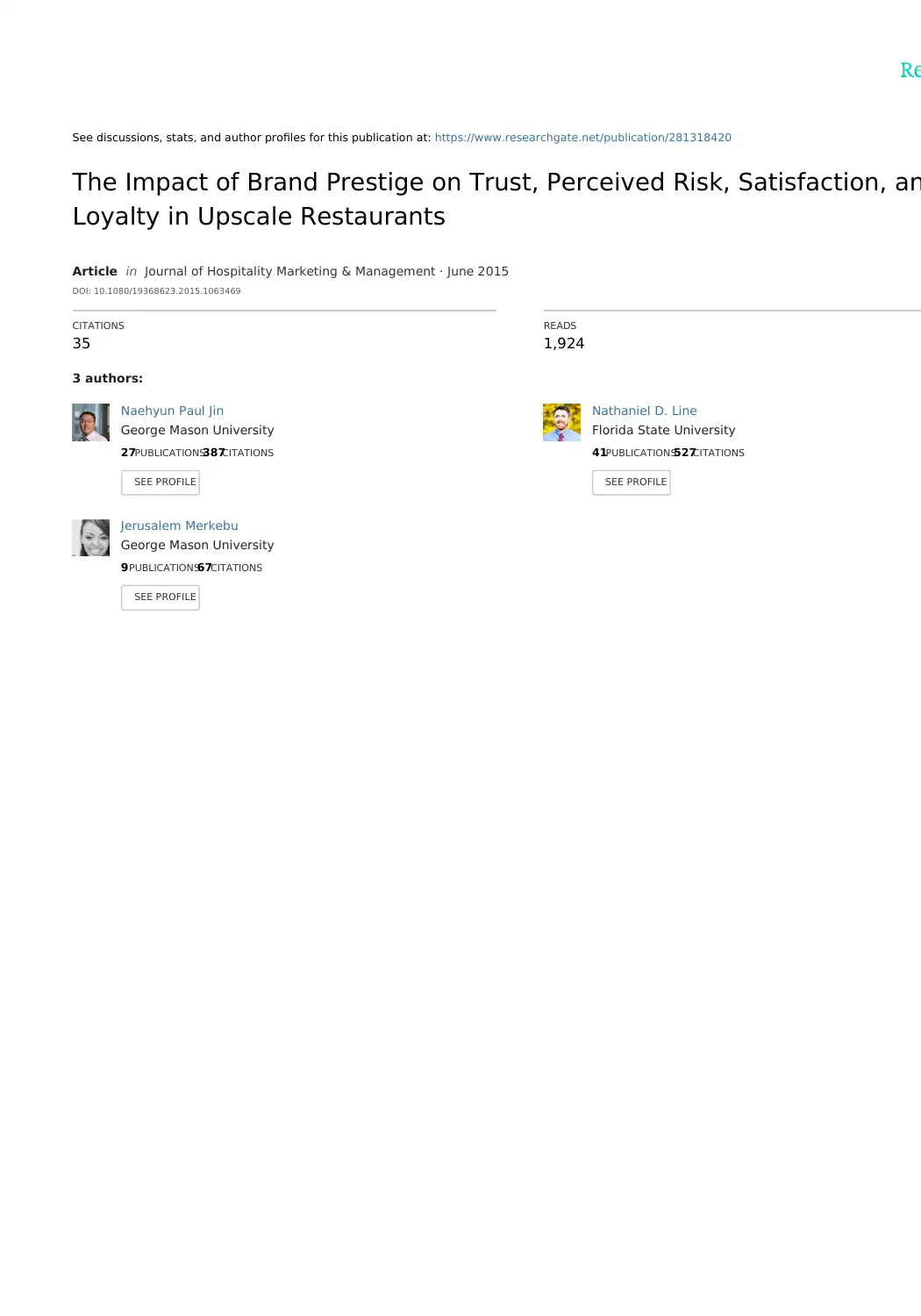
See discussions, stats, and author profiles for this publication at: https://www.researchgate.net/publication/281318420
The Impact of Brand Prestige on Trust, Perceived Risk, Satisfaction, an
Loyalty in Upscale Restaurants
Article in Journal of Hospitality Marketing & Management · June 2015
DOI: 10.1080/19368623.2015.1063469
CITATIONS
35
READS
1,924
3 authors:
Naehyun Paul Jin
George Mason University
27PUBLICATIONS387CITATIONS
SEE PROFILE
Nathaniel D. Line
Florida State University
41PUBLICATIONS527CITATIONS
SEE PROFILE
Jerusalem Merkebu
George Mason University
9 PUBLICATIONS67CITATIONS
SEE PROFILE
The Impact of Brand Prestige on Trust, Perceived Risk, Satisfaction, an
Loyalty in Upscale Restaurants
Article in Journal of Hospitality Marketing & Management · June 2015
DOI: 10.1080/19368623.2015.1063469
CITATIONS
35
READS
1,924
3 authors:
Naehyun Paul Jin
George Mason University
27PUBLICATIONS387CITATIONS
SEE PROFILE
Nathaniel D. Line
Florida State University
41PUBLICATIONS527CITATIONS
SEE PROFILE
Jerusalem Merkebu
George Mason University
9 PUBLICATIONS67CITATIONS
SEE PROFILE
Secure Best Marks with AI Grader
Need help grading? Try our AI Grader for instant feedback on your assignments.
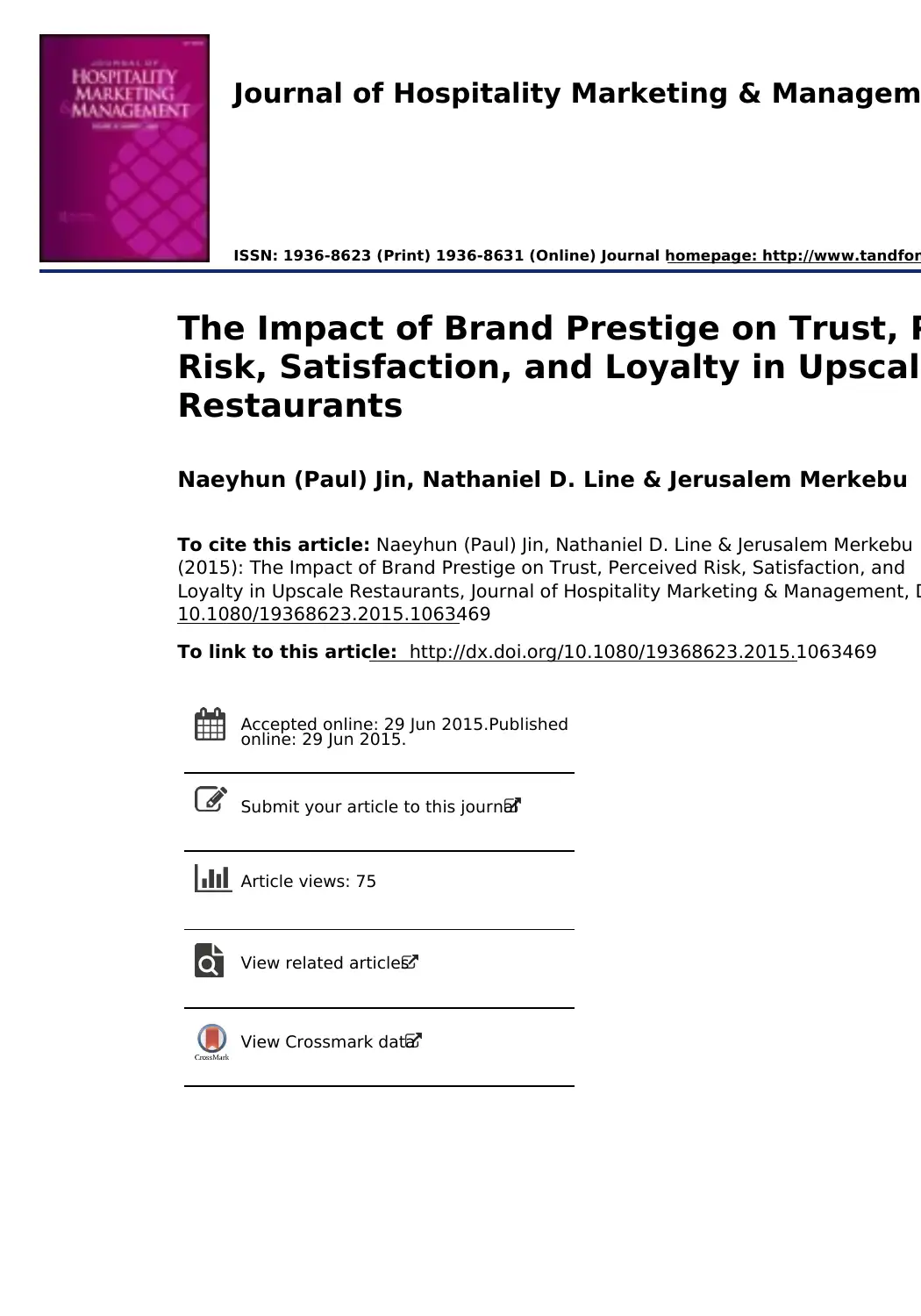
Journal of Hospitality Marketing & Managem
ISSN: 1936-8623 (Print) 1936-8631 (Online) Journal homepage: http://www.tandfon
The Impact of Brand Prestige on Trust, P
Risk, Satisfaction, and Loyalty in Upscale
Restaurants
Naeyhun (Paul) Jin, Nathaniel D. Line & Jerusalem Merkebu
To cite this article: Naeyhun (Paul) Jin, Nathaniel D. Line & Jerusalem Merkebu
(2015): The Impact of Brand Prestige on Trust, Perceived Risk, Satisfaction, and
Loyalty in Upscale Restaurants, Journal of Hospitality Marketing & Management, D
10.1080/19368623.2015.1063469
To link to this article: http://dx.doi.org/10.1080/19368623.2015.1063469
Accepted online: 29 Jun 2015.Published
online: 29 Jun 2015.
Submit your article to this journal
Article views: 75
View related articles
View Crossmark data
ISSN: 1936-8623 (Print) 1936-8631 (Online) Journal homepage: http://www.tandfon
The Impact of Brand Prestige on Trust, P
Risk, Satisfaction, and Loyalty in Upscale
Restaurants
Naeyhun (Paul) Jin, Nathaniel D. Line & Jerusalem Merkebu
To cite this article: Naeyhun (Paul) Jin, Nathaniel D. Line & Jerusalem Merkebu
(2015): The Impact of Brand Prestige on Trust, Perceived Risk, Satisfaction, and
Loyalty in Upscale Restaurants, Journal of Hospitality Marketing & Management, D
10.1080/19368623.2015.1063469
To link to this article: http://dx.doi.org/10.1080/19368623.2015.1063469
Accepted online: 29 Jun 2015.Published
online: 29 Jun 2015.
Submit your article to this journal
Article views: 75
View related articles
View Crossmark data
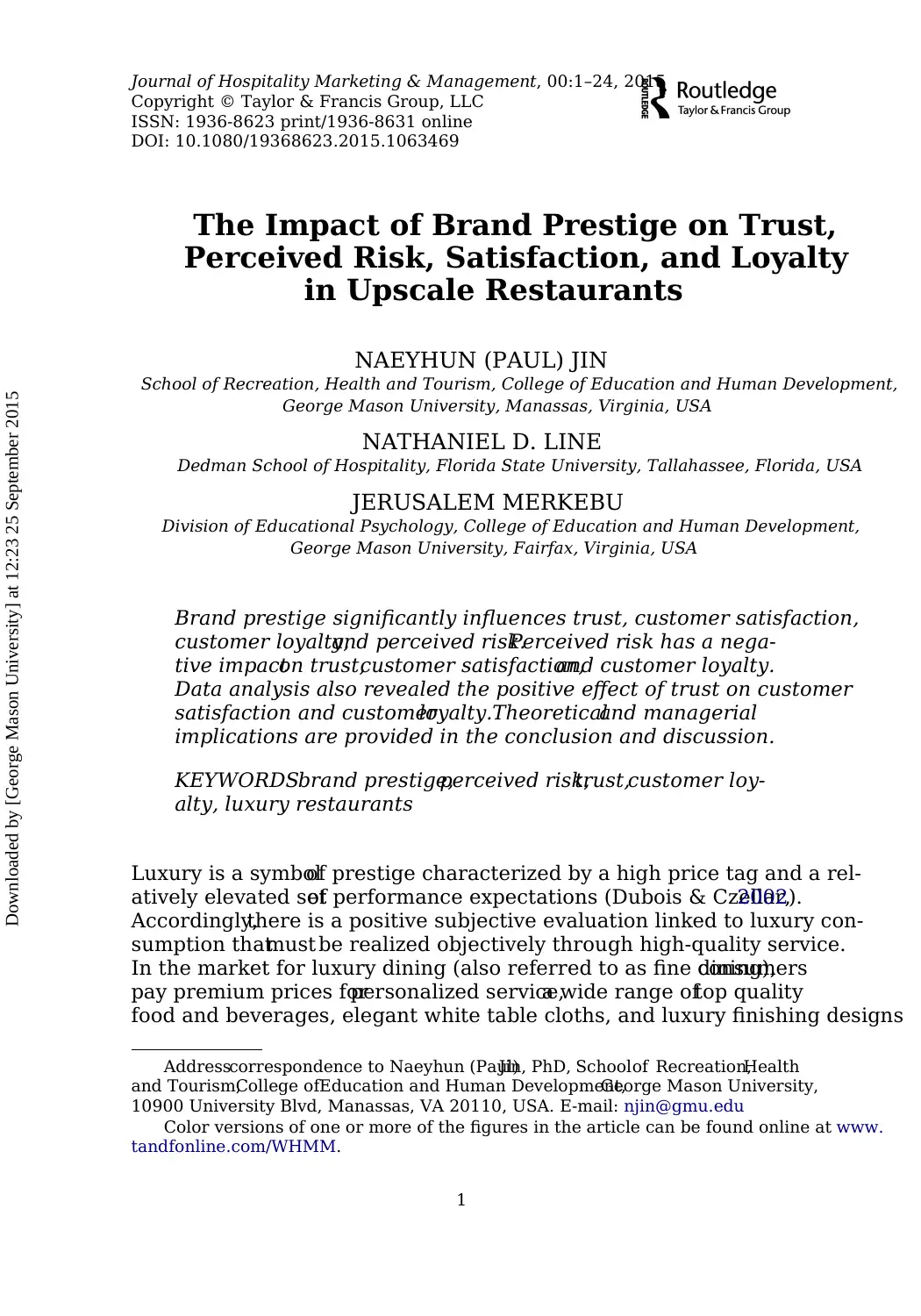
Journal of Hospitality Marketing & Management, 00:1–24, 2015
Copyright © Taylor & Francis Group, LLC
ISSN: 1936-8623 print/1936-8631 online
DOI: 10.1080/19368623.2015.1063469
The Impact of Brand Prestige on Trust,
Perceived Risk, Satisfaction, and Loyalty
in Upscale Restaurants
NAEYHUN (PAUL) JIN
School of Recreation, Health and Tourism, College of Education and Human Development,
George Mason University, Manassas, Virginia, USA
NATHANIEL D. LINE
Dedman School of Hospitality, Florida State University, Tallahassee, Florida, USA
JERUSALEM MERKEBU
Division of Educational Psychology, College of Education and Human Development,
George Mason University, Fairfax, Virginia, USA
Brand prestige significantly influences trust, customer satisfaction,
customer loyalty,and perceived risk.Perceived risk has a nega-
tive impacton trust,customer satisfaction,and customer loyalty.
Data analysis also revealed the positive effect of trust on customer
satisfaction and customerloyalty.Theoreticaland managerial
implications are provided in the conclusion and discussion.
KEYWORDSbrand prestige,perceived risk,trust,customer loy-
alty, luxury restaurants
Luxury is a symbolof prestige characterized by a high price tag and a rel-
atively elevated setof performance expectations (Dubois & Czellar,2002).
Accordingly,there is a positive subjective evaluation linked to luxury con-
sumption thatmust be realized objectively through high-quality service.
In the market for luxury dining (also referred to as fine dining),consumers
pay premium prices forpersonalized service,a wide range oftop quality
food and beverages, elegant white table cloths, and luxury finishing designs
Addresscorrespondence to Naeyhun (Paul)Jin, PhD, Schoolof Recreation,Health
and Tourism,College ofEducation and Human Development,George Mason University,
10900 University Blvd, Manassas, VA 20110, USA. E-mail: njin@gmu.edu
Color versions of one or more of the figures in the article can be found online at www.
tandfonline.com/WHMM.
1
Downloaded by [George Mason University] at 12:23 25 September 2015
Copyright © Taylor & Francis Group, LLC
ISSN: 1936-8623 print/1936-8631 online
DOI: 10.1080/19368623.2015.1063469
The Impact of Brand Prestige on Trust,
Perceived Risk, Satisfaction, and Loyalty
in Upscale Restaurants
NAEYHUN (PAUL) JIN
School of Recreation, Health and Tourism, College of Education and Human Development,
George Mason University, Manassas, Virginia, USA
NATHANIEL D. LINE
Dedman School of Hospitality, Florida State University, Tallahassee, Florida, USA
JERUSALEM MERKEBU
Division of Educational Psychology, College of Education and Human Development,
George Mason University, Fairfax, Virginia, USA
Brand prestige significantly influences trust, customer satisfaction,
customer loyalty,and perceived risk.Perceived risk has a nega-
tive impacton trust,customer satisfaction,and customer loyalty.
Data analysis also revealed the positive effect of trust on customer
satisfaction and customerloyalty.Theoreticaland managerial
implications are provided in the conclusion and discussion.
KEYWORDSbrand prestige,perceived risk,trust,customer loy-
alty, luxury restaurants
Luxury is a symbolof prestige characterized by a high price tag and a rel-
atively elevated setof performance expectations (Dubois & Czellar,2002).
Accordingly,there is a positive subjective evaluation linked to luxury con-
sumption thatmust be realized objectively through high-quality service.
In the market for luxury dining (also referred to as fine dining),consumers
pay premium prices forpersonalized service,a wide range oftop quality
food and beverages, elegant white table cloths, and luxury finishing designs
Addresscorrespondence to Naeyhun (Paul)Jin, PhD, Schoolof Recreation,Health
and Tourism,College ofEducation and Human Development,George Mason University,
10900 University Blvd, Manassas, VA 20110, USA. E-mail: njin@gmu.edu
Color versions of one or more of the figures in the article can be found online at www.
tandfonline.com/WHMM.
1
Downloaded by [George Mason University] at 12:23 25 September 2015
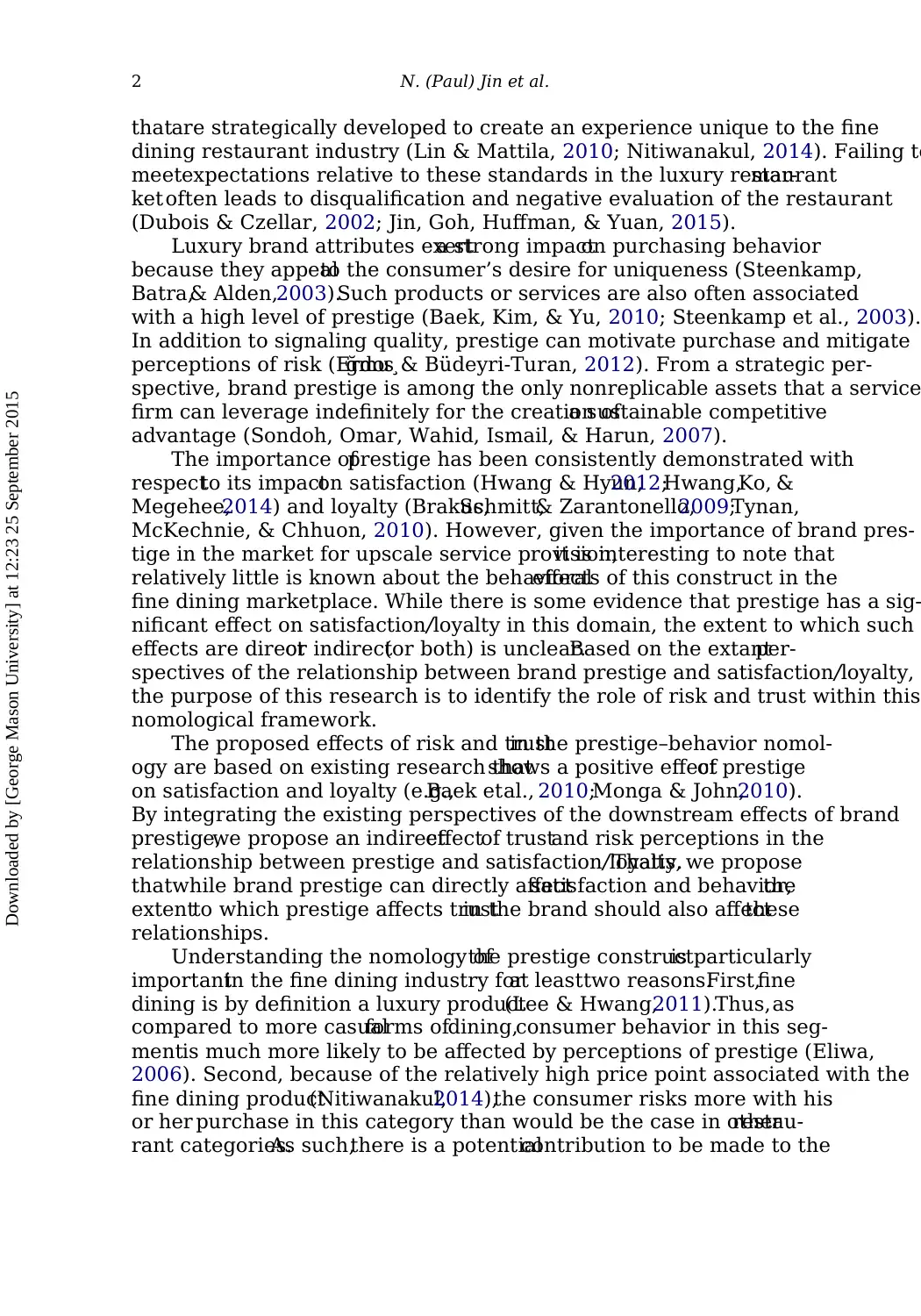
2 N. (Paul) Jin et al.
thatare strategically developed to create an experience unique to the fine
dining restaurant industry (Lin & Mattila, 2010; Nitiwanakul, 2014). Failing to
meetexpectations relative to these standards in the luxury restaurantmar-
ket often leads to disqualification and negative evaluation of the restaurant
(Dubois & Czellar, 2002; Jin, Goh, Huffman, & Yuan, 2015).
Luxury brand attributes exerta strong impacton purchasing behavior
because they appealto the consumer’s desire for uniqueness (Steenkamp,
Batra,& Alden,2003).Such products or services are also often associated
with a high level of prestige (Baek, Kim, & Yu, 2010; Steenkamp et al., 2003).
In addition to signaling quality, prestige can motivate purchase and mitigate
perceptions of risk (Erdo˘gmu¸s & Büdeyri-Turan, 2012). From a strategic per-
spective, brand prestige is among the only nonreplicable assets that a service
firm can leverage indefinitely for the creation ofa sustainable competitive
advantage (Sondoh, Omar, Wahid, Ismail, & Harun, 2007).
The importance ofprestige has been consistently demonstrated with
respectto its impacton satisfaction (Hwang & Hyun,2012;Hwang,Ko, &
Megehee,2014) and loyalty (Brakus,Schmitt,& Zarantonello,2009;Tynan,
McKechnie, & Chhuon, 2010). However, given the importance of brand pres-
tige in the market for upscale service provision,it is interesting to note that
relatively little is known about the behavioraleffects of this construct in the
fine dining marketplace. While there is some evidence that prestige has a sig-
nificant effect on satisfaction/loyalty in this domain, the extent to which such
effects are director indirect(or both) is unclear.Based on the extantper-
spectives of the relationship between brand prestige and satisfaction/loyalty,
the purpose of this research is to identify the role of risk and trust within this
nomological framework.
The proposed effects of risk and trustin the prestige–behavior nomol-
ogy are based on existing research thatshows a positive effectof prestige
on satisfaction and loyalty (e.g.,Baek etal., 2010;Monga & John,2010).
By integrating the existing perspectives of the downstream effects of brand
prestige,we propose an indirecteffectof trustand risk perceptions in the
relationship between prestige and satisfaction/loyalty.Thatis, we propose
thatwhile brand prestige can directly affectsatisfaction and behavior,the
extentto which prestige affects trustin the brand should also affectthese
relationships.
Understanding the nomology ofthe prestige constructis particularly
importantin the fine dining industry forat leasttwo reasons.First,fine
dining is by definition a luxury product(Lee & Hwang,2011).Thus,as
compared to more casualforms ofdining,consumer behavior in this seg-
mentis much more likely to be affected by perceptions of prestige (Eliwa,
2006). Second, because of the relatively high price point associated with the
fine dining product(Nitiwanakul,2014),the consumer risks more with his
or her purchase in this category than would be the case in otherrestau-
rant categories.As such,there is a potentialcontribution to be made to the
Downloaded by [George Mason University] at 12:23 25 September 2015
thatare strategically developed to create an experience unique to the fine
dining restaurant industry (Lin & Mattila, 2010; Nitiwanakul, 2014). Failing to
meetexpectations relative to these standards in the luxury restaurantmar-
ket often leads to disqualification and negative evaluation of the restaurant
(Dubois & Czellar, 2002; Jin, Goh, Huffman, & Yuan, 2015).
Luxury brand attributes exerta strong impacton purchasing behavior
because they appealto the consumer’s desire for uniqueness (Steenkamp,
Batra,& Alden,2003).Such products or services are also often associated
with a high level of prestige (Baek, Kim, & Yu, 2010; Steenkamp et al., 2003).
In addition to signaling quality, prestige can motivate purchase and mitigate
perceptions of risk (Erdo˘gmu¸s & Büdeyri-Turan, 2012). From a strategic per-
spective, brand prestige is among the only nonreplicable assets that a service
firm can leverage indefinitely for the creation ofa sustainable competitive
advantage (Sondoh, Omar, Wahid, Ismail, & Harun, 2007).
The importance ofprestige has been consistently demonstrated with
respectto its impacton satisfaction (Hwang & Hyun,2012;Hwang,Ko, &
Megehee,2014) and loyalty (Brakus,Schmitt,& Zarantonello,2009;Tynan,
McKechnie, & Chhuon, 2010). However, given the importance of brand pres-
tige in the market for upscale service provision,it is interesting to note that
relatively little is known about the behavioraleffects of this construct in the
fine dining marketplace. While there is some evidence that prestige has a sig-
nificant effect on satisfaction/loyalty in this domain, the extent to which such
effects are director indirect(or both) is unclear.Based on the extantper-
spectives of the relationship between brand prestige and satisfaction/loyalty,
the purpose of this research is to identify the role of risk and trust within this
nomological framework.
The proposed effects of risk and trustin the prestige–behavior nomol-
ogy are based on existing research thatshows a positive effectof prestige
on satisfaction and loyalty (e.g.,Baek etal., 2010;Monga & John,2010).
By integrating the existing perspectives of the downstream effects of brand
prestige,we propose an indirecteffectof trustand risk perceptions in the
relationship between prestige and satisfaction/loyalty.Thatis, we propose
thatwhile brand prestige can directly affectsatisfaction and behavior,the
extentto which prestige affects trustin the brand should also affectthese
relationships.
Understanding the nomology ofthe prestige constructis particularly
importantin the fine dining industry forat leasttwo reasons.First,fine
dining is by definition a luxury product(Lee & Hwang,2011).Thus,as
compared to more casualforms ofdining,consumer behavior in this seg-
mentis much more likely to be affected by perceptions of prestige (Eliwa,
2006). Second, because of the relatively high price point associated with the
fine dining product(Nitiwanakul,2014),the consumer risks more with his
or her purchase in this category than would be the case in otherrestau-
rant categories.As such,there is a potentialcontribution to be made to the
Downloaded by [George Mason University] at 12:23 25 September 2015
Paraphrase This Document
Need a fresh take? Get an instant paraphrase of this document with our AI Paraphraser
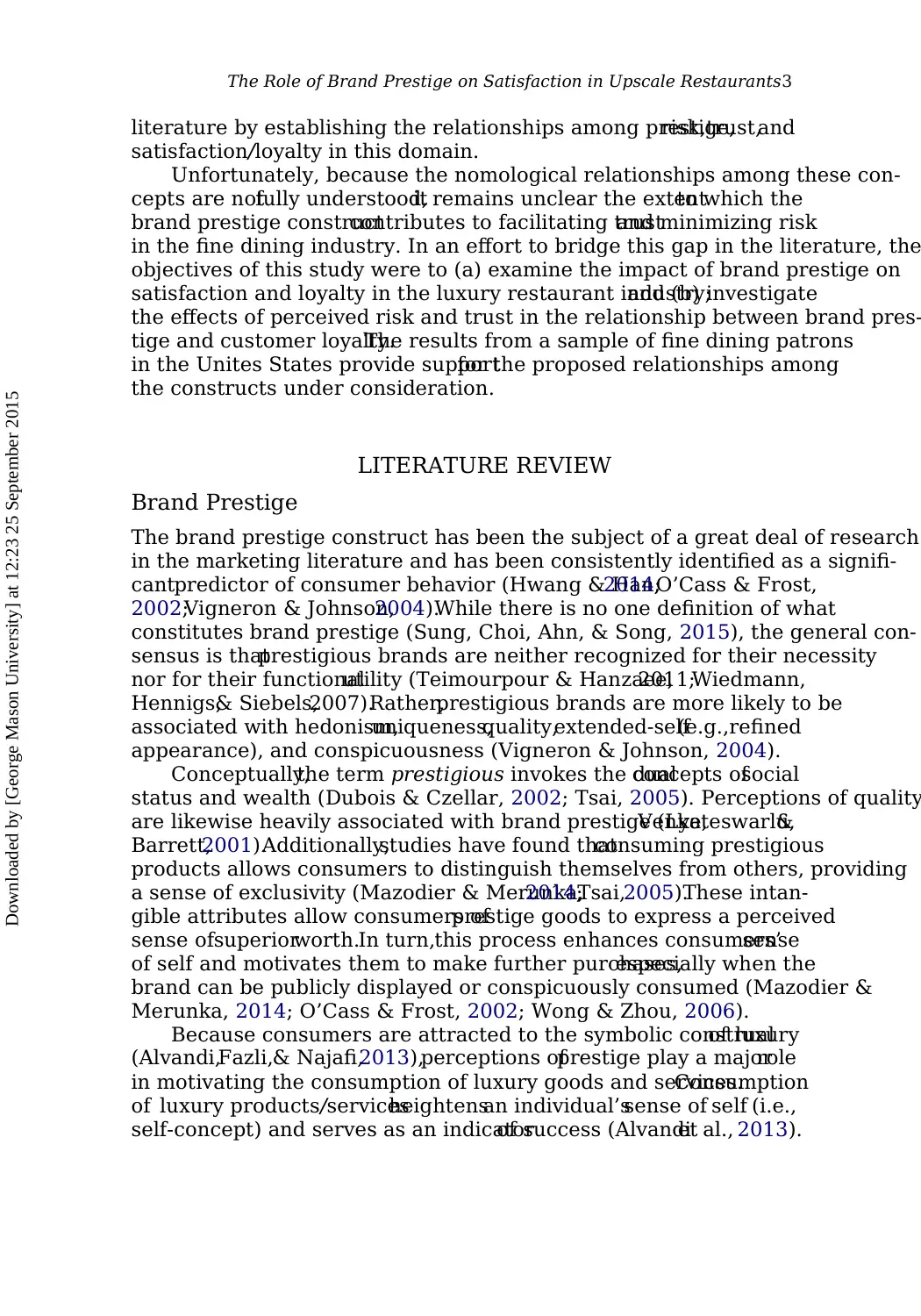
The Role of Brand Prestige on Satisfaction in Upscale Restaurants3
literature by establishing the relationships among prestige,risk,trust,and
satisfaction/loyalty in this domain.
Unfortunately, because the nomological relationships among these con-
cepts are notfully understood,it remains unclear the extentto which the
brand prestige constructcontributes to facilitating trustand minimizing risk
in the fine dining industry. In an effort to bridge this gap in the literature, the
objectives of this study were to (a) examine the impact of brand prestige on
satisfaction and loyalty in the luxury restaurant industry;and (b) investigate
the effects of perceived risk and trust in the relationship between brand pres-
tige and customer loyalty.The results from a sample of fine dining patrons
in the Unites States provide supportfor the proposed relationships among
the constructs under consideration.
LITERATURE REVIEW
Brand Prestige
The brand prestige construct has been the subject of a great deal of research
in the marketing literature and has been consistently identified as a signifi-
cantpredictor of consumer behavior (Hwang & Han,2014;O’Cass & Frost,
2002;Vigneron & Johnson,2004).While there is no one definition of what
constitutes brand prestige (Sung, Choi, Ahn, & Song, 2015), the general con-
sensus is thatprestigious brands are neither recognized for their necessity
nor for their functionalutility (Teimourpour & Hanzaee,2011;Wiedmann,
Hennigs,& Siebels,2007).Rather,prestigious brands are more likely to be
associated with hedonism,uniqueness,quality,extended-self(e.g.,refined
appearance), and conspicuousness (Vigneron & Johnson, 2004).
Conceptually,the term prestigious invokes the dualconcepts ofsocial
status and wealth (Dubois & Czellar, 2002; Tsai, 2005). Perceptions of quality
are likewise heavily associated with brand prestige (Lye,Venkateswarlu,&
Barrett,2001).Additionally,studies have found thatconsuming prestigious
products allows consumers to distinguish themselves from others, providing
a sense of exclusivity (Mazodier & Merunka,2014;Tsai,2005).These intan-
gible attributes allow consumers ofprestige goods to express a perceived
sense ofsuperiorworth.In turn,this process enhances consumers’sense
of self and motivates them to make further purchases,especially when the
brand can be publicly displayed or conspicuously consumed (Mazodier &
Merunka, 2014; O’Cass & Frost, 2002; Wong & Zhou, 2006).
Because consumers are attracted to the symbolic construalof luxury
(Alvandi,Fazli,& Najafi,2013),perceptions ofprestige play a majorrole
in motivating the consumption of luxury goods and services.Consumption
of luxury products/servicesheightensan individual’ssense of self (i.e.,
self-concept) and serves as an indicatorof success (Alvandiet al., 2013).
Downloaded by [George Mason University] at 12:23 25 September 2015
literature by establishing the relationships among prestige,risk,trust,and
satisfaction/loyalty in this domain.
Unfortunately, because the nomological relationships among these con-
cepts are notfully understood,it remains unclear the extentto which the
brand prestige constructcontributes to facilitating trustand minimizing risk
in the fine dining industry. In an effort to bridge this gap in the literature, the
objectives of this study were to (a) examine the impact of brand prestige on
satisfaction and loyalty in the luxury restaurant industry;and (b) investigate
the effects of perceived risk and trust in the relationship between brand pres-
tige and customer loyalty.The results from a sample of fine dining patrons
in the Unites States provide supportfor the proposed relationships among
the constructs under consideration.
LITERATURE REVIEW
Brand Prestige
The brand prestige construct has been the subject of a great deal of research
in the marketing literature and has been consistently identified as a signifi-
cantpredictor of consumer behavior (Hwang & Han,2014;O’Cass & Frost,
2002;Vigneron & Johnson,2004).While there is no one definition of what
constitutes brand prestige (Sung, Choi, Ahn, & Song, 2015), the general con-
sensus is thatprestigious brands are neither recognized for their necessity
nor for their functionalutility (Teimourpour & Hanzaee,2011;Wiedmann,
Hennigs,& Siebels,2007).Rather,prestigious brands are more likely to be
associated with hedonism,uniqueness,quality,extended-self(e.g.,refined
appearance), and conspicuousness (Vigneron & Johnson, 2004).
Conceptually,the term prestigious invokes the dualconcepts ofsocial
status and wealth (Dubois & Czellar, 2002; Tsai, 2005). Perceptions of quality
are likewise heavily associated with brand prestige (Lye,Venkateswarlu,&
Barrett,2001).Additionally,studies have found thatconsuming prestigious
products allows consumers to distinguish themselves from others, providing
a sense of exclusivity (Mazodier & Merunka,2014;Tsai,2005).These intan-
gible attributes allow consumers ofprestige goods to express a perceived
sense ofsuperiorworth.In turn,this process enhances consumers’sense
of self and motivates them to make further purchases,especially when the
brand can be publicly displayed or conspicuously consumed (Mazodier &
Merunka, 2014; O’Cass & Frost, 2002; Wong & Zhou, 2006).
Because consumers are attracted to the symbolic construalof luxury
(Alvandi,Fazli,& Najafi,2013),perceptions ofprestige play a majorrole
in motivating the consumption of luxury goods and services.Consumption
of luxury products/servicesheightensan individual’ssense of self (i.e.,
self-concept) and serves as an indicatorof success (Alvandiet al., 2013).
Downloaded by [George Mason University] at 12:23 25 September 2015
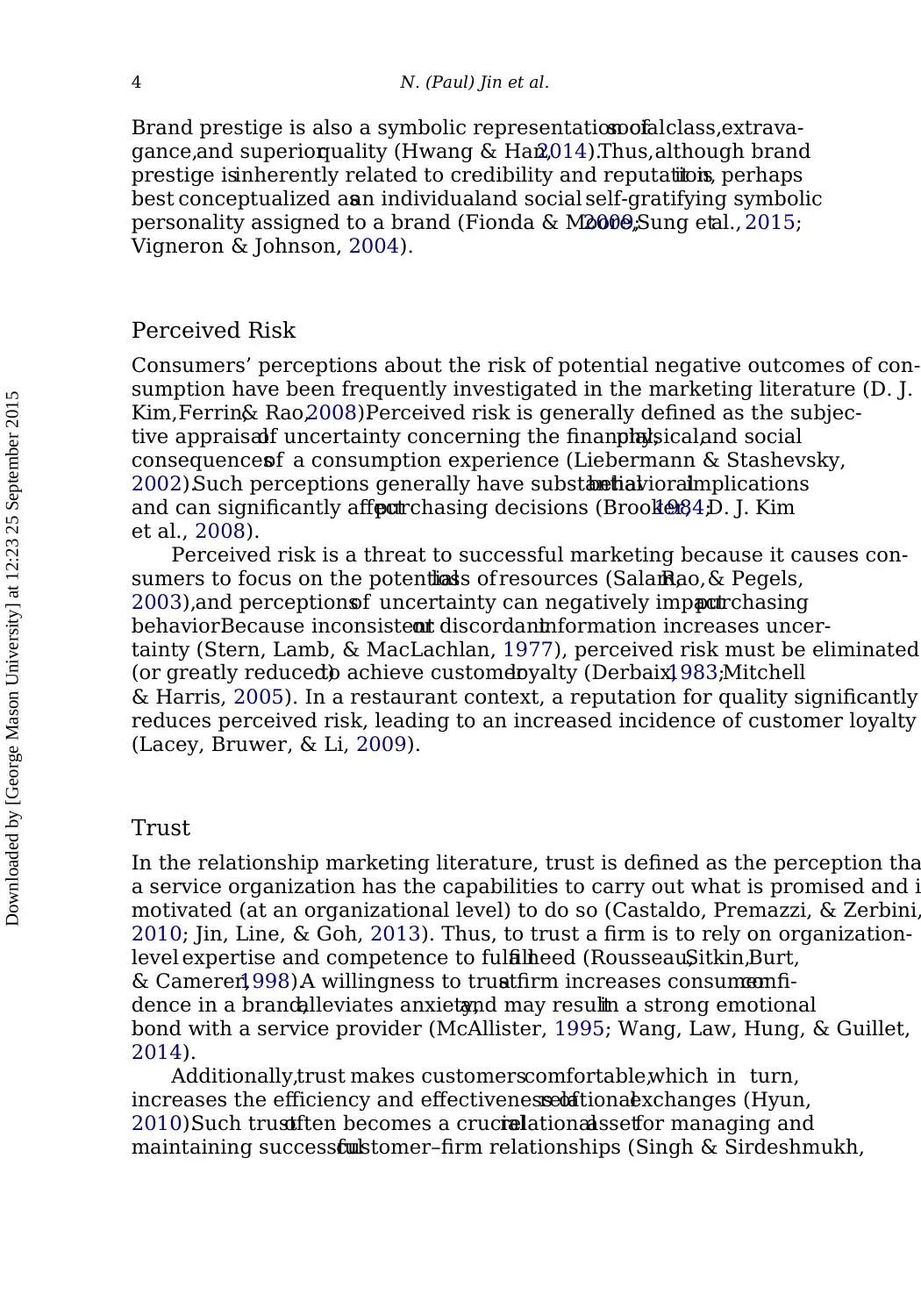
4 N. (Paul) Jin et al.
Brand prestige is also a symbolic representation ofsocialclass,extrava-
gance,and superiorquality (Hwang & Han,2014).Thus,although brand
prestige isinherently related to credibility and reputation,it is perhaps
best conceptualized asan individualand social self-gratifying symbolic
personality assigned to a brand (Fionda & Moore,2009;Sung etal., 2015;
Vigneron & Johnson, 2004).
Perceived Risk
Consumers’ perceptions about the risk of potential negative outcomes of con-
sumption have been frequently investigated in the marketing literature (D. J.
Kim,Ferrin,& Rao,2008).Perceived risk is generally defined as the subjec-
tive appraisalof uncertainty concerning the financial,physical,and social
consequencesof a consumption experience (Liebermann & Stashevsky,
2002).Such perceptions generally have substantialbehavioralimplications
and can significantly affectpurchasing decisions (Brooker,1984;D. J. Kim
et al., 2008).
Perceived risk is a threat to successful marketing because it causes con-
sumers to focus on the potentialloss of resources (Salam,Rao,& Pegels,
2003),and perceptionsof uncertainty can negatively impactpurchasing
behavior.Because inconsistentor discordantinformation increases uncer-
tainty (Stern, Lamb, & MacLachlan, 1977), perceived risk must be eliminated
(or greatly reduced)to achieve customerloyalty (Derbaix,1983;Mitchell
& Harris, 2005). In a restaurant context, a reputation for quality significantly
reduces perceived risk, leading to an increased incidence of customer loyalty
(Lacey, Bruwer, & Li, 2009).
Trust
In the relationship marketing literature, trust is defined as the perception tha
a service organization has the capabilities to carry out what is promised and i
motivated (at an organizational level) to do so (Castaldo, Premazzi, & Zerbini,
2010; Jin, Line, & Goh, 2013). Thus, to trust a firm is to rely on organization-
level expertise and competence to fulfilla need (Rousseau,Sitkin,Burt,
& Camerer,1998).A willingness to trusta firm increases consumerconfi-
dence in a brand,alleviates anxiety,and may resultin a strong emotional
bond with a service provider (McAllister, 1995; Wang, Law, Hung, & Guillet,
2014).
Additionally,trust makes customerscomfortable,which in turn,
increases the efficiency and effectiveness ofrelationalexchanges (Hyun,
2010).Such trustoften becomes a crucialrelationalassetfor managing and
maintaining successfulcustomer–firm relationships (Singh & Sirdeshmukh,
Downloaded by [George Mason University] at 12:23 25 September 2015
Brand prestige is also a symbolic representation ofsocialclass,extrava-
gance,and superiorquality (Hwang & Han,2014).Thus,although brand
prestige isinherently related to credibility and reputation,it is perhaps
best conceptualized asan individualand social self-gratifying symbolic
personality assigned to a brand (Fionda & Moore,2009;Sung etal., 2015;
Vigneron & Johnson, 2004).
Perceived Risk
Consumers’ perceptions about the risk of potential negative outcomes of con-
sumption have been frequently investigated in the marketing literature (D. J.
Kim,Ferrin,& Rao,2008).Perceived risk is generally defined as the subjec-
tive appraisalof uncertainty concerning the financial,physical,and social
consequencesof a consumption experience (Liebermann & Stashevsky,
2002).Such perceptions generally have substantialbehavioralimplications
and can significantly affectpurchasing decisions (Brooker,1984;D. J. Kim
et al., 2008).
Perceived risk is a threat to successful marketing because it causes con-
sumers to focus on the potentialloss of resources (Salam,Rao,& Pegels,
2003),and perceptionsof uncertainty can negatively impactpurchasing
behavior.Because inconsistentor discordantinformation increases uncer-
tainty (Stern, Lamb, & MacLachlan, 1977), perceived risk must be eliminated
(or greatly reduced)to achieve customerloyalty (Derbaix,1983;Mitchell
& Harris, 2005). In a restaurant context, a reputation for quality significantly
reduces perceived risk, leading to an increased incidence of customer loyalty
(Lacey, Bruwer, & Li, 2009).
Trust
In the relationship marketing literature, trust is defined as the perception tha
a service organization has the capabilities to carry out what is promised and i
motivated (at an organizational level) to do so (Castaldo, Premazzi, & Zerbini,
2010; Jin, Line, & Goh, 2013). Thus, to trust a firm is to rely on organization-
level expertise and competence to fulfilla need (Rousseau,Sitkin,Burt,
& Camerer,1998).A willingness to trusta firm increases consumerconfi-
dence in a brand,alleviates anxiety,and may resultin a strong emotional
bond with a service provider (McAllister, 1995; Wang, Law, Hung, & Guillet,
2014).
Additionally,trust makes customerscomfortable,which in turn,
increases the efficiency and effectiveness ofrelationalexchanges (Hyun,
2010).Such trustoften becomes a crucialrelationalassetfor managing and
maintaining successfulcustomer–firm relationships (Singh & Sirdeshmukh,
Downloaded by [George Mason University] at 12:23 25 September 2015
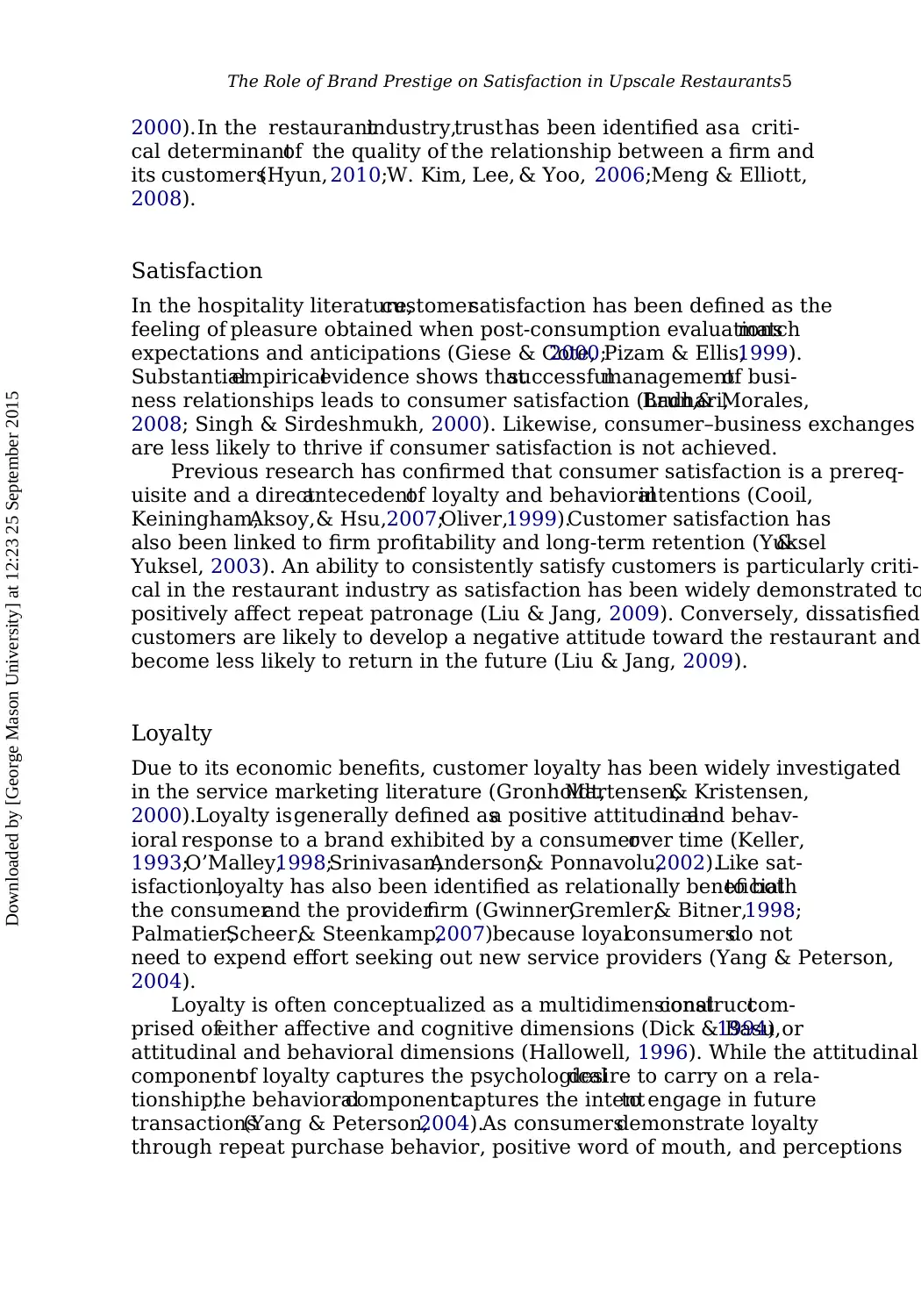
The Role of Brand Prestige on Satisfaction in Upscale Restaurants5
2000).In the restaurantindustry,trusthas been identified asa criti-
cal determinantof the quality of the relationship between a firm and
its customers(Hyun, 2010;W. Kim, Lee, & Yoo, 2006;Meng & Elliott,
2008).
Satisfaction
In the hospitality literature,customersatisfaction has been defined as the
feeling of pleasure obtained when post-consumption evaluationsmatch
expectations and anticipations (Giese & Cote,2000;Pizam & Ellis,1999).
Substantialempiricalevidence shows thatsuccessfulmanagementof busi-
ness relationships leads to consumer satisfaction (Ladhari,Brun,& Morales,
2008; Singh & Sirdeshmukh, 2000). Likewise, consumer–business exchanges
are less likely to thrive if consumer satisfaction is not achieved.
Previous research has confirmed that consumer satisfaction is a prereq-
uisite and a directantecedentof loyalty and behavioralintentions (Cooil,
Keiningham,Aksoy,& Hsu,2007;Oliver,1999).Customer satisfaction has
also been linked to firm profitability and long-term retention (Yuksel&
Yuksel, 2003). An ability to consistently satisfy customers is particularly criti-
cal in the restaurant industry as satisfaction has been widely demonstrated to
positively affect repeat patronage (Liu & Jang, 2009). Conversely, dissatisfied
customers are likely to develop a negative attitude toward the restaurant and
become less likely to return in the future (Liu & Jang, 2009).
Loyalty
Due to its economic benefits, customer loyalty has been widely investigated
in the service marketing literature (Gronholdt,Martensen,& Kristensen,
2000).Loyalty isgenerally defined asa positive attitudinaland behav-
ioral response to a brand exhibited by a consumerover time (Keller,
1993;O’Malley,1998;Srinivasan,Anderson,& Ponnavolu,2002).Like sat-
isfaction,loyalty has also been identified as relationally beneficialto both
the consumerand the providerfirm (Gwinner,Gremler,& Bitner,1998;
Palmatier,Scheer,& Steenkamp,2007)because loyalconsumersdo not
need to expend effort seeking out new service providers (Yang & Peterson,
2004).
Loyalty is often conceptualized as a multidimensionalconstructcom-
prised ofeither affective and cognitive dimensions (Dick & Basu,1994) or
attitudinal and behavioral dimensions (Hallowell, 1996). While the attitudinal
componentof loyalty captures the psychologicaldesire to carry on a rela-
tionship,the behavioralcomponentcaptures the intentto engage in future
transactions(Yang & Peterson,2004).As consumersdemonstrate loyalty
through repeat purchase behavior, positive word of mouth, and perceptions
Downloaded by [George Mason University] at 12:23 25 September 2015
2000).In the restaurantindustry,trusthas been identified asa criti-
cal determinantof the quality of the relationship between a firm and
its customers(Hyun, 2010;W. Kim, Lee, & Yoo, 2006;Meng & Elliott,
2008).
Satisfaction
In the hospitality literature,customersatisfaction has been defined as the
feeling of pleasure obtained when post-consumption evaluationsmatch
expectations and anticipations (Giese & Cote,2000;Pizam & Ellis,1999).
Substantialempiricalevidence shows thatsuccessfulmanagementof busi-
ness relationships leads to consumer satisfaction (Ladhari,Brun,& Morales,
2008; Singh & Sirdeshmukh, 2000). Likewise, consumer–business exchanges
are less likely to thrive if consumer satisfaction is not achieved.
Previous research has confirmed that consumer satisfaction is a prereq-
uisite and a directantecedentof loyalty and behavioralintentions (Cooil,
Keiningham,Aksoy,& Hsu,2007;Oliver,1999).Customer satisfaction has
also been linked to firm profitability and long-term retention (Yuksel&
Yuksel, 2003). An ability to consistently satisfy customers is particularly criti-
cal in the restaurant industry as satisfaction has been widely demonstrated to
positively affect repeat patronage (Liu & Jang, 2009). Conversely, dissatisfied
customers are likely to develop a negative attitude toward the restaurant and
become less likely to return in the future (Liu & Jang, 2009).
Loyalty
Due to its economic benefits, customer loyalty has been widely investigated
in the service marketing literature (Gronholdt,Martensen,& Kristensen,
2000).Loyalty isgenerally defined asa positive attitudinaland behav-
ioral response to a brand exhibited by a consumerover time (Keller,
1993;O’Malley,1998;Srinivasan,Anderson,& Ponnavolu,2002).Like sat-
isfaction,loyalty has also been identified as relationally beneficialto both
the consumerand the providerfirm (Gwinner,Gremler,& Bitner,1998;
Palmatier,Scheer,& Steenkamp,2007)because loyalconsumersdo not
need to expend effort seeking out new service providers (Yang & Peterson,
2004).
Loyalty is often conceptualized as a multidimensionalconstructcom-
prised ofeither affective and cognitive dimensions (Dick & Basu,1994) or
attitudinal and behavioral dimensions (Hallowell, 1996). While the attitudinal
componentof loyalty captures the psychologicaldesire to carry on a rela-
tionship,the behavioralcomponentcaptures the intentto engage in future
transactions(Yang & Peterson,2004).As consumersdemonstrate loyalty
through repeat purchase behavior, positive word of mouth, and perceptions
Downloaded by [George Mason University] at 12:23 25 September 2015
Secure Best Marks with AI Grader
Need help grading? Try our AI Grader for instant feedback on your assignments.
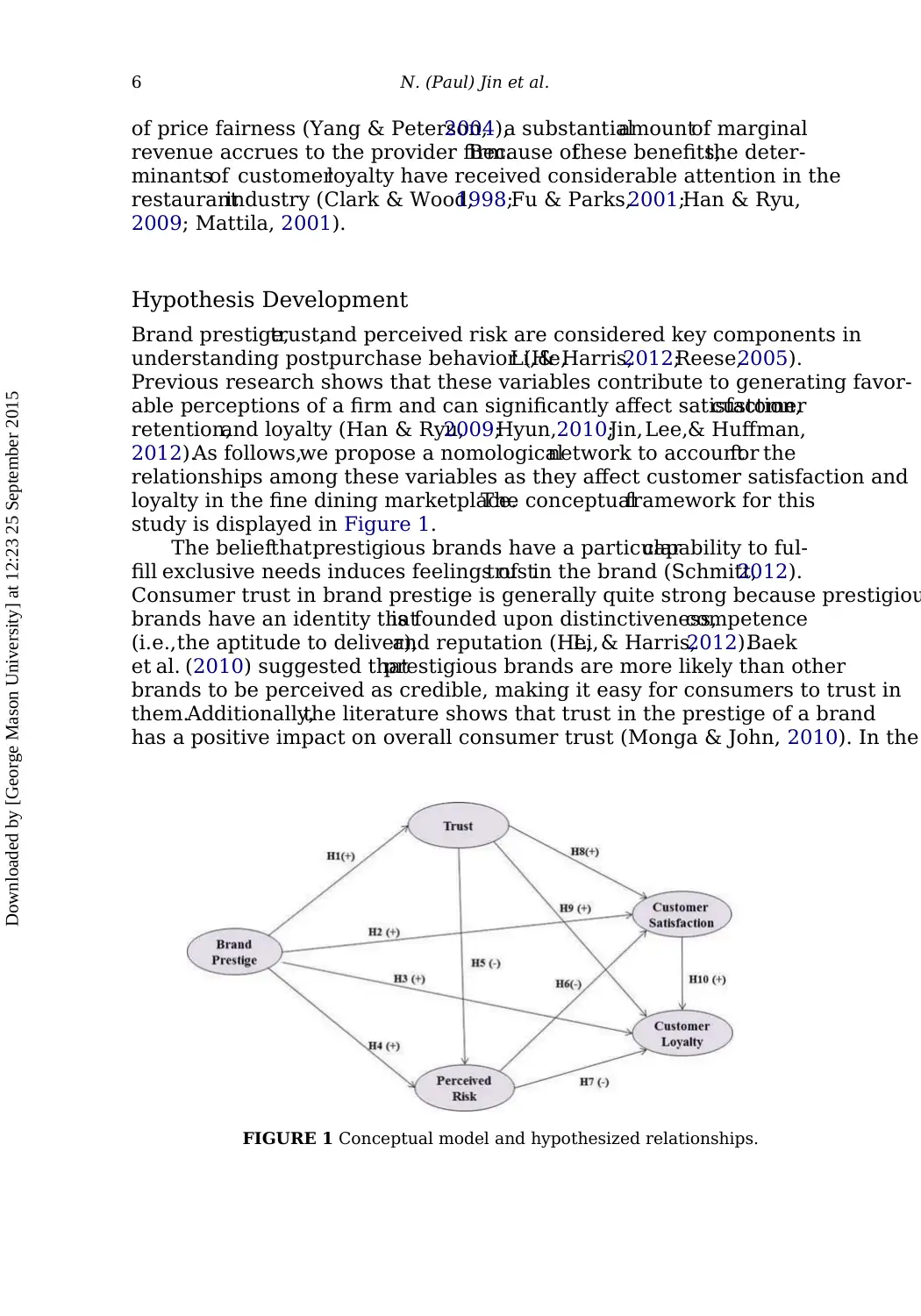
6 N. (Paul) Jin et al.
of price fairness (Yang & Peterson,2004),a substantialamountof marginal
revenue accrues to the provider firm.Because ofthese benefits,the deter-
minantsof customerloyalty have received considerable attention in the
restaurantindustry (Clark & Wood,1998;Fu & Parks,2001;Han & Ryu,
2009; Mattila, 2001).
Hypothesis Development
Brand prestige,trust,and perceived risk are considered key components in
understanding postpurchase behavior (He,Li,& Harris,2012;Reese,2005).
Previous research shows that these variables contribute to generating favor-
able perceptions of a firm and can significantly affect satisfaction,customer
retention,and loyalty (Han & Ryu,2009;Hyun,2010;Jin, Lee,& Huffman,
2012).As follows,we propose a nomologicalnetwork to accountfor the
relationships among these variables as they affect customer satisfaction and
loyalty in the fine dining marketplace.The conceptualframework for this
study is displayed in Figure 1.
The beliefthatprestigious brands have a particularcapability to ful-
fill exclusive needs induces feelings oftrustin the brand (Schmitt,2012).
Consumer trust in brand prestige is generally quite strong because prestigiou
brands have an identity thatis founded upon distinctiveness,competence
(i.e.,the aptitude to deliver),and reputation (He,Li,& Harris,2012).Baek
et al. (2010) suggested thatprestigious brands are more likely than other
brands to be perceived as credible, making it easy for consumers to trust in
them.Additionally,the literature shows that trust in the prestige of a brand
has a positive impact on overall consumer trust (Monga & John, 2010). In the
FIGURE 1 Conceptual model and hypothesized relationships.
Downloaded by [George Mason University] at 12:23 25 September 2015
of price fairness (Yang & Peterson,2004),a substantialamountof marginal
revenue accrues to the provider firm.Because ofthese benefits,the deter-
minantsof customerloyalty have received considerable attention in the
restaurantindustry (Clark & Wood,1998;Fu & Parks,2001;Han & Ryu,
2009; Mattila, 2001).
Hypothesis Development
Brand prestige,trust,and perceived risk are considered key components in
understanding postpurchase behavior (He,Li,& Harris,2012;Reese,2005).
Previous research shows that these variables contribute to generating favor-
able perceptions of a firm and can significantly affect satisfaction,customer
retention,and loyalty (Han & Ryu,2009;Hyun,2010;Jin, Lee,& Huffman,
2012).As follows,we propose a nomologicalnetwork to accountfor the
relationships among these variables as they affect customer satisfaction and
loyalty in the fine dining marketplace.The conceptualframework for this
study is displayed in Figure 1.
The beliefthatprestigious brands have a particularcapability to ful-
fill exclusive needs induces feelings oftrustin the brand (Schmitt,2012).
Consumer trust in brand prestige is generally quite strong because prestigiou
brands have an identity thatis founded upon distinctiveness,competence
(i.e.,the aptitude to deliver),and reputation (He,Li,& Harris,2012).Baek
et al. (2010) suggested thatprestigious brands are more likely than other
brands to be perceived as credible, making it easy for consumers to trust in
them.Additionally,the literature shows that trust in the prestige of a brand
has a positive impact on overall consumer trust (Monga & John, 2010). In the
FIGURE 1 Conceptual model and hypothesized relationships.
Downloaded by [George Mason University] at 12:23 25 September 2015
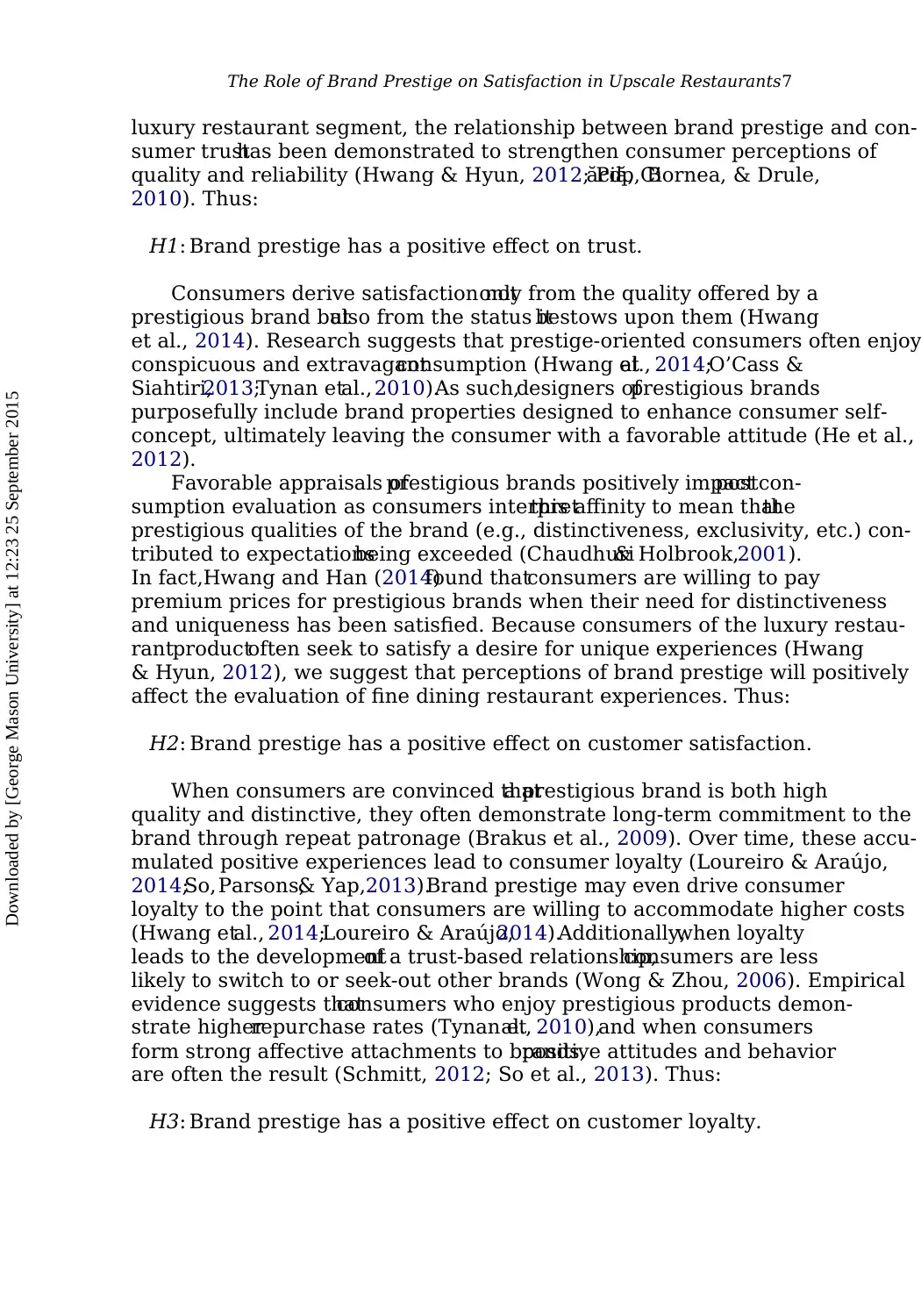
The Role of Brand Prestige on Satisfaction in Upscale Restaurants7
luxury restaurant segment, the relationship between brand prestige and con-
sumer trusthas been demonstrated to strengthen consumer perceptions of
quality and reliability (Hwang & Hyun, 2012; Pop, B˘acil˘a, Ciornea, & Drule,
2010). Thus:
H1: Brand prestige has a positive effect on trust.
Consumers derive satisfaction notonly from the quality offered by a
prestigious brand butalso from the status itbestows upon them (Hwang
et al., 2014). Research suggests that prestige-oriented consumers often enjoy
conspicuous and extravagantconsumption (Hwang etal., 2014;O’Cass &
Siahtiri,2013;Tynan etal., 2010).As such,designers ofprestigious brands
purposefully include brand properties designed to enhance consumer self-
concept, ultimately leaving the consumer with a favorable attitude (He et al.,
2012).
Favorable appraisals ofprestigious brands positively impactpostcon-
sumption evaluation as consumers interpretthis affinity to mean thatthe
prestigious qualities of the brand (e.g., distinctiveness, exclusivity, etc.) con-
tributed to expectationsbeing exceeded (Chaudhuri& Holbrook,2001).
In fact,Hwang and Han (2014)found thatconsumers are willing to pay
premium prices for prestigious brands when their need for distinctiveness
and uniqueness has been satisfied. Because consumers of the luxury restau-
rantproductoften seek to satisfy a desire for unique experiences (Hwang
& Hyun, 2012), we suggest that perceptions of brand prestige will positively
affect the evaluation of fine dining restaurant experiences. Thus:
H2: Brand prestige has a positive effect on customer satisfaction.
When consumers are convinced thata prestigious brand is both high
quality and distinctive, they often demonstrate long-term commitment to the
brand through repeat patronage (Brakus et al., 2009). Over time, these accu-
mulated positive experiences lead to consumer loyalty (Loureiro & Araújo,
2014;So, Parsons,& Yap,2013).Brand prestige may even drive consumer
loyalty to the point that consumers are willing to accommodate higher costs
(Hwang etal., 2014;Loureiro & Araújo,2014).Additionally,when loyalty
leads to the developmentof a trust-based relationship,consumers are less
likely to switch to or seek-out other brands (Wong & Zhou, 2006). Empirical
evidence suggests thatconsumers who enjoy prestigious products demon-
strate higherrepurchase rates (Tynan etal., 2010),and when consumers
form strong affective attachments to brands,positive attitudes and behavior
are often the result (Schmitt, 2012; So et al., 2013). Thus:
H3: Brand prestige has a positive effect on customer loyalty.
Downloaded by [George Mason University] at 12:23 25 September 2015
luxury restaurant segment, the relationship between brand prestige and con-
sumer trusthas been demonstrated to strengthen consumer perceptions of
quality and reliability (Hwang & Hyun, 2012; Pop, B˘acil˘a, Ciornea, & Drule,
2010). Thus:
H1: Brand prestige has a positive effect on trust.
Consumers derive satisfaction notonly from the quality offered by a
prestigious brand butalso from the status itbestows upon them (Hwang
et al., 2014). Research suggests that prestige-oriented consumers often enjoy
conspicuous and extravagantconsumption (Hwang etal., 2014;O’Cass &
Siahtiri,2013;Tynan etal., 2010).As such,designers ofprestigious brands
purposefully include brand properties designed to enhance consumer self-
concept, ultimately leaving the consumer with a favorable attitude (He et al.,
2012).
Favorable appraisals ofprestigious brands positively impactpostcon-
sumption evaluation as consumers interpretthis affinity to mean thatthe
prestigious qualities of the brand (e.g., distinctiveness, exclusivity, etc.) con-
tributed to expectationsbeing exceeded (Chaudhuri& Holbrook,2001).
In fact,Hwang and Han (2014)found thatconsumers are willing to pay
premium prices for prestigious brands when their need for distinctiveness
and uniqueness has been satisfied. Because consumers of the luxury restau-
rantproductoften seek to satisfy a desire for unique experiences (Hwang
& Hyun, 2012), we suggest that perceptions of brand prestige will positively
affect the evaluation of fine dining restaurant experiences. Thus:
H2: Brand prestige has a positive effect on customer satisfaction.
When consumers are convinced thata prestigious brand is both high
quality and distinctive, they often demonstrate long-term commitment to the
brand through repeat patronage (Brakus et al., 2009). Over time, these accu-
mulated positive experiences lead to consumer loyalty (Loureiro & Araújo,
2014;So, Parsons,& Yap,2013).Brand prestige may even drive consumer
loyalty to the point that consumers are willing to accommodate higher costs
(Hwang etal., 2014;Loureiro & Araújo,2014).Additionally,when loyalty
leads to the developmentof a trust-based relationship,consumers are less
likely to switch to or seek-out other brands (Wong & Zhou, 2006). Empirical
evidence suggests thatconsumers who enjoy prestigious products demon-
strate higherrepurchase rates (Tynan etal., 2010),and when consumers
form strong affective attachments to brands,positive attitudes and behavior
are often the result (Schmitt, 2012; So et al., 2013). Thus:
H3: Brand prestige has a positive effect on customer loyalty.
Downloaded by [George Mason University] at 12:23 25 September 2015
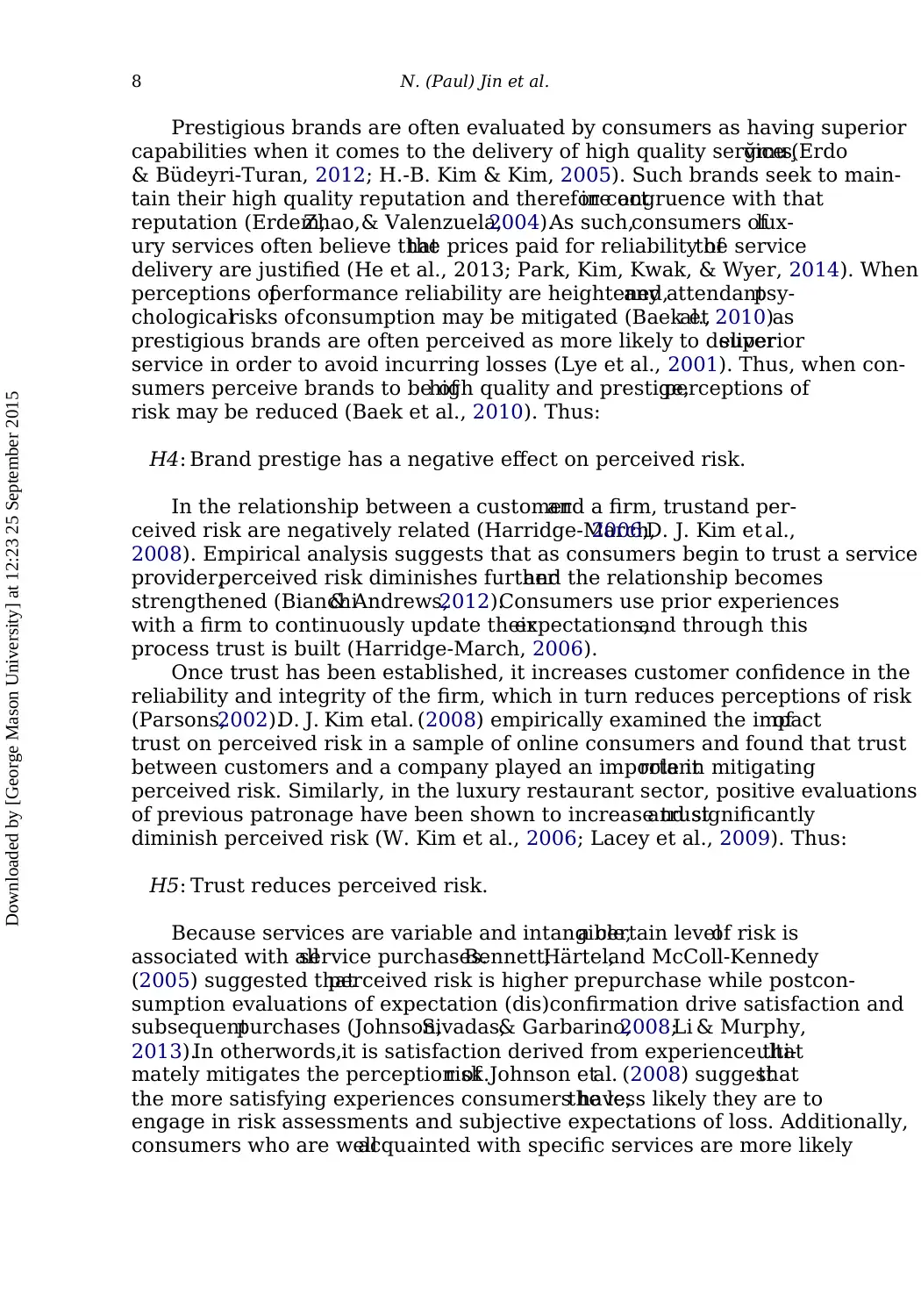
8 N. (Paul) Jin et al.
Prestigious brands are often evaluated by consumers as having superior
capabilities when it comes to the delivery of high quality service (Erdo˘gmu¸s
& Büdeyri-Turan, 2012; H.-B. Kim & Kim, 2005). Such brands seek to main-
tain their high quality reputation and therefore actin congruence with that
reputation (Erdem,Zhao,& Valenzuela,2004).As such,consumers oflux-
ury services often believe thatthe prices paid for reliability ofthe service
delivery are justified (He et al., 2013; Park, Kim, Kwak, & Wyer, 2014). When
perceptions ofperformance reliability are heightened,any attendantpsy-
chologicalrisks ofconsumption may be mitigated (Baek etal., 2010)as
prestigious brands are often perceived as more likely to deliversuperior
service in order to avoid incurring losses (Lye et al., 2001). Thus, when con-
sumers perceive brands to be ofhigh quality and prestige,perceptions of
risk may be reduced (Baek et al., 2010). Thus:
H4: Brand prestige has a negative effect on perceived risk.
In the relationship between a customerand a firm, trustand per-
ceived risk are negatively related (Harridge-March,2006;D. J. Kim et al.,
2008). Empirical analysis suggests that as consumers begin to trust a service
provider,perceived risk diminishes furtherand the relationship becomes
strengthened (Bianchi& Andrews,2012).Consumers use prior experiences
with a firm to continuously update theirexpectations,and through this
process trust is built (Harridge-March, 2006).
Once trust has been established, it increases customer confidence in the
reliability and integrity of the firm, which in turn reduces perceptions of risk
(Parsons,2002).D. J. Kim etal. (2008) empirically examined the impactof
trust on perceived risk in a sample of online consumers and found that trust
between customers and a company played an importantrole in mitigating
perceived risk. Similarly, in the luxury restaurant sector, positive evaluations
of previous patronage have been shown to increase trustand significantly
diminish perceived risk (W. Kim et al., 2006; Lacey et al., 2009). Thus:
H5: Trust reduces perceived risk.
Because services are variable and intangible,a certain levelof risk is
associated with allservice purchases.Bennett,Härtel,and McColl-Kennedy
(2005) suggested thatperceived risk is higher prepurchase while postcon-
sumption evaluations of expectation (dis)confirmation drive satisfaction and
subsequentpurchases (Johnson,Sivadas,& Garbarino,2008;Li & Murphy,
2013).In otherwords,it is satisfaction derived from experience thatulti-
mately mitigates the perception ofrisk.Johnson etal. (2008) suggestthat
the more satisfying experiences consumers have,the less likely they are to
engage in risk assessments and subjective expectations of loss. Additionally,
consumers who are wellacquainted with specific services are more likely
Downloaded by [George Mason University] at 12:23 25 September 2015
Prestigious brands are often evaluated by consumers as having superior
capabilities when it comes to the delivery of high quality service (Erdo˘gmu¸s
& Büdeyri-Turan, 2012; H.-B. Kim & Kim, 2005). Such brands seek to main-
tain their high quality reputation and therefore actin congruence with that
reputation (Erdem,Zhao,& Valenzuela,2004).As such,consumers oflux-
ury services often believe thatthe prices paid for reliability ofthe service
delivery are justified (He et al., 2013; Park, Kim, Kwak, & Wyer, 2014). When
perceptions ofperformance reliability are heightened,any attendantpsy-
chologicalrisks ofconsumption may be mitigated (Baek etal., 2010)as
prestigious brands are often perceived as more likely to deliversuperior
service in order to avoid incurring losses (Lye et al., 2001). Thus, when con-
sumers perceive brands to be ofhigh quality and prestige,perceptions of
risk may be reduced (Baek et al., 2010). Thus:
H4: Brand prestige has a negative effect on perceived risk.
In the relationship between a customerand a firm, trustand per-
ceived risk are negatively related (Harridge-March,2006;D. J. Kim et al.,
2008). Empirical analysis suggests that as consumers begin to trust a service
provider,perceived risk diminishes furtherand the relationship becomes
strengthened (Bianchi& Andrews,2012).Consumers use prior experiences
with a firm to continuously update theirexpectations,and through this
process trust is built (Harridge-March, 2006).
Once trust has been established, it increases customer confidence in the
reliability and integrity of the firm, which in turn reduces perceptions of risk
(Parsons,2002).D. J. Kim etal. (2008) empirically examined the impactof
trust on perceived risk in a sample of online consumers and found that trust
between customers and a company played an importantrole in mitigating
perceived risk. Similarly, in the luxury restaurant sector, positive evaluations
of previous patronage have been shown to increase trustand significantly
diminish perceived risk (W. Kim et al., 2006; Lacey et al., 2009). Thus:
H5: Trust reduces perceived risk.
Because services are variable and intangible,a certain levelof risk is
associated with allservice purchases.Bennett,Härtel,and McColl-Kennedy
(2005) suggested thatperceived risk is higher prepurchase while postcon-
sumption evaluations of expectation (dis)confirmation drive satisfaction and
subsequentpurchases (Johnson,Sivadas,& Garbarino,2008;Li & Murphy,
2013).In otherwords,it is satisfaction derived from experience thatulti-
mately mitigates the perception ofrisk.Johnson etal. (2008) suggestthat
the more satisfying experiences consumers have,the less likely they are to
engage in risk assessments and subjective expectations of loss. Additionally,
consumers who are wellacquainted with specific services are more likely
Downloaded by [George Mason University] at 12:23 25 September 2015
Paraphrase This Document
Need a fresh take? Get an instant paraphrase of this document with our AI Paraphraser
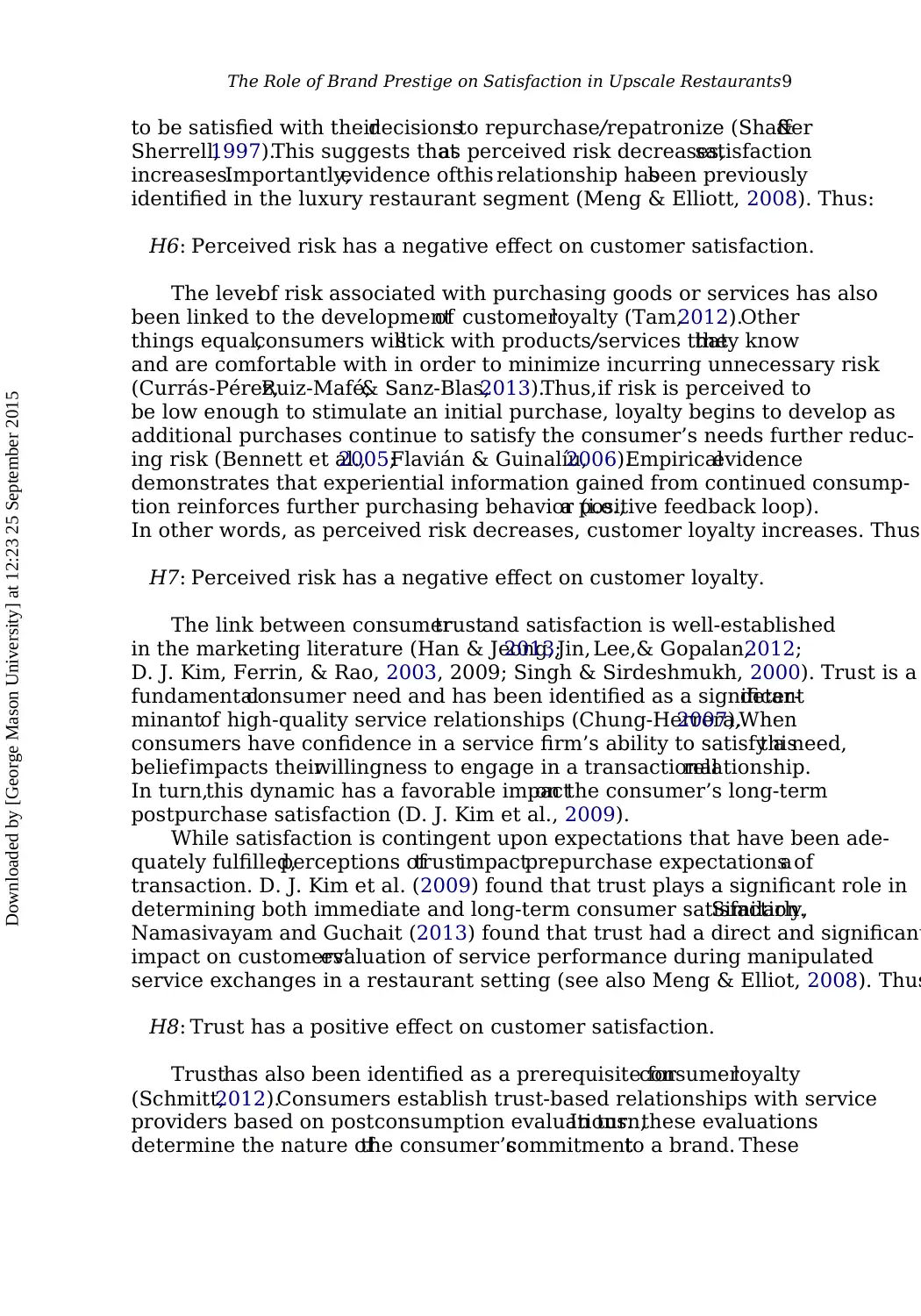
The Role of Brand Prestige on Satisfaction in Upscale Restaurants9
to be satisfied with theirdecisionsto repurchase/repatronize (Shaffer&
Sherrell,1997).This suggests thatas perceived risk decreases,satisfaction
increases.Importantly,evidence ofthis relationship hasbeen previously
identified in the luxury restaurant segment (Meng & Elliott, 2008). Thus:
H6: Perceived risk has a negative effect on customer satisfaction.
The levelof risk associated with purchasing goods or services has also
been linked to the developmentof customerloyalty (Tam,2012).Other
things equal,consumers willstick with products/services thatthey know
and are comfortable with in order to minimize incurring unnecessary risk
(Currás-Pérez,Ruiz-Mafé,& Sanz-Blas,2013).Thus,if risk is perceived to
be low enough to stimulate an initial purchase, loyalty begins to develop as
additional purchases continue to satisfy the consumer’s needs further reduc-
ing risk (Bennett et al.,2005;Flavián & Guinalíu,2006).Empiricalevidence
demonstrates that experiential information gained from continued consump-
tion reinforces further purchasing behavior (i.e.,a positive feedback loop).
In other words, as perceived risk decreases, customer loyalty increases. Thus:
H7: Perceived risk has a negative effect on customer loyalty.
The link between consumertrustand satisfaction is well-established
in the marketing literature (Han & Jeong,2013;Jin, Lee,& Gopalan,2012;
D. J. Kim, Ferrin, & Rao, 2003, 2009; Singh & Sirdeshmukh, 2000). Trust is a
fundamentalconsumer need and has been identified as a significantdeter-
minantof high-quality service relationships (Chung-Herrera,2007).When
consumers have confidence in a service firm’s ability to satisfy a need,this
beliefimpacts theirwillingness to engage in a transactionalrelationship.
In turn,this dynamic has a favorable impacton the consumer’s long-term
postpurchase satisfaction (D. J. Kim et al., 2009).
While satisfaction is contingent upon expectations that have been ade-
quately fulfilled,perceptions oftrustimpactprepurchase expectations ofa
transaction. D. J. Kim et al. (2009) found that trust plays a significant role in
determining both immediate and long-term consumer satisfaction.Similarly,
Namasivayam and Guchait (2013) found that trust had a direct and significant
impact on customers’evaluation of service performance during manipulated
service exchanges in a restaurant setting (see also Meng & Elliot, 2008). Thus
H8: Trust has a positive effect on customer satisfaction.
Trusthas also been identified as a prerequisite forconsumerloyalty
(Schmitt,2012).Consumers establish trust-based relationships with service
providers based on postconsumption evaluations.In turn,these evaluations
determine the nature ofthe consumer’scommitmentto a brand. These
Downloaded by [George Mason University] at 12:23 25 September 2015
to be satisfied with theirdecisionsto repurchase/repatronize (Shaffer&
Sherrell,1997).This suggests thatas perceived risk decreases,satisfaction
increases.Importantly,evidence ofthis relationship hasbeen previously
identified in the luxury restaurant segment (Meng & Elliott, 2008). Thus:
H6: Perceived risk has a negative effect on customer satisfaction.
The levelof risk associated with purchasing goods or services has also
been linked to the developmentof customerloyalty (Tam,2012).Other
things equal,consumers willstick with products/services thatthey know
and are comfortable with in order to minimize incurring unnecessary risk
(Currás-Pérez,Ruiz-Mafé,& Sanz-Blas,2013).Thus,if risk is perceived to
be low enough to stimulate an initial purchase, loyalty begins to develop as
additional purchases continue to satisfy the consumer’s needs further reduc-
ing risk (Bennett et al.,2005;Flavián & Guinalíu,2006).Empiricalevidence
demonstrates that experiential information gained from continued consump-
tion reinforces further purchasing behavior (i.e.,a positive feedback loop).
In other words, as perceived risk decreases, customer loyalty increases. Thus:
H7: Perceived risk has a negative effect on customer loyalty.
The link between consumertrustand satisfaction is well-established
in the marketing literature (Han & Jeong,2013;Jin, Lee,& Gopalan,2012;
D. J. Kim, Ferrin, & Rao, 2003, 2009; Singh & Sirdeshmukh, 2000). Trust is a
fundamentalconsumer need and has been identified as a significantdeter-
minantof high-quality service relationships (Chung-Herrera,2007).When
consumers have confidence in a service firm’s ability to satisfy a need,this
beliefimpacts theirwillingness to engage in a transactionalrelationship.
In turn,this dynamic has a favorable impacton the consumer’s long-term
postpurchase satisfaction (D. J. Kim et al., 2009).
While satisfaction is contingent upon expectations that have been ade-
quately fulfilled,perceptions oftrustimpactprepurchase expectations ofa
transaction. D. J. Kim et al. (2009) found that trust plays a significant role in
determining both immediate and long-term consumer satisfaction.Similarly,
Namasivayam and Guchait (2013) found that trust had a direct and significant
impact on customers’evaluation of service performance during manipulated
service exchanges in a restaurant setting (see also Meng & Elliot, 2008). Thus
H8: Trust has a positive effect on customer satisfaction.
Trusthas also been identified as a prerequisite forconsumerloyalty
(Schmitt,2012).Consumers establish trust-based relationships with service
providers based on postconsumption evaluations.In turn,these evaluations
determine the nature ofthe consumer’scommitmentto a brand. These
Downloaded by [George Mason University] at 12:23 25 September 2015
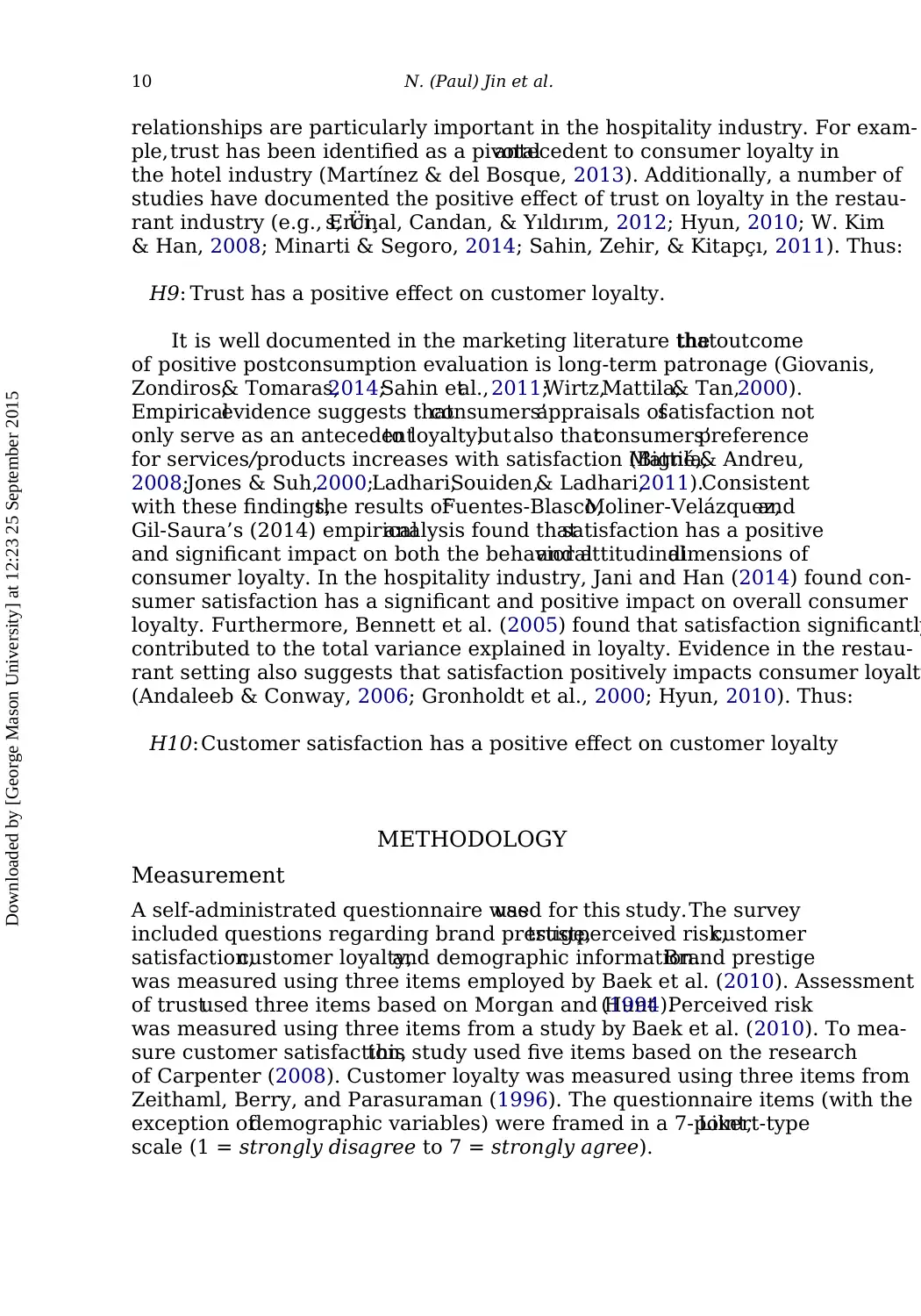
10 N. (Paul) Jin et al.
relationships are particularly important in the hospitality industry. For exam-
ple,trust has been identified as a pivotalantecedent to consumer loyalty in
the hotel industry (Martínez & del Bosque, 2013). Additionally, a number of
studies have documented the positive effect of trust on loyalty in the restau-
rant industry (e.g., Erci¸s, Ünal, Candan, & Yıldırım, 2012; Hyun, 2010; W. Kim
& Han, 2008; Minarti & Segoro, 2014; Sahin, Zehir, & Kitapçı, 2011). Thus:
H9: Trust has a positive effect on customer loyalty.
It is well documented in the marketing literature thatthe outcome
of positive postconsumption evaluation is long-term patronage (Giovanis,
Zondiros,& Tomaras,2014;Sahin etal., 2011;Wirtz,Mattila,& Tan,2000).
Empiricalevidence suggests thatconsumers’appraisals ofsatisfaction not
only serve as an antecedentto loyalty,but also thatconsumers’preference
for services/products increases with satisfaction (Bigné,Mattila,& Andreu,
2008;Jones & Suh,2000;Ladhari,Souiden,& Ladhari,2011).Consistent
with these findings,the results ofFuentes-Blasco,Moliner-Velázquez,and
Gil-Saura’s (2014) empiricalanalysis found thatsatisfaction has a positive
and significant impact on both the behavioraland attitudinaldimensions of
consumer loyalty. In the hospitality industry, Jani and Han (2014) found con-
sumer satisfaction has a significant and positive impact on overall consumer
loyalty. Furthermore, Bennett et al. (2005) found that satisfaction significantly
contributed to the total variance explained in loyalty. Evidence in the restau-
rant setting also suggests that satisfaction positively impacts consumer loyalty
(Andaleeb & Conway, 2006; Gronholdt et al., 2000; Hyun, 2010). Thus:
H10:Customer satisfaction has a positive effect on customer loyalty
METHODOLOGY
Measurement
A self-administrated questionnaire wasused for this study.The survey
included questions regarding brand prestige,trust,perceived risk,customer
satisfaction,customer loyalty,and demographic information.Brand prestige
was measured using three items employed by Baek et al. (2010). Assessment
of trustused three items based on Morgan and Hunt(1994).Perceived risk
was measured using three items from a study by Baek et al. (2010). To mea-
sure customer satisfaction,this study used five items based on the research
of Carpenter (2008). Customer loyalty was measured using three items from
Zeithaml, Berry, and Parasuraman (1996). The questionnaire items (with the
exception ofdemographic variables) were framed in a 7-point,Likert-type
scale (1 = strongly disagree to 7 = strongly agree).
Downloaded by [George Mason University] at 12:23 25 September 2015
relationships are particularly important in the hospitality industry. For exam-
ple,trust has been identified as a pivotalantecedent to consumer loyalty in
the hotel industry (Martínez & del Bosque, 2013). Additionally, a number of
studies have documented the positive effect of trust on loyalty in the restau-
rant industry (e.g., Erci¸s, Ünal, Candan, & Yıldırım, 2012; Hyun, 2010; W. Kim
& Han, 2008; Minarti & Segoro, 2014; Sahin, Zehir, & Kitapçı, 2011). Thus:
H9: Trust has a positive effect on customer loyalty.
It is well documented in the marketing literature thatthe outcome
of positive postconsumption evaluation is long-term patronage (Giovanis,
Zondiros,& Tomaras,2014;Sahin etal., 2011;Wirtz,Mattila,& Tan,2000).
Empiricalevidence suggests thatconsumers’appraisals ofsatisfaction not
only serve as an antecedentto loyalty,but also thatconsumers’preference
for services/products increases with satisfaction (Bigné,Mattila,& Andreu,
2008;Jones & Suh,2000;Ladhari,Souiden,& Ladhari,2011).Consistent
with these findings,the results ofFuentes-Blasco,Moliner-Velázquez,and
Gil-Saura’s (2014) empiricalanalysis found thatsatisfaction has a positive
and significant impact on both the behavioraland attitudinaldimensions of
consumer loyalty. In the hospitality industry, Jani and Han (2014) found con-
sumer satisfaction has a significant and positive impact on overall consumer
loyalty. Furthermore, Bennett et al. (2005) found that satisfaction significantly
contributed to the total variance explained in loyalty. Evidence in the restau-
rant setting also suggests that satisfaction positively impacts consumer loyalty
(Andaleeb & Conway, 2006; Gronholdt et al., 2000; Hyun, 2010). Thus:
H10:Customer satisfaction has a positive effect on customer loyalty
METHODOLOGY
Measurement
A self-administrated questionnaire wasused for this study.The survey
included questions regarding brand prestige,trust,perceived risk,customer
satisfaction,customer loyalty,and demographic information.Brand prestige
was measured using three items employed by Baek et al. (2010). Assessment
of trustused three items based on Morgan and Hunt(1994).Perceived risk
was measured using three items from a study by Baek et al. (2010). To mea-
sure customer satisfaction,this study used five items based on the research
of Carpenter (2008). Customer loyalty was measured using three items from
Zeithaml, Berry, and Parasuraman (1996). The questionnaire items (with the
exception ofdemographic variables) were framed in a 7-point,Likert-type
scale (1 = strongly disagree to 7 = strongly agree).
Downloaded by [George Mason University] at 12:23 25 September 2015
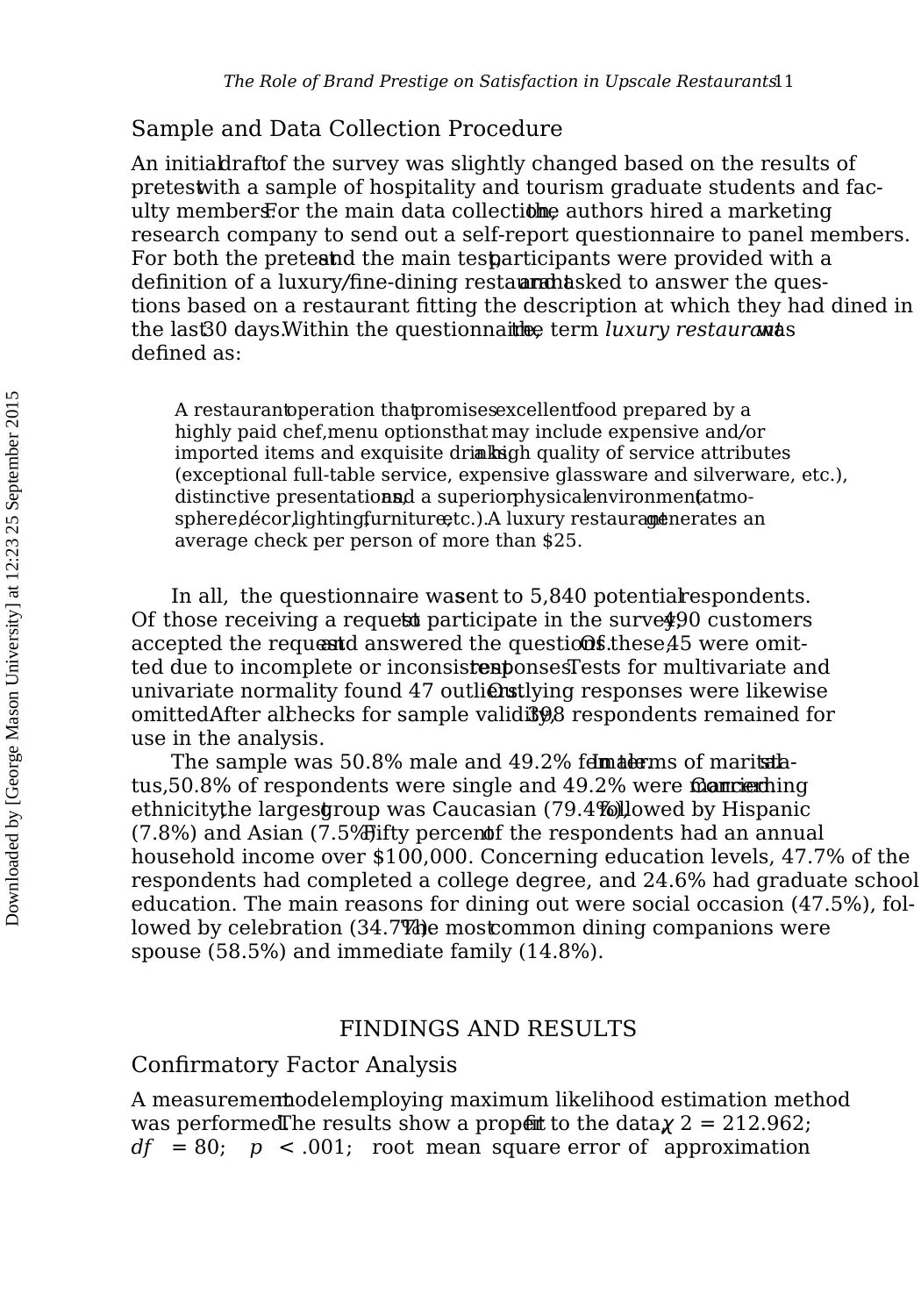
The Role of Brand Prestige on Satisfaction in Upscale Restaurants11
Sample and Data Collection Procedure
An initialdraftof the survey was slightly changed based on the results of
pretestwith a sample of hospitality and tourism graduate students and fac-
ulty members.For the main data collection,the authors hired a marketing
research company to send out a self-report questionnaire to panel members.
For both the pretestand the main test,participants were provided with a
definition of a luxury/fine-dining restaurantand asked to answer the ques-
tions based on a restaurant fitting the description at which they had dined in
the last30 days.Within the questionnaire,the term luxury restaurantwas
defined as:
A restaurantoperation thatpromisesexcellentfood prepared by a
highly paid chef,menu optionsthat may include expensive and/or
imported items and exquisite drinks,a high quality of service attributes
(exceptional full-table service, expensive glassware and silverware, etc.),
distinctive presentations,and a superiorphysicalenvironment(atmo-
sphere,décor,lighting,furniture,etc.).A luxury restaurantgenerates an
average check per person of more than $25.
In all, the questionnaire wassent to 5,840 potentialrespondents.
Of those receiving a requestto participate in the survey,490 customers
accepted the requestand answered the questions.Of these,45 were omit-
ted due to incomplete or inconsistentresponses.Tests for multivariate and
univariate normality found 47 outliers.Outlying responses were likewise
omitted.After allchecks for sample validity,398 respondents remained for
use in the analysis.
The sample was 50.8% male and 49.2% female.In terms of maritalsta-
tus,50.8% of respondents were single and 49.2% were married.Concerning
ethnicity,the largestgroup was Caucasian (79.4%),followed by Hispanic
(7.8%) and Asian (7.5%).Fifty percentof the respondents had an annual
household income over $100,000. Concerning education levels, 47.7% of the
respondents had completed a college degree, and 24.6% had graduate school
education. The main reasons for dining out were social occasion (47.5%), fol-
lowed by celebration (34.7%).The mostcommon dining companions were
spouse (58.5%) and immediate family (14.8%).
FINDINGS AND RESULTS
Confirmatory Factor Analysis
A measurementmodelemploying maximum likelihood estimation method
was performed.The results show a properfit to the data,χ 2 = 212.962;
df = 80; p < .001; root mean square error of approximation
Downloaded by [George Mason University] at 12:23 25 September 2015
Sample and Data Collection Procedure
An initialdraftof the survey was slightly changed based on the results of
pretestwith a sample of hospitality and tourism graduate students and fac-
ulty members.For the main data collection,the authors hired a marketing
research company to send out a self-report questionnaire to panel members.
For both the pretestand the main test,participants were provided with a
definition of a luxury/fine-dining restaurantand asked to answer the ques-
tions based on a restaurant fitting the description at which they had dined in
the last30 days.Within the questionnaire,the term luxury restaurantwas
defined as:
A restaurantoperation thatpromisesexcellentfood prepared by a
highly paid chef,menu optionsthat may include expensive and/or
imported items and exquisite drinks,a high quality of service attributes
(exceptional full-table service, expensive glassware and silverware, etc.),
distinctive presentations,and a superiorphysicalenvironment(atmo-
sphere,décor,lighting,furniture,etc.).A luxury restaurantgenerates an
average check per person of more than $25.
In all, the questionnaire wassent to 5,840 potentialrespondents.
Of those receiving a requestto participate in the survey,490 customers
accepted the requestand answered the questions.Of these,45 were omit-
ted due to incomplete or inconsistentresponses.Tests for multivariate and
univariate normality found 47 outliers.Outlying responses were likewise
omitted.After allchecks for sample validity,398 respondents remained for
use in the analysis.
The sample was 50.8% male and 49.2% female.In terms of maritalsta-
tus,50.8% of respondents were single and 49.2% were married.Concerning
ethnicity,the largestgroup was Caucasian (79.4%),followed by Hispanic
(7.8%) and Asian (7.5%).Fifty percentof the respondents had an annual
household income over $100,000. Concerning education levels, 47.7% of the
respondents had completed a college degree, and 24.6% had graduate school
education. The main reasons for dining out were social occasion (47.5%), fol-
lowed by celebration (34.7%).The mostcommon dining companions were
spouse (58.5%) and immediate family (14.8%).
FINDINGS AND RESULTS
Confirmatory Factor Analysis
A measurementmodelemploying maximum likelihood estimation method
was performed.The results show a properfit to the data,χ 2 = 212.962;
df = 80; p < .001; root mean square error of approximation
Downloaded by [George Mason University] at 12:23 25 September 2015
Secure Best Marks with AI Grader
Need help grading? Try our AI Grader for instant feedback on your assignments.
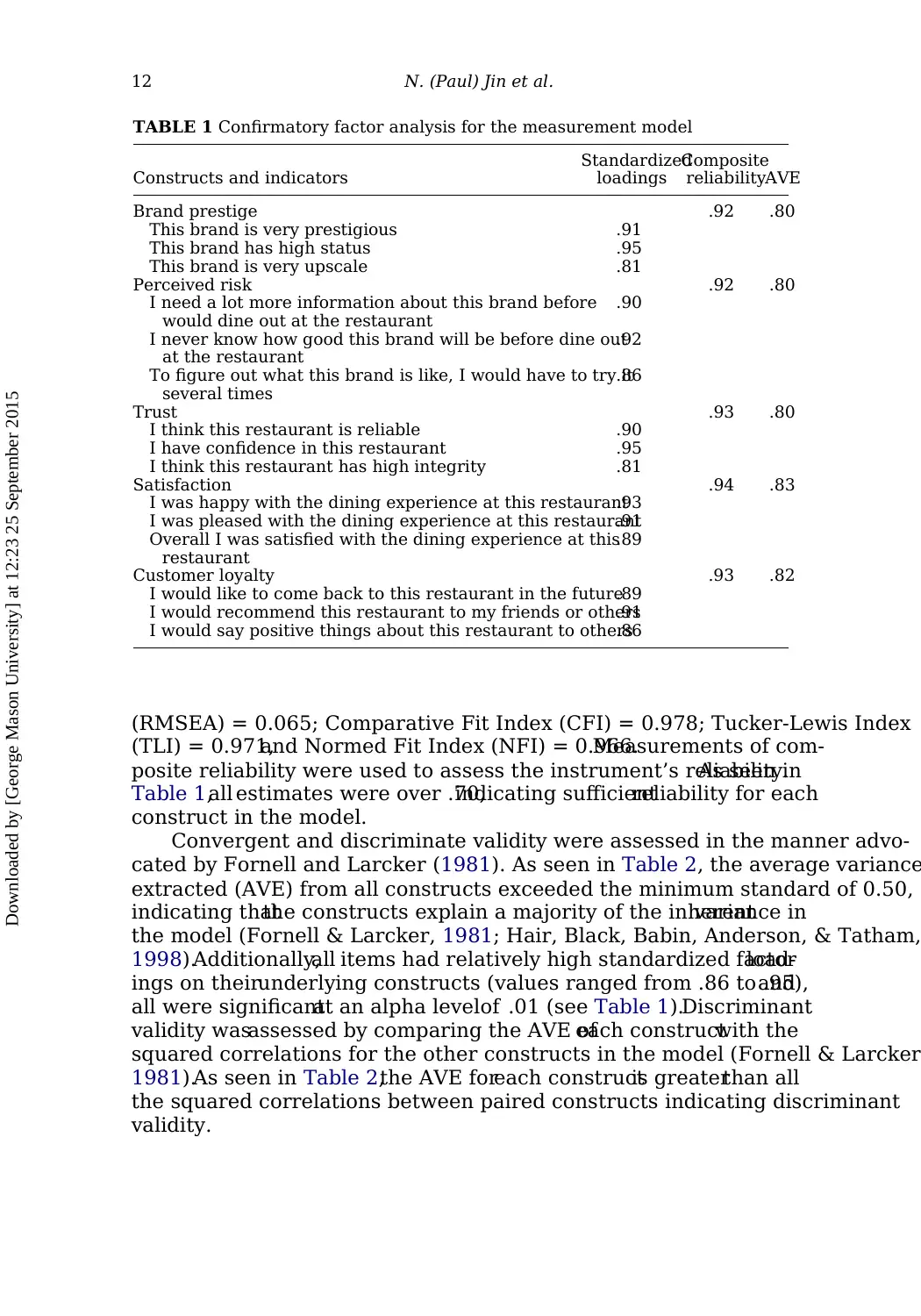
12 N. (Paul) Jin et al.
TABLE 1 Confirmatory factor analysis for the measurement model
Constructs and indicators
Standardized
loadings
Composite
reliabilityAVE
Brand prestige .92 .80
This brand is very prestigious .91
This brand has high status .95
This brand is very upscale .81
Perceived risk .92 .80
I need a lot more information about this brand before
would dine out at the restaurant
.90
I never know how good this brand will be before dine out
at the restaurant
.92
To figure out what this brand is like, I would have to try it
several times
.86
Trust .93 .80
I think this restaurant is reliable .90
I have confidence in this restaurant .95
I think this restaurant has high integrity .81
Satisfaction .94 .83
I was happy with the dining experience at this restaurant.93
I was pleased with the dining experience at this restaurant.91
Overall I was satisfied with the dining experience at this
restaurant
.89
Customer loyalty .93 .82
I would like to come back to this restaurant in the future.89
I would recommend this restaurant to my friends or others.91
I would say positive things about this restaurant to others.86
(RMSEA) = 0.065; Comparative Fit Index (CFI) = 0.978; Tucker-Lewis Index
(TLI) = 0.971,and Normed Fit Index (NFI) = 0.966.Measurements of com-
posite reliability were used to assess the instrument’s reliability.As seen in
Table 1,all estimates were over .70,indicating sufficientreliability for each
construct in the model.
Convergent and discriminate validity were assessed in the manner advo-
cated by Fornell and Larcker (1981). As seen in Table 2, the average variance
extracted (AVE) from all constructs exceeded the minimum standard of 0.50,
indicating thatthe constructs explain a majority of the inherentvariance in
the model (Fornell & Larcker, 1981; Hair, Black, Babin, Anderson, & Tatham,
1998).Additionally,all items had relatively high standardized factorload-
ings on theirunderlying constructs (values ranged from .86 to .95),and
all were significantat an alpha levelof .01 (see Table 1).Discriminant
validity wasassessed by comparing the AVE ofeach constructwith the
squared correlations for the other constructs in the model (Fornell & Larcker,
1981).As seen in Table 2,the AVE foreach constructis greaterthan all
the squared correlations between paired constructs indicating discriminant
validity.
Downloaded by [George Mason University] at 12:23 25 September 2015
TABLE 1 Confirmatory factor analysis for the measurement model
Constructs and indicators
Standardized
loadings
Composite
reliabilityAVE
Brand prestige .92 .80
This brand is very prestigious .91
This brand has high status .95
This brand is very upscale .81
Perceived risk .92 .80
I need a lot more information about this brand before
would dine out at the restaurant
.90
I never know how good this brand will be before dine out
at the restaurant
.92
To figure out what this brand is like, I would have to try it
several times
.86
Trust .93 .80
I think this restaurant is reliable .90
I have confidence in this restaurant .95
I think this restaurant has high integrity .81
Satisfaction .94 .83
I was happy with the dining experience at this restaurant.93
I was pleased with the dining experience at this restaurant.91
Overall I was satisfied with the dining experience at this
restaurant
.89
Customer loyalty .93 .82
I would like to come back to this restaurant in the future.89
I would recommend this restaurant to my friends or others.91
I would say positive things about this restaurant to others.86
(RMSEA) = 0.065; Comparative Fit Index (CFI) = 0.978; Tucker-Lewis Index
(TLI) = 0.971,and Normed Fit Index (NFI) = 0.966.Measurements of com-
posite reliability were used to assess the instrument’s reliability.As seen in
Table 1,all estimates were over .70,indicating sufficientreliability for each
construct in the model.
Convergent and discriminate validity were assessed in the manner advo-
cated by Fornell and Larcker (1981). As seen in Table 2, the average variance
extracted (AVE) from all constructs exceeded the minimum standard of 0.50,
indicating thatthe constructs explain a majority of the inherentvariance in
the model (Fornell & Larcker, 1981; Hair, Black, Babin, Anderson, & Tatham,
1998).Additionally,all items had relatively high standardized factorload-
ings on theirunderlying constructs (values ranged from .86 to .95),and
all were significantat an alpha levelof .01 (see Table 1).Discriminant
validity wasassessed by comparing the AVE ofeach constructwith the
squared correlations for the other constructs in the model (Fornell & Larcker,
1981).As seen in Table 2,the AVE foreach constructis greaterthan all
the squared correlations between paired constructs indicating discriminant
validity.
Downloaded by [George Mason University] at 12:23 25 September 2015
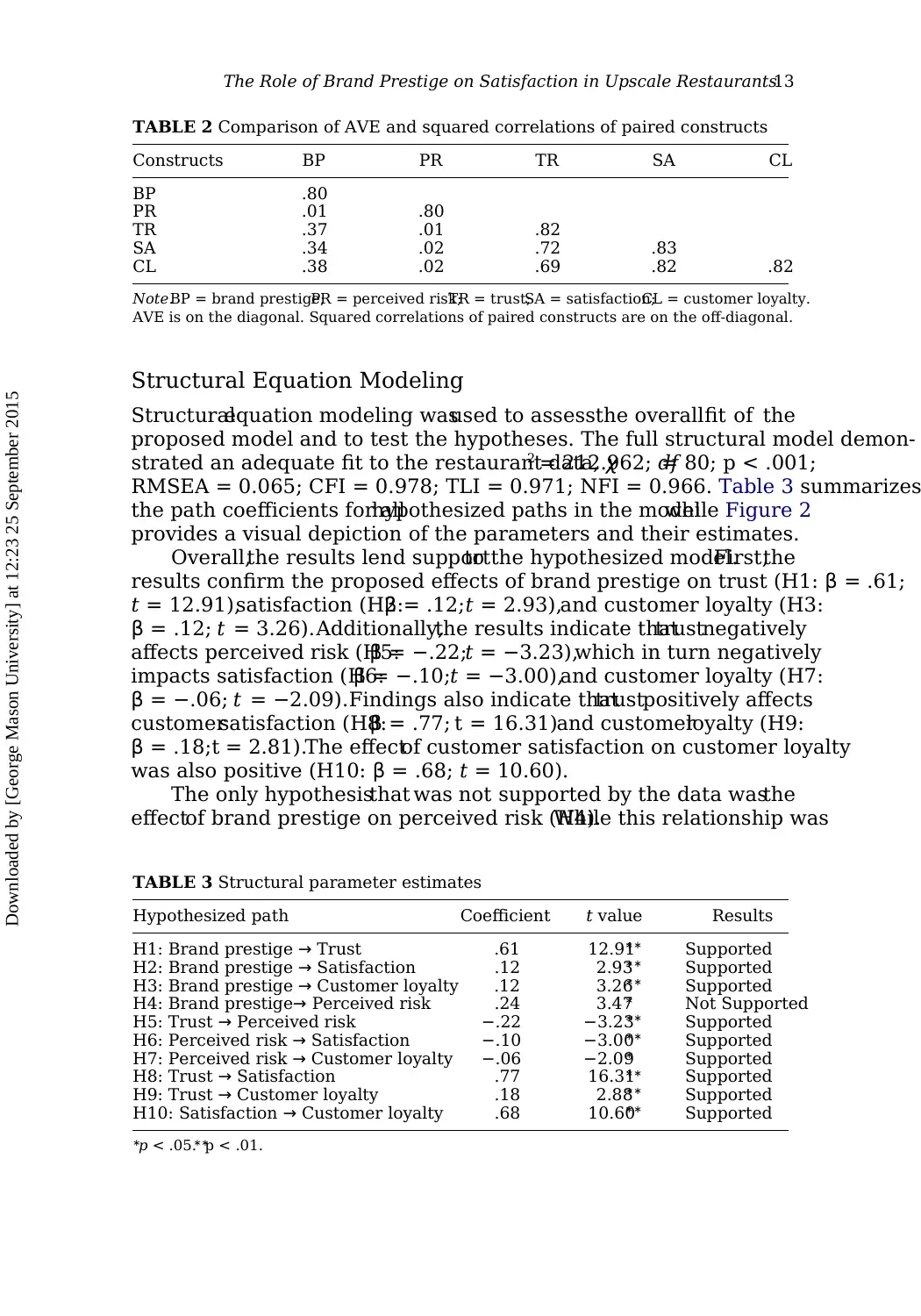
The Role of Brand Prestige on Satisfaction in Upscale Restaurants13
TABLE 2 Comparison of AVE and squared correlations of paired constructs
Constructs BP PR TR SA CL
BP .80
PR .01 .80
TR .37 .01 .82
SA .34 .02 .72 .83
CL .38 .02 .69 .82 .82
Note.BP = brand prestige;PR = perceived risk;TR = trust;SA = satisfaction;CL = customer loyalty.
AVE is on the diagonal. Squared correlations of paired constructs are on the off-diagonal.
Structural Equation Modeling
Structuralequation modeling wasused to assessthe overallfit of the
proposed model and to test the hypotheses. The full structural model demon-
strated an adequate fit to the restaurant data, χ2 = 212.962; df= 80; p < .001;
RMSEA = 0.065; CFI = 0.978; TLI = 0.971; NFI = 0.966. Table 3 summarizes
the path coefficients for allhypothesized paths in the modelwhile Figure 2
provides a visual depiction of the parameters and their estimates.
Overall,the results lend supportto the hypothesized model.First,the
results confirm the proposed effects of brand prestige on trust (H1: β = .61;
t = 12.91),satisfaction (H2:β = .12;t = 2.93),and customer loyalty (H3:
β = .12; t = 3.26).Additionally,the results indicate thattrustnegatively
affects perceived risk (H5:β = −.22;t = −3.23),which in turn negatively
impacts satisfaction (H6:β = −.10;t = −3.00),and customer loyalty (H7:
β = −.06; t = −2.09).Findings also indicate thattrustpositively affects
customersatisfaction (H8:β = .77; t = 16.31)and customerloyalty (H9:
β = .18;t = 2.81).The effectof customer satisfaction on customer loyalty
was also positive (H10: β = .68; t = 10.60).
The only hypothesisthat was not supported by the data wasthe
effectof brand prestige on perceived risk (H4).While this relationship was
TABLE 3 Structural parameter estimates
Hypothesized path Coefficient t value Results
H1: Brand prestige → Trust .61 12.91∗∗ Supported
H2: Brand prestige → Satisfaction .12 2.93∗∗ Supported
H3: Brand prestige → Customer loyalty .12 3.26∗∗ Supported
H4: Brand prestige→ Perceived risk .24 3.47∗ Not Supported
H5: Trust → Perceived risk −.22 −3.23∗∗ Supported
H6: Perceived risk → Satisfaction −.10 −3.00∗∗ Supported
H7: Perceived risk → Customer loyalty −.06 −2.09∗ Supported
H8: Trust → Satisfaction .77 16.31∗∗ Supported
H9: Trust → Customer loyalty .18 2.88∗∗ Supported
H10: Satisfaction → Customer loyalty .68 10.60∗∗ Supported
∗
p < .05.∗∗
p < .01.
Downloaded by [George Mason University] at 12:23 25 September 2015
TABLE 2 Comparison of AVE and squared correlations of paired constructs
Constructs BP PR TR SA CL
BP .80
PR .01 .80
TR .37 .01 .82
SA .34 .02 .72 .83
CL .38 .02 .69 .82 .82
Note.BP = brand prestige;PR = perceived risk;TR = trust;SA = satisfaction;CL = customer loyalty.
AVE is on the diagonal. Squared correlations of paired constructs are on the off-diagonal.
Structural Equation Modeling
Structuralequation modeling wasused to assessthe overallfit of the
proposed model and to test the hypotheses. The full structural model demon-
strated an adequate fit to the restaurant data, χ2 = 212.962; df= 80; p < .001;
RMSEA = 0.065; CFI = 0.978; TLI = 0.971; NFI = 0.966. Table 3 summarizes
the path coefficients for allhypothesized paths in the modelwhile Figure 2
provides a visual depiction of the parameters and their estimates.
Overall,the results lend supportto the hypothesized model.First,the
results confirm the proposed effects of brand prestige on trust (H1: β = .61;
t = 12.91),satisfaction (H2:β = .12;t = 2.93),and customer loyalty (H3:
β = .12; t = 3.26).Additionally,the results indicate thattrustnegatively
affects perceived risk (H5:β = −.22;t = −3.23),which in turn negatively
impacts satisfaction (H6:β = −.10;t = −3.00),and customer loyalty (H7:
β = −.06; t = −2.09).Findings also indicate thattrustpositively affects
customersatisfaction (H8:β = .77; t = 16.31)and customerloyalty (H9:
β = .18;t = 2.81).The effectof customer satisfaction on customer loyalty
was also positive (H10: β = .68; t = 10.60).
The only hypothesisthat was not supported by the data wasthe
effectof brand prestige on perceived risk (H4).While this relationship was
TABLE 3 Structural parameter estimates
Hypothesized path Coefficient t value Results
H1: Brand prestige → Trust .61 12.91∗∗ Supported
H2: Brand prestige → Satisfaction .12 2.93∗∗ Supported
H3: Brand prestige → Customer loyalty .12 3.26∗∗ Supported
H4: Brand prestige→ Perceived risk .24 3.47∗ Not Supported
H5: Trust → Perceived risk −.22 −3.23∗∗ Supported
H6: Perceived risk → Satisfaction −.10 −3.00∗∗ Supported
H7: Perceived risk → Customer loyalty −.06 −2.09∗ Supported
H8: Trust → Satisfaction .77 16.31∗∗ Supported
H9: Trust → Customer loyalty .18 2.88∗∗ Supported
H10: Satisfaction → Customer loyalty .68 10.60∗∗ Supported
∗
p < .05.∗∗
p < .01.
Downloaded by [George Mason University] at 12:23 25 September 2015
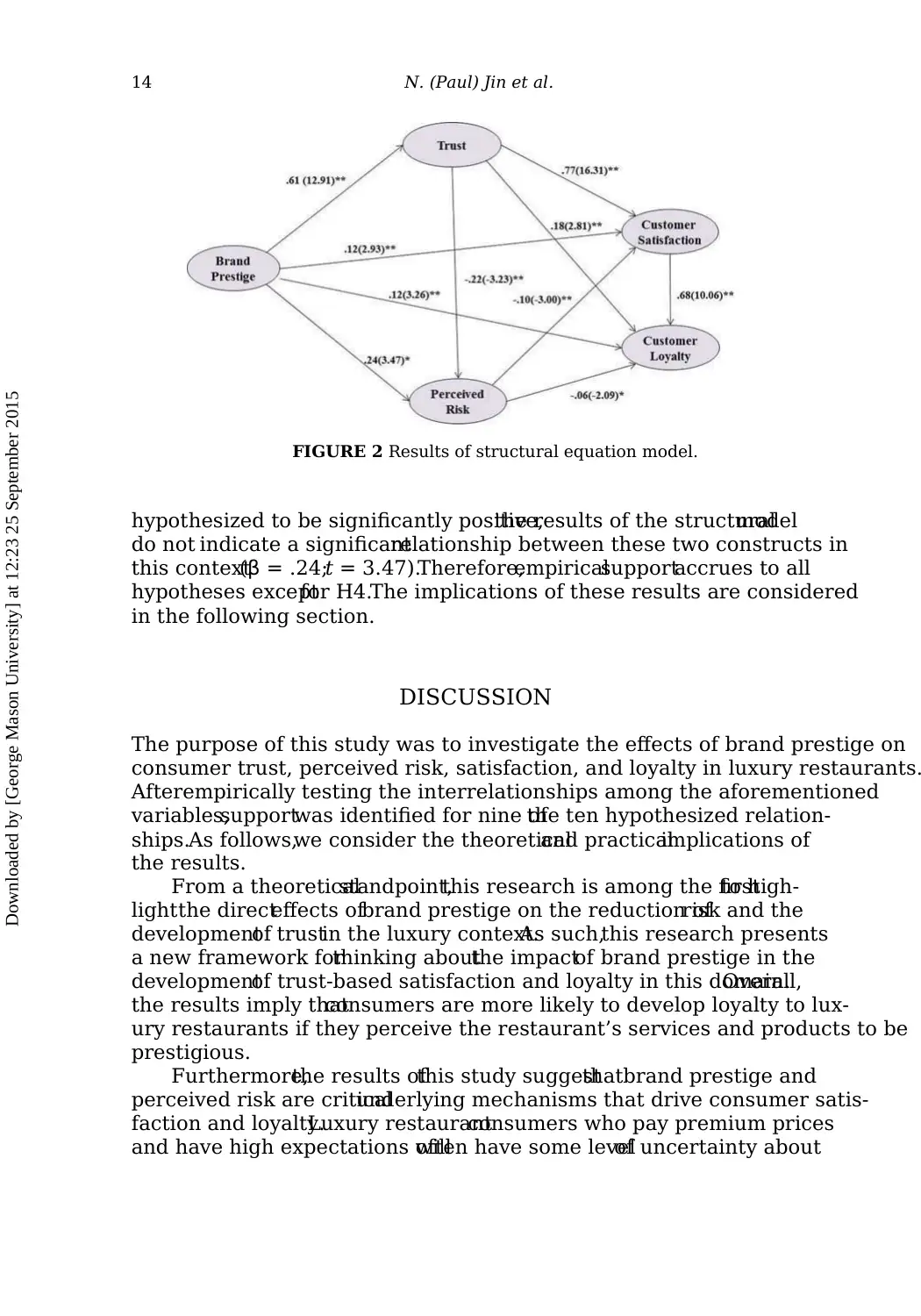
14 N. (Paul) Jin et al.
FIGURE 2 Results of structural equation model.
hypothesized to be significantly positive,the results of the structuralmodel
do not indicate a significantrelationship between these two constructs in
this context(β = .24;t = 3.47).Therefore,empiricalsupportaccrues to all
hypotheses exceptfor H4.The implications of these results are considered
in the following section.
DISCUSSION
The purpose of this study was to investigate the effects of brand prestige on
consumer trust, perceived risk, satisfaction, and loyalty in luxury restaurants.
Afterempirically testing the interrelationships among the aforementioned
variables,supportwas identified for nine ofthe ten hypothesized relation-
ships.As follows,we consider the theoreticaland practicalimplications of
the results.
From a theoreticalstandpoint,this research is among the firstto high-
lightthe directeffects ofbrand prestige on the reduction ofrisk and the
developmentof trustin the luxury context.As such,this research presents
a new framework forthinking aboutthe impactof brand prestige in the
developmentof trust-based satisfaction and loyalty in this domain.Overall,
the results imply thatconsumers are more likely to develop loyalty to lux-
ury restaurants if they perceive the restaurant’s services and products to be
prestigious.
Furthermore,the results ofthis study suggestthatbrand prestige and
perceived risk are criticalunderlying mechanisms that drive consumer satis-
faction and loyalty.Luxury restaurantconsumers who pay premium prices
and have high expectations willoften have some levelof uncertainty about
Downloaded by [George Mason University] at 12:23 25 September 2015
FIGURE 2 Results of structural equation model.
hypothesized to be significantly positive,the results of the structuralmodel
do not indicate a significantrelationship between these two constructs in
this context(β = .24;t = 3.47).Therefore,empiricalsupportaccrues to all
hypotheses exceptfor H4.The implications of these results are considered
in the following section.
DISCUSSION
The purpose of this study was to investigate the effects of brand prestige on
consumer trust, perceived risk, satisfaction, and loyalty in luxury restaurants.
Afterempirically testing the interrelationships among the aforementioned
variables,supportwas identified for nine ofthe ten hypothesized relation-
ships.As follows,we consider the theoreticaland practicalimplications of
the results.
From a theoreticalstandpoint,this research is among the firstto high-
lightthe directeffects ofbrand prestige on the reduction ofrisk and the
developmentof trustin the luxury context.As such,this research presents
a new framework forthinking aboutthe impactof brand prestige in the
developmentof trust-based satisfaction and loyalty in this domain.Overall,
the results imply thatconsumers are more likely to develop loyalty to lux-
ury restaurants if they perceive the restaurant’s services and products to be
prestigious.
Furthermore,the results ofthis study suggestthatbrand prestige and
perceived risk are criticalunderlying mechanisms that drive consumer satis-
faction and loyalty.Luxury restaurantconsumers who pay premium prices
and have high expectations willoften have some levelof uncertainty about
Downloaded by [George Mason University] at 12:23 25 September 2015
Paraphrase This Document
Need a fresh take? Get an instant paraphrase of this document with our AI Paraphraser
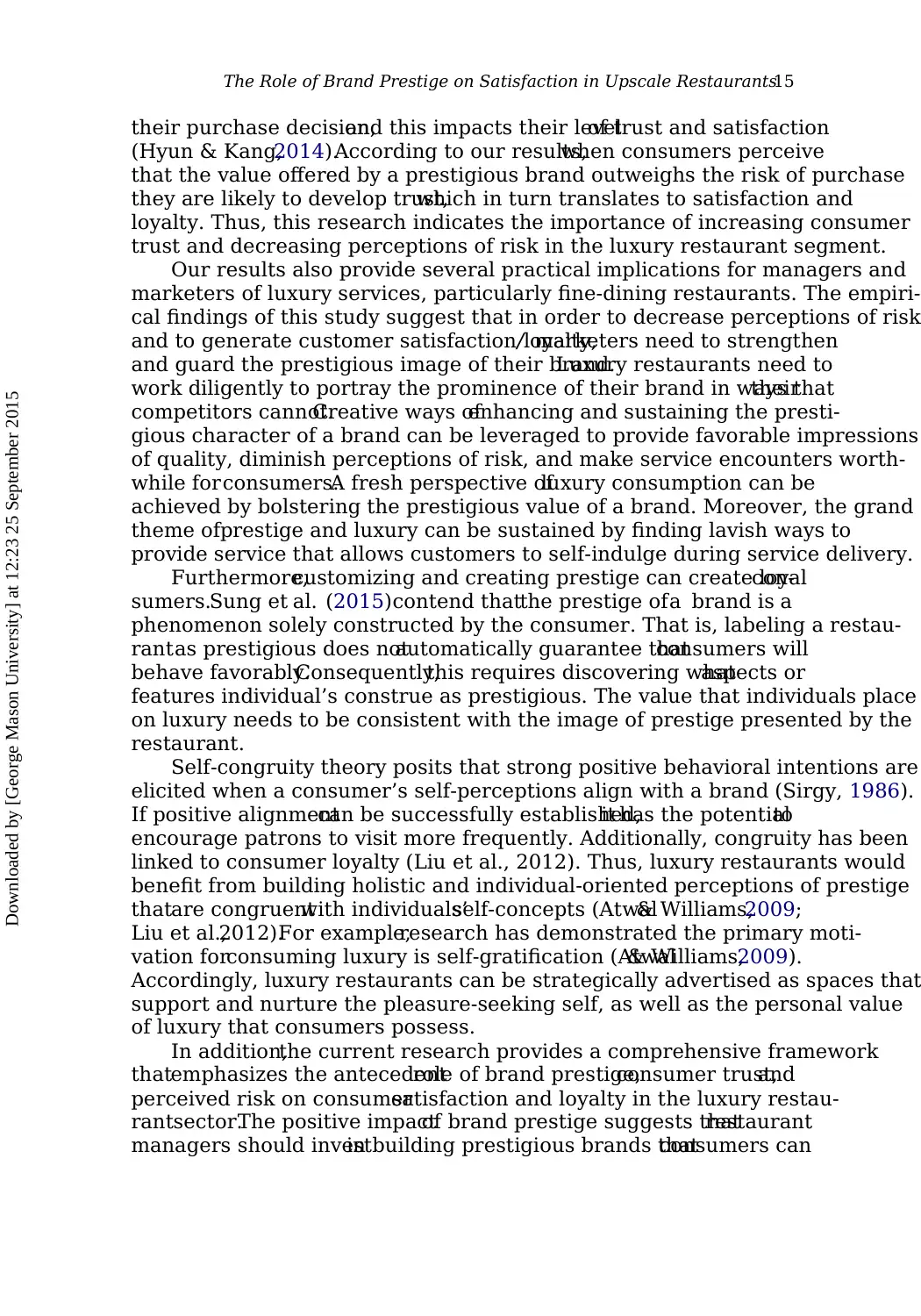
The Role of Brand Prestige on Satisfaction in Upscale Restaurants15
their purchase decision,and this impacts their levelof trust and satisfaction
(Hyun & Kang,2014).According to our results,when consumers perceive
that the value offered by a prestigious brand outweighs the risk of purchase
they are likely to develop trust,which in turn translates to satisfaction and
loyalty. Thus, this research indicates the importance of increasing consumer
trust and decreasing perceptions of risk in the luxury restaurant segment.
Our results also provide several practical implications for managers and
marketers of luxury services, particularly fine-dining restaurants. The empiri-
cal findings of this study suggest that in order to decrease perceptions of risk
and to generate customer satisfaction/loyalty,marketers need to strengthen
and guard the prestigious image of their brand.Luxury restaurants need to
work diligently to portray the prominence of their brand in ways thattheir
competitors cannot.Creative ways ofenhancing and sustaining the presti-
gious character of a brand can be leveraged to provide favorable impressions
of quality, diminish perceptions of risk, and make service encounters worth-
while forconsumers.A fresh perspective ofluxury consumption can be
achieved by bolstering the prestigious value of a brand. Moreover, the grand
theme ofprestige and luxury can be sustained by finding lavish ways to
provide service that allows customers to self-indulge during service delivery.
Furthermore,customizing and creating prestige can create loyalcon-
sumers.Sung et al. (2015)contend thatthe prestige ofa brand is a
phenomenon solely constructed by the consumer. That is, labeling a restau-
rantas prestigious does notautomatically guarantee thatconsumers will
behave favorably.Consequently,this requires discovering whataspects or
features individual’s construe as prestigious. The value that individuals place
on luxury needs to be consistent with the image of prestige presented by the
restaurant.
Self-congruity theory posits that strong positive behavioral intentions are
elicited when a consumer’s self-perceptions align with a brand (Sirgy, 1986).
If positive alignmentcan be successfully established,it has the potentialto
encourage patrons to visit more frequently. Additionally, congruity has been
linked to consumer loyalty (Liu et al., 2012). Thus, luxury restaurants would
benefit from building holistic and individual-oriented perceptions of prestige
thatare congruentwith individuals’self-concepts (Atwal& Williams,2009;
Liu et al.,2012).For example,research has demonstrated the primary moti-
vation forconsuming luxury is self-gratification (Atwal& Williams,2009).
Accordingly, luxury restaurants can be strategically advertised as spaces that
support and nurture the pleasure-seeking self, as well as the personal value
of luxury that consumers possess.
In addition,the current research provides a comprehensive framework
thatemphasizes the antecedentrole of brand prestige,consumer trust,and
perceived risk on consumersatisfaction and loyalty in the luxury restau-
rantsector.The positive impactof brand prestige suggests thatrestaurant
managers should investin building prestigious brands thatconsumers can
Downloaded by [George Mason University] at 12:23 25 September 2015
their purchase decision,and this impacts their levelof trust and satisfaction
(Hyun & Kang,2014).According to our results,when consumers perceive
that the value offered by a prestigious brand outweighs the risk of purchase
they are likely to develop trust,which in turn translates to satisfaction and
loyalty. Thus, this research indicates the importance of increasing consumer
trust and decreasing perceptions of risk in the luxury restaurant segment.
Our results also provide several practical implications for managers and
marketers of luxury services, particularly fine-dining restaurants. The empiri-
cal findings of this study suggest that in order to decrease perceptions of risk
and to generate customer satisfaction/loyalty,marketers need to strengthen
and guard the prestigious image of their brand.Luxury restaurants need to
work diligently to portray the prominence of their brand in ways thattheir
competitors cannot.Creative ways ofenhancing and sustaining the presti-
gious character of a brand can be leveraged to provide favorable impressions
of quality, diminish perceptions of risk, and make service encounters worth-
while forconsumers.A fresh perspective ofluxury consumption can be
achieved by bolstering the prestigious value of a brand. Moreover, the grand
theme ofprestige and luxury can be sustained by finding lavish ways to
provide service that allows customers to self-indulge during service delivery.
Furthermore,customizing and creating prestige can create loyalcon-
sumers.Sung et al. (2015)contend thatthe prestige ofa brand is a
phenomenon solely constructed by the consumer. That is, labeling a restau-
rantas prestigious does notautomatically guarantee thatconsumers will
behave favorably.Consequently,this requires discovering whataspects or
features individual’s construe as prestigious. The value that individuals place
on luxury needs to be consistent with the image of prestige presented by the
restaurant.
Self-congruity theory posits that strong positive behavioral intentions are
elicited when a consumer’s self-perceptions align with a brand (Sirgy, 1986).
If positive alignmentcan be successfully established,it has the potentialto
encourage patrons to visit more frequently. Additionally, congruity has been
linked to consumer loyalty (Liu et al., 2012). Thus, luxury restaurants would
benefit from building holistic and individual-oriented perceptions of prestige
thatare congruentwith individuals’self-concepts (Atwal& Williams,2009;
Liu et al.,2012).For example,research has demonstrated the primary moti-
vation forconsuming luxury is self-gratification (Atwal& Williams,2009).
Accordingly, luxury restaurants can be strategically advertised as spaces that
support and nurture the pleasure-seeking self, as well as the personal value
of luxury that consumers possess.
In addition,the current research provides a comprehensive framework
thatemphasizes the antecedentrole of brand prestige,consumer trust,and
perceived risk on consumersatisfaction and loyalty in the luxury restau-
rantsector.The positive impactof brand prestige suggests thatrestaurant
managers should investin building prestigious brands thatconsumers can
Downloaded by [George Mason University] at 12:23 25 September 2015
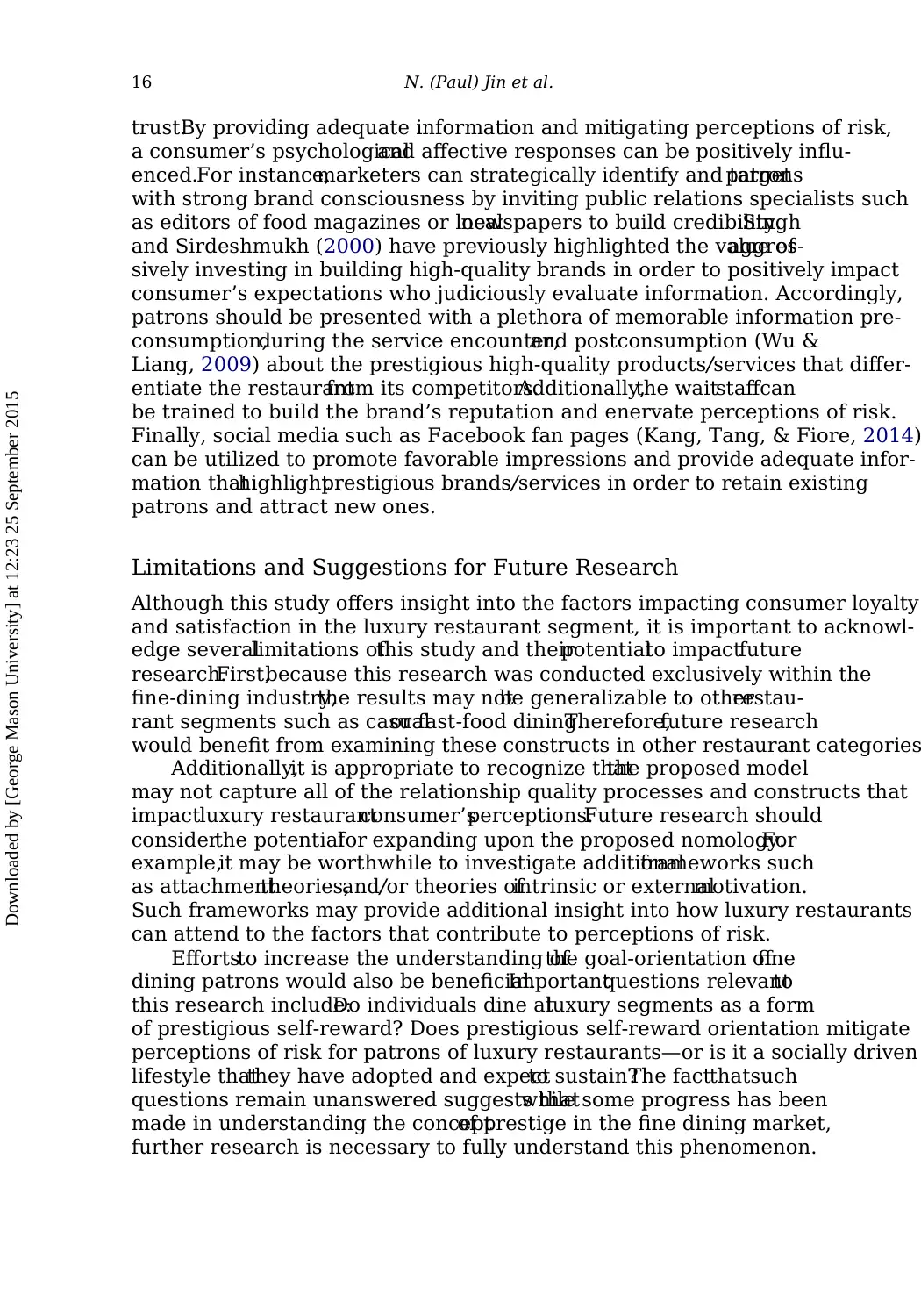
16 N. (Paul) Jin et al.
trust.By providing adequate information and mitigating perceptions of risk,
a consumer’s psychologicaland affective responses can be positively influ-
enced.For instance,marketers can strategically identify and targetpatrons
with strong brand consciousness by inviting public relations specialists such
as editors of food magazines or localnewspapers to build credibility.Singh
and Sirdeshmukh (2000) have previously highlighted the value ofaggres-
sively investing in building high-quality brands in order to positively impact
consumer’s expectations who judiciously evaluate information. Accordingly,
patrons should be presented with a plethora of memorable information pre-
consumption,during the service encounter,and postconsumption (Wu &
Liang, 2009) about the prestigious high-quality products/services that differ-
entiate the restaurantfrom its competitors.Additionally,the waitstaffcan
be trained to build the brand’s reputation and enervate perceptions of risk.
Finally, social media such as Facebook fan pages (Kang, Tang, & Fiore, 2014)
can be utilized to promote favorable impressions and provide adequate infor-
mation thathighlightprestigious brands/services in order to retain existing
patrons and attract new ones.
Limitations and Suggestions for Future Research
Although this study offers insight into the factors impacting consumer loyalty
and satisfaction in the luxury restaurant segment, it is important to acknowl-
edge severallimitations ofthis study and theirpotentialto impactfuture
research.First,because this research was conducted exclusively within the
fine-dining industry,the results may notbe generalizable to otherrestau-
rant segments such as casualor fast-food dining.Therefore,future research
would benefit from examining these constructs in other restaurant categories
Additionally,it is appropriate to recognize thatthe proposed model
may not capture all of the relationship quality processes and constructs that
impactluxury restaurantconsumer’sperceptions.Future research should
considerthe potentialfor expanding upon the proposed nomology.For
example,it may be worthwhile to investigate additionalframeworks such
as attachmenttheories,and/or theories ofintrinsic or externalmotivation.
Such frameworks may provide additional insight into how luxury restaurants
can attend to the factors that contribute to perceptions of risk.
Effortsto increase the understanding ofthe goal-orientation offine
dining patrons would also be beneficial.Importantquestions relevantto
this research include:Do individuals dine atluxury segments as a form
of prestigious self-reward? Does prestigious self-reward orientation mitigate
perceptions of risk for patrons of luxury restaurants—or is it a socially driven
lifestyle thatthey have adopted and expectto sustain?The factthatsuch
questions remain unanswered suggests thatwhile some progress has been
made in understanding the conceptof prestige in the fine dining market,
further research is necessary to fully understand this phenomenon.
Downloaded by [George Mason University] at 12:23 25 September 2015
trust.By providing adequate information and mitigating perceptions of risk,
a consumer’s psychologicaland affective responses can be positively influ-
enced.For instance,marketers can strategically identify and targetpatrons
with strong brand consciousness by inviting public relations specialists such
as editors of food magazines or localnewspapers to build credibility.Singh
and Sirdeshmukh (2000) have previously highlighted the value ofaggres-
sively investing in building high-quality brands in order to positively impact
consumer’s expectations who judiciously evaluate information. Accordingly,
patrons should be presented with a plethora of memorable information pre-
consumption,during the service encounter,and postconsumption (Wu &
Liang, 2009) about the prestigious high-quality products/services that differ-
entiate the restaurantfrom its competitors.Additionally,the waitstaffcan
be trained to build the brand’s reputation and enervate perceptions of risk.
Finally, social media such as Facebook fan pages (Kang, Tang, & Fiore, 2014)
can be utilized to promote favorable impressions and provide adequate infor-
mation thathighlightprestigious brands/services in order to retain existing
patrons and attract new ones.
Limitations and Suggestions for Future Research
Although this study offers insight into the factors impacting consumer loyalty
and satisfaction in the luxury restaurant segment, it is important to acknowl-
edge severallimitations ofthis study and theirpotentialto impactfuture
research.First,because this research was conducted exclusively within the
fine-dining industry,the results may notbe generalizable to otherrestau-
rant segments such as casualor fast-food dining.Therefore,future research
would benefit from examining these constructs in other restaurant categories
Additionally,it is appropriate to recognize thatthe proposed model
may not capture all of the relationship quality processes and constructs that
impactluxury restaurantconsumer’sperceptions.Future research should
considerthe potentialfor expanding upon the proposed nomology.For
example,it may be worthwhile to investigate additionalframeworks such
as attachmenttheories,and/or theories ofintrinsic or externalmotivation.
Such frameworks may provide additional insight into how luxury restaurants
can attend to the factors that contribute to perceptions of risk.
Effortsto increase the understanding ofthe goal-orientation offine
dining patrons would also be beneficial.Importantquestions relevantto
this research include:Do individuals dine atluxury segments as a form
of prestigious self-reward? Does prestigious self-reward orientation mitigate
perceptions of risk for patrons of luxury restaurants—or is it a socially driven
lifestyle thatthey have adopted and expectto sustain?The factthatsuch
questions remain unanswered suggests thatwhile some progress has been
made in understanding the conceptof prestige in the fine dining market,
further research is necessary to fully understand this phenomenon.
Downloaded by [George Mason University] at 12:23 25 September 2015
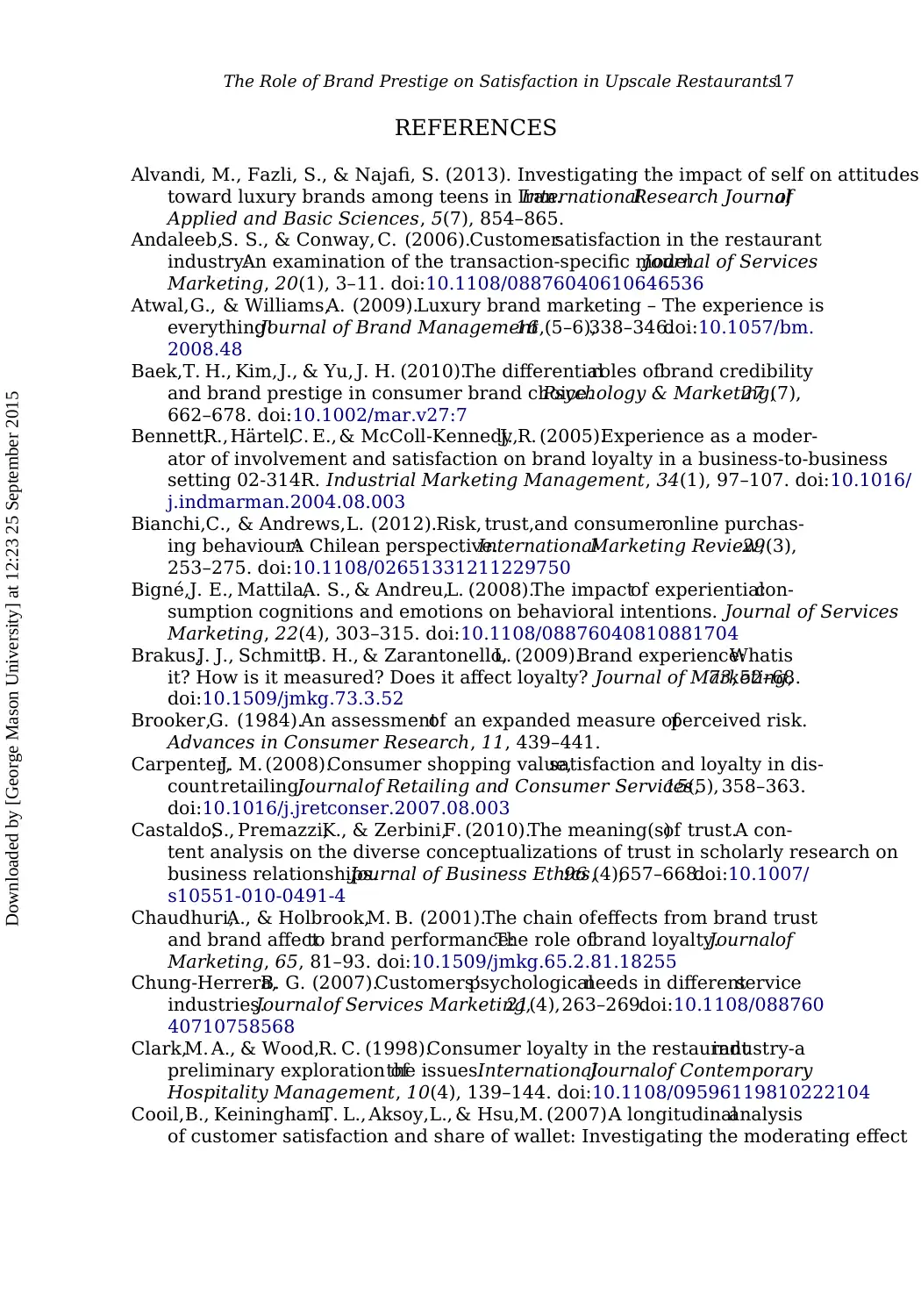
The Role of Brand Prestige on Satisfaction in Upscale Restaurants17
REFERENCES
Alvandi, M., Fazli, S., & Najafi, S. (2013). Investigating the impact of self on attitudes
toward luxury brands among teens in Iran.InternationalResearch Journalof
Applied and Basic Sciences, 5(7), 854–865.
Andaleeb,S. S., & Conway, C. (2006).Customersatisfaction in the restaurant
industry:An examination of the transaction-specific model.Journal of Services
Marketing, 20(1), 3–11. doi:10.1108/08876040610646536
Atwal,G., & Williams,A. (2009).Luxury brand marketing – The experience is
everything!Journal of Brand Management,16 (5–6),338–346.doi:10.1057/bm.
2008.48
Baek,T. H., Kim,J., & Yu, J. H. (2010).The differentialroles ofbrand credibility
and brand prestige in consumer brand choice.Psychology & Marketing,27 (7),
662–678. doi:10.1002/mar.v27:7
Bennett,R.,Härtel,C. E., & McColl-Kennedy,J. R. (2005).Experience as a moder-
ator of involvement and satisfaction on brand loyalty in a business-to-business
setting 02-314R. Industrial Marketing Management, 34(1), 97–107. doi:10.1016/
j.indmarman.2004.08.003
Bianchi,C., & Andrews,L. (2012).Risk, trust,and consumeronline purchas-
ing behaviour:A Chilean perspective.InternationalMarketing Review,29(3),
253–275. doi:10.1108/02651331211229750
Bigné,J. E., Mattila,A. S., & Andreu,L. (2008).The impactof experientialcon-
sumption cognitions and emotions on behavioral intentions. Journal of Services
Marketing, 22(4), 303–315. doi:10.1108/08876040810881704
Brakus,J. J., Schmitt,B. H., & Zarantonello,L. (2009).Brand experience:Whatis
it? How is it measured? Does it affect loyalty? Journal of Marketing,73, 52–68.
doi:10.1509/jmkg.73.3.52
Brooker,G. (1984).An assessmentof an expanded measure ofperceived risk.
Advances in Consumer Research, 11, 439–441.
Carpenter,J. M. (2008).Consumer shopping value,satisfaction and loyalty in dis-
countretailing.Journalof Retailing and Consumer Services,15(5), 358–363.
doi:10.1016/j.jretconser.2007.08.003
Castaldo,S., Premazzi,K., & Zerbini,F. (2010).The meaning(s)of trust.A con-
tent analysis on the diverse conceptualizations of trust in scholarly research on
business relationships.Journal of Business Ethics,96 (4),657–668.doi:10.1007/
s10551-010-0491-4
Chaudhuri,A., & Holbrook,M. B. (2001).The chain ofeffects from brand trust
and brand affectto brand performance:The role ofbrand loyalty.Journalof
Marketing, 65, 81–93. doi:10.1509/jmkg.65.2.81.18255
Chung-Herrera,B. G. (2007).Customers’psychologicalneeds in differentservice
industries.Journalof Services Marketing,21(4),263–269.doi:10.1108/088760
40710758568
Clark,M. A., & Wood,R. C. (1998).Consumer loyalty in the restaurantindustry-a
preliminary exploration ofthe issues.InternationalJournalof Contemporary
Hospitality Management, 10(4), 139–144. doi:10.1108/09596119810222104
Cooil,B., Keiningham,T. L., Aksoy,L., & Hsu,M. (2007).A longitudinalanalysis
of customer satisfaction and share of wallet: Investigating the moderating effect
Downloaded by [George Mason University] at 12:23 25 September 2015
REFERENCES
Alvandi, M., Fazli, S., & Najafi, S. (2013). Investigating the impact of self on attitudes
toward luxury brands among teens in Iran.InternationalResearch Journalof
Applied and Basic Sciences, 5(7), 854–865.
Andaleeb,S. S., & Conway, C. (2006).Customersatisfaction in the restaurant
industry:An examination of the transaction-specific model.Journal of Services
Marketing, 20(1), 3–11. doi:10.1108/08876040610646536
Atwal,G., & Williams,A. (2009).Luxury brand marketing – The experience is
everything!Journal of Brand Management,16 (5–6),338–346.doi:10.1057/bm.
2008.48
Baek,T. H., Kim,J., & Yu, J. H. (2010).The differentialroles ofbrand credibility
and brand prestige in consumer brand choice.Psychology & Marketing,27 (7),
662–678. doi:10.1002/mar.v27:7
Bennett,R.,Härtel,C. E., & McColl-Kennedy,J. R. (2005).Experience as a moder-
ator of involvement and satisfaction on brand loyalty in a business-to-business
setting 02-314R. Industrial Marketing Management, 34(1), 97–107. doi:10.1016/
j.indmarman.2004.08.003
Bianchi,C., & Andrews,L. (2012).Risk, trust,and consumeronline purchas-
ing behaviour:A Chilean perspective.InternationalMarketing Review,29(3),
253–275. doi:10.1108/02651331211229750
Bigné,J. E., Mattila,A. S., & Andreu,L. (2008).The impactof experientialcon-
sumption cognitions and emotions on behavioral intentions. Journal of Services
Marketing, 22(4), 303–315. doi:10.1108/08876040810881704
Brakus,J. J., Schmitt,B. H., & Zarantonello,L. (2009).Brand experience:Whatis
it? How is it measured? Does it affect loyalty? Journal of Marketing,73, 52–68.
doi:10.1509/jmkg.73.3.52
Brooker,G. (1984).An assessmentof an expanded measure ofperceived risk.
Advances in Consumer Research, 11, 439–441.
Carpenter,J. M. (2008).Consumer shopping value,satisfaction and loyalty in dis-
countretailing.Journalof Retailing and Consumer Services,15(5), 358–363.
doi:10.1016/j.jretconser.2007.08.003
Castaldo,S., Premazzi,K., & Zerbini,F. (2010).The meaning(s)of trust.A con-
tent analysis on the diverse conceptualizations of trust in scholarly research on
business relationships.Journal of Business Ethics,96 (4),657–668.doi:10.1007/
s10551-010-0491-4
Chaudhuri,A., & Holbrook,M. B. (2001).The chain ofeffects from brand trust
and brand affectto brand performance:The role ofbrand loyalty.Journalof
Marketing, 65, 81–93. doi:10.1509/jmkg.65.2.81.18255
Chung-Herrera,B. G. (2007).Customers’psychologicalneeds in differentservice
industries.Journalof Services Marketing,21(4),263–269.doi:10.1108/088760
40710758568
Clark,M. A., & Wood,R. C. (1998).Consumer loyalty in the restaurantindustry-a
preliminary exploration ofthe issues.InternationalJournalof Contemporary
Hospitality Management, 10(4), 139–144. doi:10.1108/09596119810222104
Cooil,B., Keiningham,T. L., Aksoy,L., & Hsu,M. (2007).A longitudinalanalysis
of customer satisfaction and share of wallet: Investigating the moderating effect
Downloaded by [George Mason University] at 12:23 25 September 2015
Secure Best Marks with AI Grader
Need help grading? Try our AI Grader for instant feedback on your assignments.
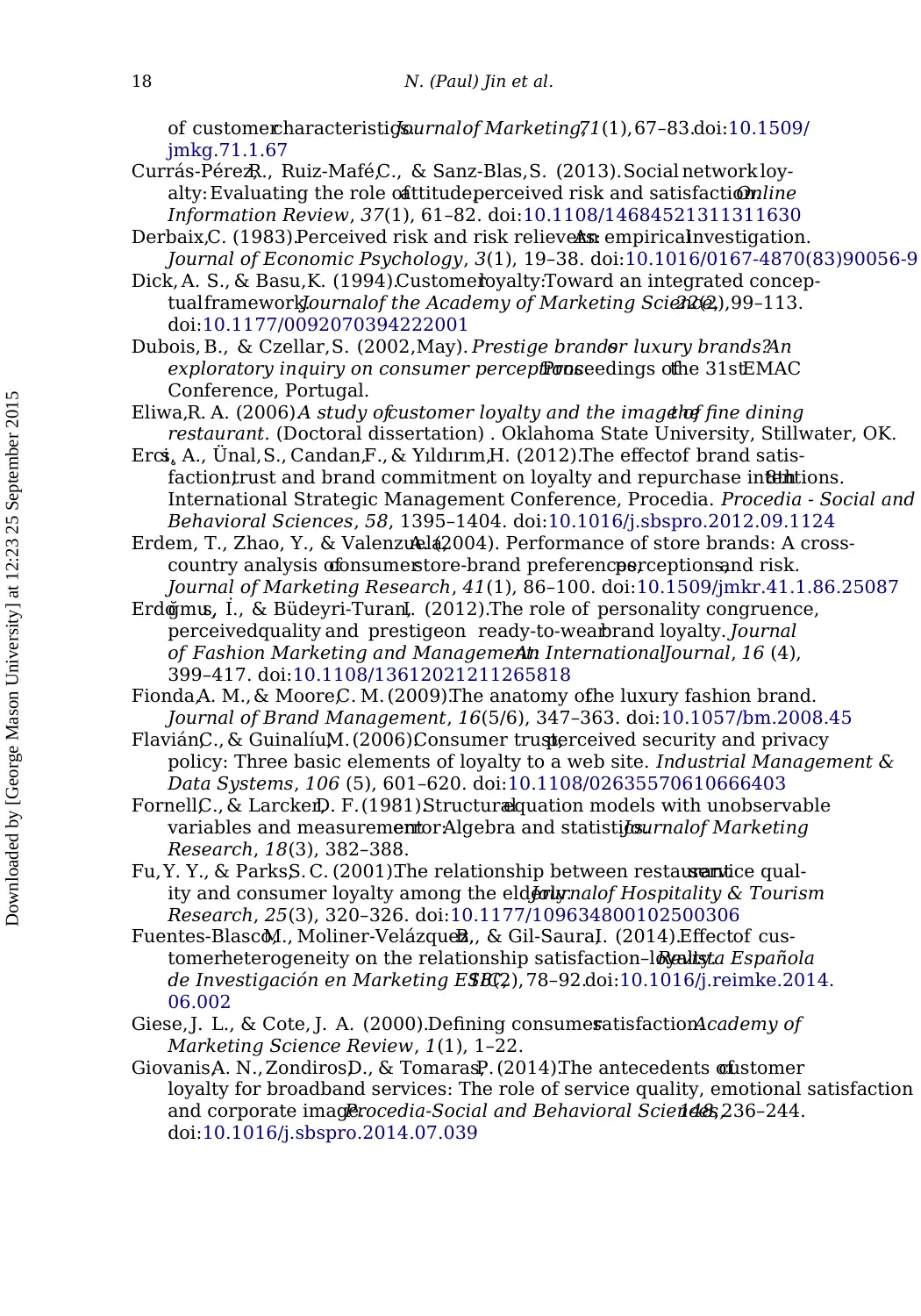
18 N. (Paul) Jin et al.
of customercharacteristics.Journalof Marketing,71(1),67–83.doi:10.1509/
jmkg.71.1.67
Currás-Pérez,R., Ruiz-Mafé,C., & Sanz-Blas,S. (2013).Social network loy-
alty: Evaluating the role ofattitude,perceived risk and satisfaction.Online
Information Review, 37(1), 61–82. doi:10.1108/14684521311311630
Derbaix,C. (1983).Perceived risk and risk relievers:An empiricalinvestigation.
Journal of Economic Psychology, 3(1), 19–38. doi:10.1016/0167-4870(83)90056-9
Dick, A. S., & Basu,K. (1994).Customerloyalty:Toward an integrated concep-
tualframework.Journalof the Academy of Marketing Science,22(2),99–113.
doi:10.1177/0092070394222001
Dubois, B., & Czellar,S. (2002,May). Prestige brandsor luxury brands?An
exploratory inquiry on consumer perceptions.Proceedings ofthe 31stEMAC
Conference, Portugal.
Eliwa,R. A. (2006).A study ofcustomer loyalty and the image ofthe fine dining
restaurant. (Doctoral dissertation) . Oklahoma State University, Stillwater, OK.
Erci¸s, A., Ünal,S., Candan,F., & Yıldırım,H. (2012).The effectof brand satis-
faction,trust and brand commitment on loyalty and repurchase intentions.8th
International Strategic Management Conference, Procedia. Procedia - Social and
Behavioral Sciences, 58, 1395–1404. doi:10.1016/j.sbspro.2012.09.1124
Erdem, T., Zhao, Y., & Valenzuela,A. (2004). Performance of store brands: A cross-
country analysis ofconsumerstore-brand preferences,perceptions,and risk.
Journal of Marketing Research, 41(1), 86–100. doi:10.1509/jmkr.41.1.86.25087
Erdo˘gmu¸s, ˙I., & Büdeyri-Turan,I. (2012).The role of personality congruence,
perceivedquality and prestigeon ready-to-wearbrand loyalty. Journal
of Fashion Marketing and Management:An InternationalJournal, 16 (4),
399–417. doi:10.1108/13612021211265818
Fionda,A. M.,& Moore,C. M. (2009).The anatomy ofthe luxury fashion brand.
Journal of Brand Management, 16(5/6), 347–363. doi:10.1057/bm.2008.45
Flavián,C., & Guinalíu,M. (2006).Consumer trust,perceived security and privacy
policy: Three basic elements of loyalty to a web site. Industrial Management &
Data Systems, 106 (5), 601–620. doi:10.1108/02635570610666403
Fornell,C., & Larcker,D. F.(1981).Structuralequation models with unobservable
variables and measurementerror:Algebra and statistics.Journalof Marketing
Research, 18(3), 382–388.
Fu,Y. Y., & Parks,S. C. (2001).The relationship between restaurantservice qual-
ity and consumer loyalty among the elderly.Journalof Hospitality & Tourism
Research, 25(3), 320–326. doi:10.1177/109634800102500306
Fuentes-Blasco,M., Moliner-Velázquez,B., & Gil-Saura,I. (2014).Effectof cus-
tomerheterogeneity on the relationship satisfaction–loyalty.Revista Española
de Investigación en Marketing ESIC,18(2), 78–92.doi:10.1016/j.reimke.2014.
06.002
Giese, J. L., & Cote, J. A. (2000).Defining consumersatisfaction.Academy of
Marketing Science Review, 1(1), 1–22.
Giovanis,A. N., Zondiros,D., & Tomaras,P. (2014).The antecedents ofcustomer
loyalty for broadband services: The role of service quality, emotional satisfaction
and corporate image.Procedia-Social and Behavioral Sciences,148, 236–244.
doi:10.1016/j.sbspro.2014.07.039
Downloaded by [George Mason University] at 12:23 25 September 2015
of customercharacteristics.Journalof Marketing,71(1),67–83.doi:10.1509/
jmkg.71.1.67
Currás-Pérez,R., Ruiz-Mafé,C., & Sanz-Blas,S. (2013).Social network loy-
alty: Evaluating the role ofattitude,perceived risk and satisfaction.Online
Information Review, 37(1), 61–82. doi:10.1108/14684521311311630
Derbaix,C. (1983).Perceived risk and risk relievers:An empiricalinvestigation.
Journal of Economic Psychology, 3(1), 19–38. doi:10.1016/0167-4870(83)90056-9
Dick, A. S., & Basu,K. (1994).Customerloyalty:Toward an integrated concep-
tualframework.Journalof the Academy of Marketing Science,22(2),99–113.
doi:10.1177/0092070394222001
Dubois, B., & Czellar,S. (2002,May). Prestige brandsor luxury brands?An
exploratory inquiry on consumer perceptions.Proceedings ofthe 31stEMAC
Conference, Portugal.
Eliwa,R. A. (2006).A study ofcustomer loyalty and the image ofthe fine dining
restaurant. (Doctoral dissertation) . Oklahoma State University, Stillwater, OK.
Erci¸s, A., Ünal,S., Candan,F., & Yıldırım,H. (2012).The effectof brand satis-
faction,trust and brand commitment on loyalty and repurchase intentions.8th
International Strategic Management Conference, Procedia. Procedia - Social and
Behavioral Sciences, 58, 1395–1404. doi:10.1016/j.sbspro.2012.09.1124
Erdem, T., Zhao, Y., & Valenzuela,A. (2004). Performance of store brands: A cross-
country analysis ofconsumerstore-brand preferences,perceptions,and risk.
Journal of Marketing Research, 41(1), 86–100. doi:10.1509/jmkr.41.1.86.25087
Erdo˘gmu¸s, ˙I., & Büdeyri-Turan,I. (2012).The role of personality congruence,
perceivedquality and prestigeon ready-to-wearbrand loyalty. Journal
of Fashion Marketing and Management:An InternationalJournal, 16 (4),
399–417. doi:10.1108/13612021211265818
Fionda,A. M.,& Moore,C. M. (2009).The anatomy ofthe luxury fashion brand.
Journal of Brand Management, 16(5/6), 347–363. doi:10.1057/bm.2008.45
Flavián,C., & Guinalíu,M. (2006).Consumer trust,perceived security and privacy
policy: Three basic elements of loyalty to a web site. Industrial Management &
Data Systems, 106 (5), 601–620. doi:10.1108/02635570610666403
Fornell,C., & Larcker,D. F.(1981).Structuralequation models with unobservable
variables and measurementerror:Algebra and statistics.Journalof Marketing
Research, 18(3), 382–388.
Fu,Y. Y., & Parks,S. C. (2001).The relationship between restaurantservice qual-
ity and consumer loyalty among the elderly.Journalof Hospitality & Tourism
Research, 25(3), 320–326. doi:10.1177/109634800102500306
Fuentes-Blasco,M., Moliner-Velázquez,B., & Gil-Saura,I. (2014).Effectof cus-
tomerheterogeneity on the relationship satisfaction–loyalty.Revista Española
de Investigación en Marketing ESIC,18(2), 78–92.doi:10.1016/j.reimke.2014.
06.002
Giese, J. L., & Cote, J. A. (2000).Defining consumersatisfaction.Academy of
Marketing Science Review, 1(1), 1–22.
Giovanis,A. N., Zondiros,D., & Tomaras,P. (2014).The antecedents ofcustomer
loyalty for broadband services: The role of service quality, emotional satisfaction
and corporate image.Procedia-Social and Behavioral Sciences,148, 236–244.
doi:10.1016/j.sbspro.2014.07.039
Downloaded by [George Mason University] at 12:23 25 September 2015
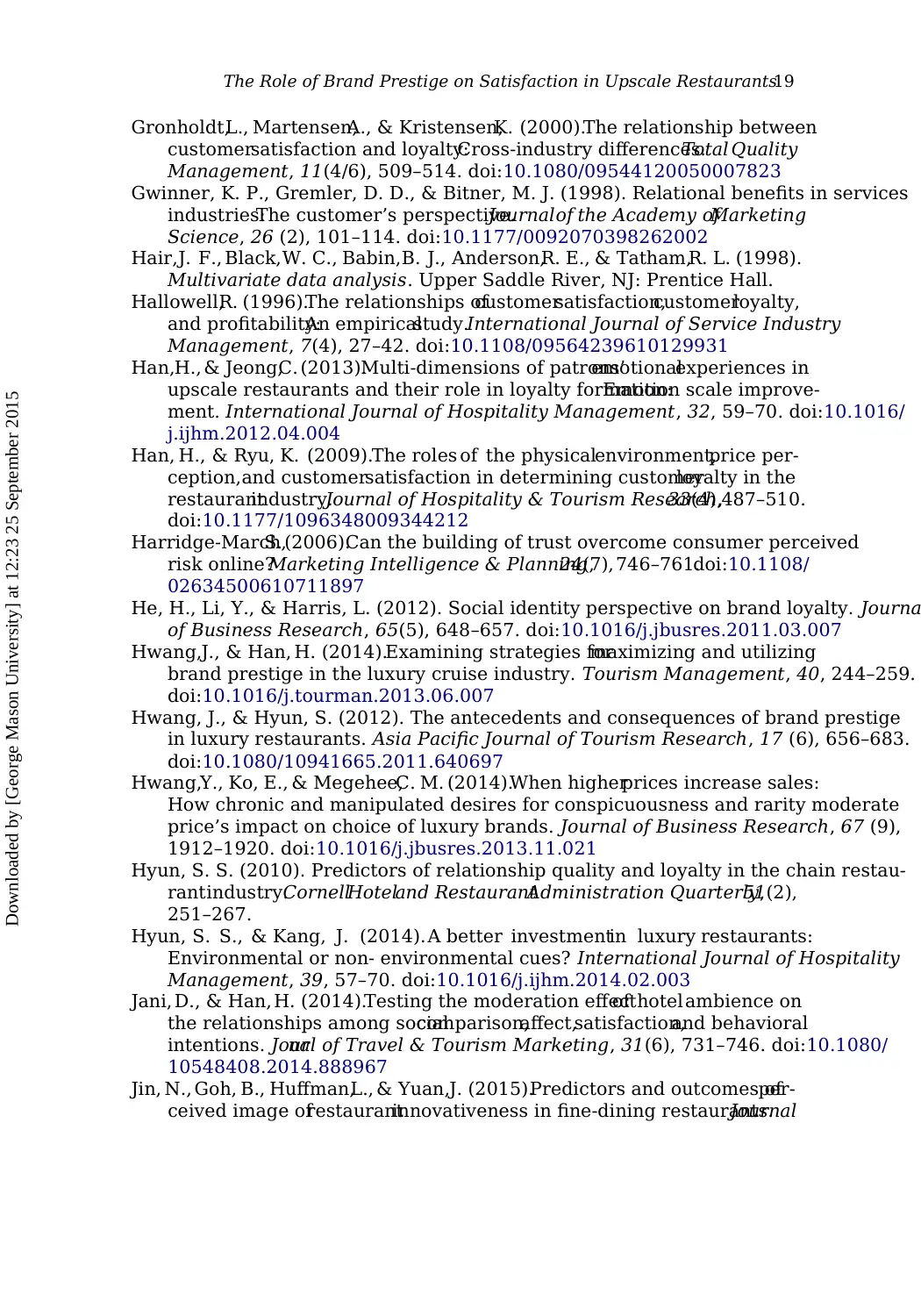
The Role of Brand Prestige on Satisfaction in Upscale Restaurants19
Gronholdt,L., Martensen,A., & Kristensen,K. (2000).The relationship between
customersatisfaction and loyalty:Cross-industry differences.Total Quality
Management, 11(4/6), 509–514. doi:10.1080/09544120050007823
Gwinner, K. P., Gremler, D. D., & Bitner, M. J. (1998). Relational benefits in services
industries:The customer’s perspective.Journalof the Academy ofMarketing
Science, 26 (2), 101–114. doi:10.1177/0092070398262002
Hair,J. F., Black,W. C., Babin,B. J., Anderson,R. E., & Tatham,R. L. (1998).
Multivariate data analysis. Upper Saddle River, NJ: Prentice Hall.
Hallowell,R. (1996).The relationships ofcustomersatisfaction,customerloyalty,
and profitability:An empiricalstudy.International Journal of Service Industry
Management, 7(4), 27–42. doi:10.1108/09564239610129931
Han,H., & Jeong,C. (2013).Multi-dimensions of patrons’emotionalexperiences in
upscale restaurants and their role in loyalty formation:Emotion scale improve-
ment. International Journal of Hospitality Management, 32, 59–70. doi:10.1016/
j.ijhm.2012.04.004
Han, H., & Ryu, K. (2009).The roles of the physicalenvironment,price per-
ception,and customersatisfaction in determining customerloyalty in the
restaurantindustry.Journal of Hospitality & Tourism Research,33(4),487–510.
doi:10.1177/1096348009344212
Harridge-March,S. (2006).Can the building of trust overcome consumer perceived
risk online?Marketing Intelligence & Planning,24(7),746–761.doi:10.1108/
02634500610711897
He, H., Li, Y., & Harris, L. (2012). Social identity perspective on brand loyalty. Journa
of Business Research, 65(5), 648–657. doi:10.1016/j.jbusres.2011.03.007
Hwang,J., & Han, H. (2014).Examining strategies formaximizing and utilizing
brand prestige in the luxury cruise industry. Tourism Management, 40, 244–259.
doi:10.1016/j.tourman.2013.06.007
Hwang, J., & Hyun, S. (2012). The antecedents and consequences of brand prestige
in luxury restaurants. Asia Pacific Journal of Tourism Research, 17 (6), 656–683.
doi:10.1080/10941665.2011.640697
Hwang,Y., Ko, E., & Megehee,C. M. (2014).When higherprices increase sales:
How chronic and manipulated desires for conspicuousness and rarity moderate
price’s impact on choice of luxury brands. Journal of Business Research, 67 (9),
1912–1920. doi:10.1016/j.jbusres.2013.11.021
Hyun, S. S. (2010). Predictors of relationship quality and loyalty in the chain restau-
rantindustry.CornellHoteland RestaurantAdministration Quarterly,51(2),
251–267.
Hyun, S. S., & Kang, J. (2014).A better investmentin luxury restaurants:
Environmental or non- environmental cues? International Journal of Hospitality
Management, 39, 57–70. doi:10.1016/j.ijhm.2014.02.003
Jani, D., & Han, H. (2014).Testing the moderation effectof hotel ambience on
the relationships among socialcomparison,affect,satisfaction,and behavioral
intentions. Journal of Travel & Tourism Marketing, 31(6), 731–746. doi:10.1080/
10548408.2014.888967
Jin, N., Goh, B., Huffman,L., & Yuan,J. (2015).Predictors and outcomes ofper-
ceived image ofrestaurantinnovativeness in fine-dining restaurants.Journal
Downloaded by [George Mason University] at 12:23 25 September 2015
Gronholdt,L., Martensen,A., & Kristensen,K. (2000).The relationship between
customersatisfaction and loyalty:Cross-industry differences.Total Quality
Management, 11(4/6), 509–514. doi:10.1080/09544120050007823
Gwinner, K. P., Gremler, D. D., & Bitner, M. J. (1998). Relational benefits in services
industries:The customer’s perspective.Journalof the Academy ofMarketing
Science, 26 (2), 101–114. doi:10.1177/0092070398262002
Hair,J. F., Black,W. C., Babin,B. J., Anderson,R. E., & Tatham,R. L. (1998).
Multivariate data analysis. Upper Saddle River, NJ: Prentice Hall.
Hallowell,R. (1996).The relationships ofcustomersatisfaction,customerloyalty,
and profitability:An empiricalstudy.International Journal of Service Industry
Management, 7(4), 27–42. doi:10.1108/09564239610129931
Han,H., & Jeong,C. (2013).Multi-dimensions of patrons’emotionalexperiences in
upscale restaurants and their role in loyalty formation:Emotion scale improve-
ment. International Journal of Hospitality Management, 32, 59–70. doi:10.1016/
j.ijhm.2012.04.004
Han, H., & Ryu, K. (2009).The roles of the physicalenvironment,price per-
ception,and customersatisfaction in determining customerloyalty in the
restaurantindustry.Journal of Hospitality & Tourism Research,33(4),487–510.
doi:10.1177/1096348009344212
Harridge-March,S. (2006).Can the building of trust overcome consumer perceived
risk online?Marketing Intelligence & Planning,24(7),746–761.doi:10.1108/
02634500610711897
He, H., Li, Y., & Harris, L. (2012). Social identity perspective on brand loyalty. Journa
of Business Research, 65(5), 648–657. doi:10.1016/j.jbusres.2011.03.007
Hwang,J., & Han, H. (2014).Examining strategies formaximizing and utilizing
brand prestige in the luxury cruise industry. Tourism Management, 40, 244–259.
doi:10.1016/j.tourman.2013.06.007
Hwang, J., & Hyun, S. (2012). The antecedents and consequences of brand prestige
in luxury restaurants. Asia Pacific Journal of Tourism Research, 17 (6), 656–683.
doi:10.1080/10941665.2011.640697
Hwang,Y., Ko, E., & Megehee,C. M. (2014).When higherprices increase sales:
How chronic and manipulated desires for conspicuousness and rarity moderate
price’s impact on choice of luxury brands. Journal of Business Research, 67 (9),
1912–1920. doi:10.1016/j.jbusres.2013.11.021
Hyun, S. S. (2010). Predictors of relationship quality and loyalty in the chain restau-
rantindustry.CornellHoteland RestaurantAdministration Quarterly,51(2),
251–267.
Hyun, S. S., & Kang, J. (2014).A better investmentin luxury restaurants:
Environmental or non- environmental cues? International Journal of Hospitality
Management, 39, 57–70. doi:10.1016/j.ijhm.2014.02.003
Jani, D., & Han, H. (2014).Testing the moderation effectof hotel ambience on
the relationships among socialcomparison,affect,satisfaction,and behavioral
intentions. Journal of Travel & Tourism Marketing, 31(6), 731–746. doi:10.1080/
10548408.2014.888967
Jin, N., Goh, B., Huffman,L., & Yuan,J. (2015).Predictors and outcomes ofper-
ceived image ofrestaurantinnovativeness in fine-dining restaurants.Journal
Downloaded by [George Mason University] at 12:23 25 September 2015
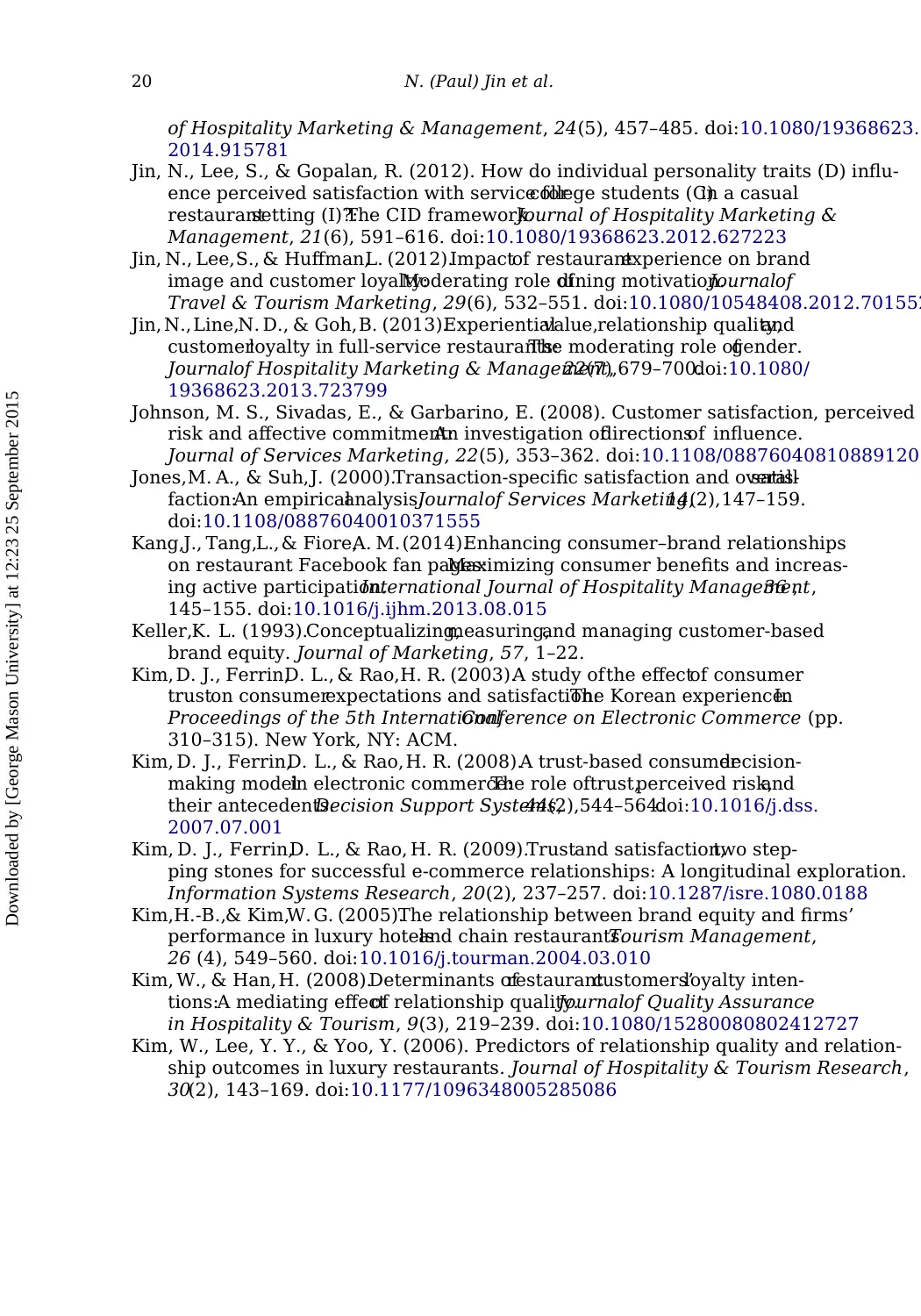
20 N. (Paul) Jin et al.
of Hospitality Marketing & Management, 24(5), 457–485. doi:10.1080/19368623.
2014.915781
Jin, N., Lee, S., & Gopalan, R. (2012). How do individual personality traits (D) influ-
ence perceived satisfaction with service forcollege students (C)in a casual
restaurantsetting (I)?:The CID framework.Journal of Hospitality Marketing &
Management, 21(6), 591–616. doi:10.1080/19368623.2012.627223
Jin, N., Lee,S., & Huffman,L. (2012).Impactof restaurantexperience on brand
image and customer loyalty:Moderating role ofdining motivation.Journalof
Travel & Tourism Marketing, 29(6), 532–551. doi:10.1080/10548408.2012.701552
Jin, N.,Line,N. D., & Goh,B. (2013).Experientialvalue,relationship quality,and
customerloyalty in full-service restaurants:The moderating role ofgender.
Journalof Hospitality Marketing & Management,22(7),679–700.doi:10.1080/
19368623.2013.723799
Johnson, M. S., Sivadas, E., & Garbarino, E. (2008). Customer satisfaction, perceived
risk and affective commitment:An investigation ofdirectionsof influence.
Journal of Services Marketing, 22(5), 353–362. doi:10.1108/08876040810889120
Jones,M. A., & Suh,J. (2000).Transaction-specific satisfaction and overallsatis-
faction:An empiricalanalysis.Journalof Services Marketing,14(2),147–159.
doi:10.1108/08876040010371555
Kang,J., Tang,L.,& Fiore,A. M. (2014).Enhancing consumer–brand relationships
on restaurant Facebook fan pages:Maximizing consumer benefits and increas-
ing active participation.International Journal of Hospitality Management,36 ,
145–155. doi:10.1016/j.ijhm.2013.08.015
Keller,K. L. (1993).Conceptualizing,measuring,and managing customer-based
brand equity. Journal of Marketing, 57, 1–22.
Kim, D. J., Ferrin,D. L., & Rao,H. R. (2003).A study ofthe effectof consumer
truston consumerexpectations and satisfaction:The Korean experience.In
Proceedings of the 5th InternationalConference on Electronic Commerce (pp.
310–315). New York, NY: ACM.
Kim, D. J., Ferrin,D. L., & Rao,H. R. (2008).A trust-based consumerdecision-
making modelin electronic commerce:The role oftrust,perceived risk,and
their antecedents.Decision Support Systems,44(2),544–564.doi:10.1016/j.dss.
2007.07.001
Kim, D. J., Ferrin,D. L., & Rao, H. R. (2009).Trustand satisfaction,two step-
ping stones for successful e-commerce relationships: A longitudinal exploration.
Information Systems Research, 20(2), 237–257. doi:10.1287/isre.1080.0188
Kim,H.-B.,& Kim,W. G. (2005).The relationship between brand equity and firms’
performance in luxury hotelsand chain restaurants.Tourism Management,
26 (4), 549–560. doi:10.1016/j.tourman.2004.03.010
Kim, W., & Han, H. (2008).Determinants ofrestaurantcustomers’loyalty inten-
tions:A mediating effectof relationship quality.Journalof Quality Assurance
in Hospitality & Tourism, 9(3), 219–239. doi:10.1080/15280080802412727
Kim, W., Lee, Y. Y., & Yoo, Y. (2006). Predictors of relationship quality and relation-
ship outcomes in luxury restaurants. Journal of Hospitality & Tourism Research,
30(2), 143–169. doi:10.1177/1096348005285086
Downloaded by [George Mason University] at 12:23 25 September 2015
of Hospitality Marketing & Management, 24(5), 457–485. doi:10.1080/19368623.
2014.915781
Jin, N., Lee, S., & Gopalan, R. (2012). How do individual personality traits (D) influ-
ence perceived satisfaction with service forcollege students (C)in a casual
restaurantsetting (I)?:The CID framework.Journal of Hospitality Marketing &
Management, 21(6), 591–616. doi:10.1080/19368623.2012.627223
Jin, N., Lee,S., & Huffman,L. (2012).Impactof restaurantexperience on brand
image and customer loyalty:Moderating role ofdining motivation.Journalof
Travel & Tourism Marketing, 29(6), 532–551. doi:10.1080/10548408.2012.701552
Jin, N.,Line,N. D., & Goh,B. (2013).Experientialvalue,relationship quality,and
customerloyalty in full-service restaurants:The moderating role ofgender.
Journalof Hospitality Marketing & Management,22(7),679–700.doi:10.1080/
19368623.2013.723799
Johnson, M. S., Sivadas, E., & Garbarino, E. (2008). Customer satisfaction, perceived
risk and affective commitment:An investigation ofdirectionsof influence.
Journal of Services Marketing, 22(5), 353–362. doi:10.1108/08876040810889120
Jones,M. A., & Suh,J. (2000).Transaction-specific satisfaction and overallsatis-
faction:An empiricalanalysis.Journalof Services Marketing,14(2),147–159.
doi:10.1108/08876040010371555
Kang,J., Tang,L.,& Fiore,A. M. (2014).Enhancing consumer–brand relationships
on restaurant Facebook fan pages:Maximizing consumer benefits and increas-
ing active participation.International Journal of Hospitality Management,36 ,
145–155. doi:10.1016/j.ijhm.2013.08.015
Keller,K. L. (1993).Conceptualizing,measuring,and managing customer-based
brand equity. Journal of Marketing, 57, 1–22.
Kim, D. J., Ferrin,D. L., & Rao,H. R. (2003).A study ofthe effectof consumer
truston consumerexpectations and satisfaction:The Korean experience.In
Proceedings of the 5th InternationalConference on Electronic Commerce (pp.
310–315). New York, NY: ACM.
Kim, D. J., Ferrin,D. L., & Rao,H. R. (2008).A trust-based consumerdecision-
making modelin electronic commerce:The role oftrust,perceived risk,and
their antecedents.Decision Support Systems,44(2),544–564.doi:10.1016/j.dss.
2007.07.001
Kim, D. J., Ferrin,D. L., & Rao, H. R. (2009).Trustand satisfaction,two step-
ping stones for successful e-commerce relationships: A longitudinal exploration.
Information Systems Research, 20(2), 237–257. doi:10.1287/isre.1080.0188
Kim,H.-B.,& Kim,W. G. (2005).The relationship between brand equity and firms’
performance in luxury hotelsand chain restaurants.Tourism Management,
26 (4), 549–560. doi:10.1016/j.tourman.2004.03.010
Kim, W., & Han, H. (2008).Determinants ofrestaurantcustomers’loyalty inten-
tions:A mediating effectof relationship quality.Journalof Quality Assurance
in Hospitality & Tourism, 9(3), 219–239. doi:10.1080/15280080802412727
Kim, W., Lee, Y. Y., & Yoo, Y. (2006). Predictors of relationship quality and relation-
ship outcomes in luxury restaurants. Journal of Hospitality & Tourism Research,
30(2), 143–169. doi:10.1177/1096348005285086
Downloaded by [George Mason University] at 12:23 25 September 2015
Paraphrase This Document
Need a fresh take? Get an instant paraphrase of this document with our AI Paraphraser
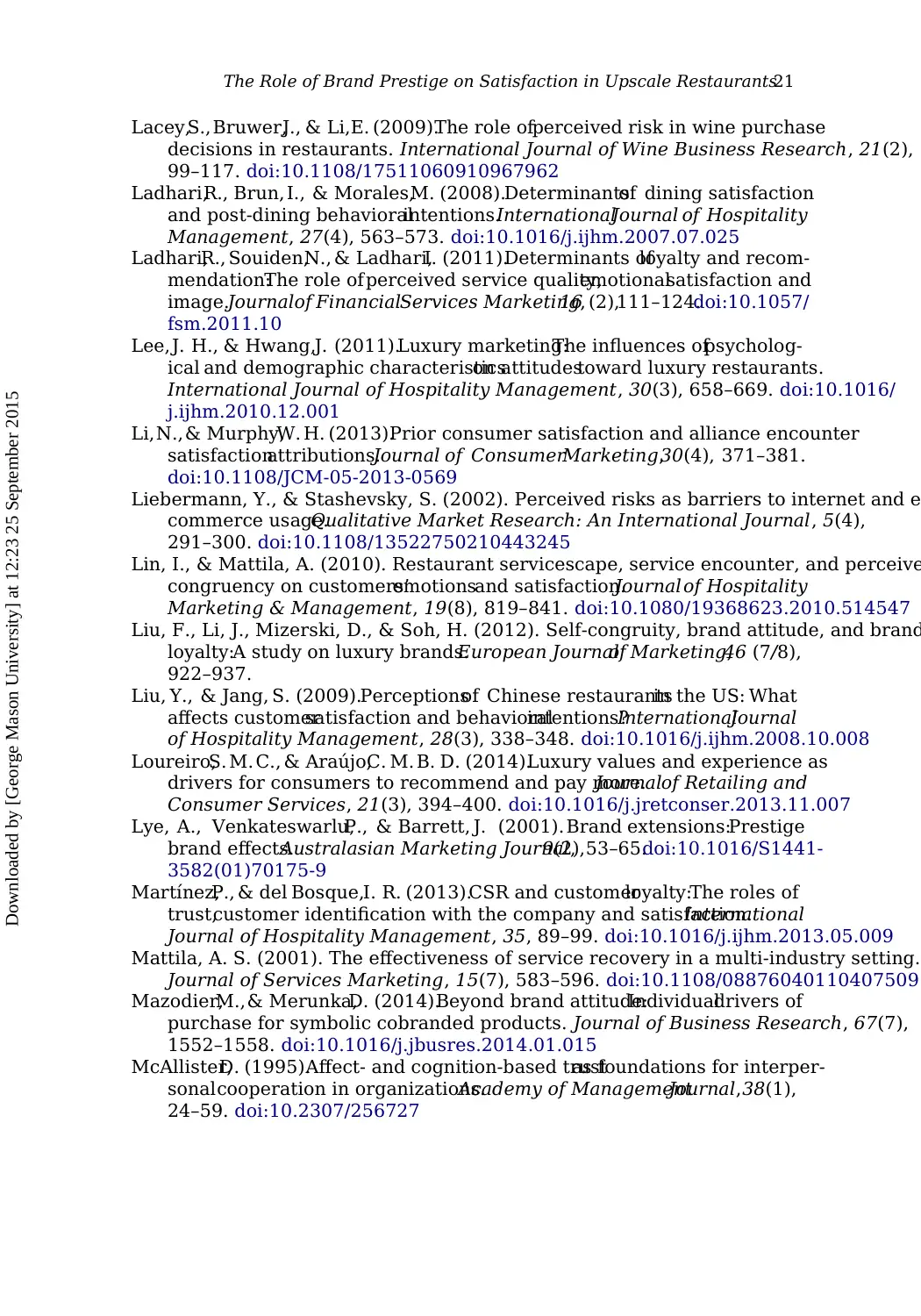
The Role of Brand Prestige on Satisfaction in Upscale Restaurants21
Lacey,S.,Bruwer,J., & Li,E. (2009).The role ofperceived risk in wine purchase
decisions in restaurants. International Journal of Wine Business Research, 21(2),
99–117. doi:10.1108/17511060910967962
Ladhari,R., Brun, I., & Morales,M. (2008).Determinantsof dining satisfaction
and post-dining behavioralintentions.InternationalJournal of Hospitality
Management, 27(4), 563–573. doi:10.1016/j.ijhm.2007.07.025
Ladhari,R., Souiden,N., & Ladhari,I. (2011).Determinants ofloyalty and recom-
mendation:The role ofperceived service quality,emotionalsatisfaction and
image.Journalof FinancialServices Marketing,16 (2),111–124.doi:10.1057/
fsm.2011.10
Lee,J. H., & Hwang,J. (2011).Luxury marketing:The influences ofpsycholog-
ical and demographic characteristicson attitudestoward luxury restaurants.
International Journal of Hospitality Management, 30(3), 658–669. doi:10.1016/
j.ijhm.2010.12.001
Li,N.,& Murphy,W. H. (2013).Prior consumer satisfaction and alliance encounter
satisfactionattributions.Journal of ConsumerMarketing,30(4), 371–381.
doi:10.1108/JCM-05-2013-0569
Liebermann, Y., & Stashevsky, S. (2002). Perceived risks as barriers to internet and e
commerce usage.Qualitative Market Research: An International Journal, 5(4),
291–300. doi:10.1108/13522750210443245
Lin, I., & Mattila, A. (2010). Restaurant servicescape, service encounter, and perceive
congruency on customers’emotionsand satisfaction.Journal of Hospitality
Marketing & Management, 19(8), 819–841. doi:10.1080/19368623.2010.514547
Liu, F., Li, J., Mizerski, D., & Soh, H. (2012). Self-congruity, brand attitude, and brand
loyalty:A study on luxury brands.European Journalof Marketing,46 (7/8),
922–937.
Liu, Y., & Jang, S. (2009).Perceptionsof Chinese restaurantsin the US: What
affects customersatisfaction and behavioralintentions?InternationalJournal
of Hospitality Management, 28(3), 338–348. doi:10.1016/j.ijhm.2008.10.008
Loureiro,S. M. C., & Araújo,C. M. B. D. (2014).Luxury values and experience as
drivers for consumers to recommend and pay more.Journalof Retailing and
Consumer Services, 21(3), 394–400. doi:10.1016/j.jretconser.2013.11.007
Lye, A., Venkateswarlu,P., & Barrett, J. (2001). Brand extensions:Prestige
brand effects.Australasian Marketing Journal,9(2),53–65.doi:10.1016/S1441-
3582(01)70175-9
Martínez,P., & del Bosque,I. R. (2013).CSR and customerloyalty:The roles of
trust,customer identification with the company and satisfaction.International
Journal of Hospitality Management, 35, 89–99. doi:10.1016/j.ijhm.2013.05.009
Mattila, A. S. (2001). The effectiveness of service recovery in a multi-industry setting.
Journal of Services Marketing, 15(7), 583–596. doi:10.1108/08876040110407509
Mazodier,M.,& Merunka,D. (2014).Beyond brand attitude:Individualdrivers of
purchase for symbolic cobranded products. Journal of Business Research, 67(7),
1552–1558. doi:10.1016/j.jbusres.2014.01.015
McAllister,D. (1995).Affect- and cognition-based trustas foundations for interper-
sonalcooperation in organizations.Academy of ManagementJournal,38(1),
24–59. doi:10.2307/256727
Downloaded by [George Mason University] at 12:23 25 September 2015
Lacey,S.,Bruwer,J., & Li,E. (2009).The role ofperceived risk in wine purchase
decisions in restaurants. International Journal of Wine Business Research, 21(2),
99–117. doi:10.1108/17511060910967962
Ladhari,R., Brun, I., & Morales,M. (2008).Determinantsof dining satisfaction
and post-dining behavioralintentions.InternationalJournal of Hospitality
Management, 27(4), 563–573. doi:10.1016/j.ijhm.2007.07.025
Ladhari,R., Souiden,N., & Ladhari,I. (2011).Determinants ofloyalty and recom-
mendation:The role ofperceived service quality,emotionalsatisfaction and
image.Journalof FinancialServices Marketing,16 (2),111–124.doi:10.1057/
fsm.2011.10
Lee,J. H., & Hwang,J. (2011).Luxury marketing:The influences ofpsycholog-
ical and demographic characteristicson attitudestoward luxury restaurants.
International Journal of Hospitality Management, 30(3), 658–669. doi:10.1016/
j.ijhm.2010.12.001
Li,N.,& Murphy,W. H. (2013).Prior consumer satisfaction and alliance encounter
satisfactionattributions.Journal of ConsumerMarketing,30(4), 371–381.
doi:10.1108/JCM-05-2013-0569
Liebermann, Y., & Stashevsky, S. (2002). Perceived risks as barriers to internet and e
commerce usage.Qualitative Market Research: An International Journal, 5(4),
291–300. doi:10.1108/13522750210443245
Lin, I., & Mattila, A. (2010). Restaurant servicescape, service encounter, and perceive
congruency on customers’emotionsand satisfaction.Journal of Hospitality
Marketing & Management, 19(8), 819–841. doi:10.1080/19368623.2010.514547
Liu, F., Li, J., Mizerski, D., & Soh, H. (2012). Self-congruity, brand attitude, and brand
loyalty:A study on luxury brands.European Journalof Marketing,46 (7/8),
922–937.
Liu, Y., & Jang, S. (2009).Perceptionsof Chinese restaurantsin the US: What
affects customersatisfaction and behavioralintentions?InternationalJournal
of Hospitality Management, 28(3), 338–348. doi:10.1016/j.ijhm.2008.10.008
Loureiro,S. M. C., & Araújo,C. M. B. D. (2014).Luxury values and experience as
drivers for consumers to recommend and pay more.Journalof Retailing and
Consumer Services, 21(3), 394–400. doi:10.1016/j.jretconser.2013.11.007
Lye, A., Venkateswarlu,P., & Barrett, J. (2001). Brand extensions:Prestige
brand effects.Australasian Marketing Journal,9(2),53–65.doi:10.1016/S1441-
3582(01)70175-9
Martínez,P., & del Bosque,I. R. (2013).CSR and customerloyalty:The roles of
trust,customer identification with the company and satisfaction.International
Journal of Hospitality Management, 35, 89–99. doi:10.1016/j.ijhm.2013.05.009
Mattila, A. S. (2001). The effectiveness of service recovery in a multi-industry setting.
Journal of Services Marketing, 15(7), 583–596. doi:10.1108/08876040110407509
Mazodier,M.,& Merunka,D. (2014).Beyond brand attitude:Individualdrivers of
purchase for symbolic cobranded products. Journal of Business Research, 67(7),
1552–1558. doi:10.1016/j.jbusres.2014.01.015
McAllister,D. (1995).Affect- and cognition-based trustas foundations for interper-
sonalcooperation in organizations.Academy of ManagementJournal,38(1),
24–59. doi:10.2307/256727
Downloaded by [George Mason University] at 12:23 25 September 2015
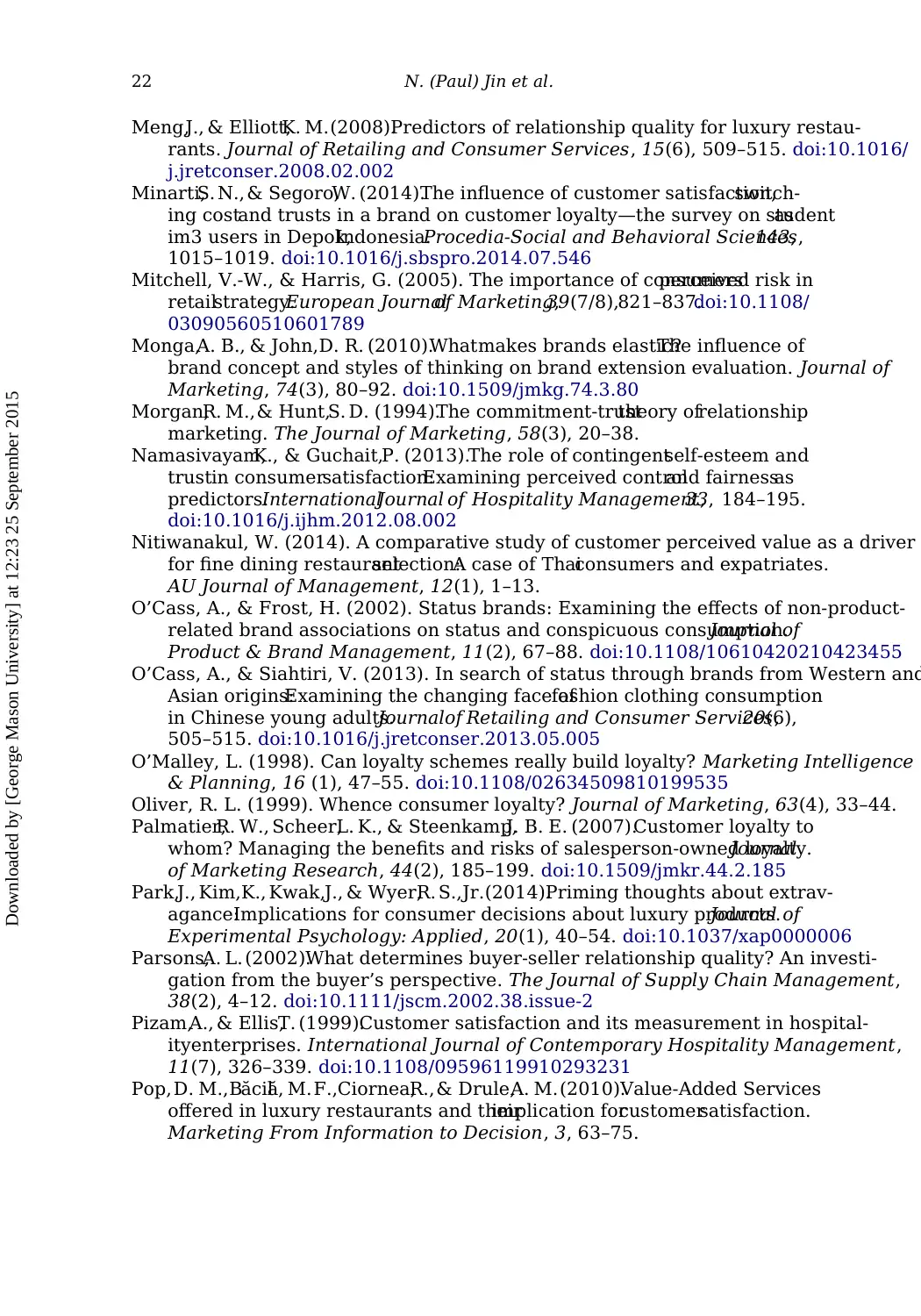
22 N. (Paul) Jin et al.
Meng,J., & Elliott,K. M.(2008).Predictors of relationship quality for luxury restau-
rants. Journal of Retailing and Consumer Services, 15(6), 509–515. doi:10.1016/
j.jretconser.2008.02.002
Minarti,S. N.,& Segoro,W. (2014).The influence of customer satisfaction,switch-
ing costand trusts in a brand on customer loyalty—the survey on studentas
im3 users in Depok,Indonesia.Procedia-Social and Behavioral Sciences,143,
1015–1019. doi:10.1016/j.sbspro.2014.07.546
Mitchell, V.-W., & Harris, G. (2005). The importance of consumers’perceived risk in
retailstrategy.European Journalof Marketing,39(7/8),821–837.doi:10.1108/
03090560510601789
Monga,A. B., & John,D. R. (2010).Whatmakes brands elastic?The influence of
brand concept and styles of thinking on brand extension evaluation. Journal of
Marketing, 74(3), 80–92. doi:10.1509/jmkg.74.3.80
Morgan,R. M.,& Hunt,S. D. (1994).The commitment-trusttheory ofrelationship
marketing. The Journal of Marketing, 58(3), 20–38.
Namasivayam,K., & Guchait,P. (2013).The role of contingentself-esteem and
trustin consumersatisfaction:Examining perceived controland fairnessas
predictors.InternationalJournal of Hospitality Management,33, 184–195.
doi:10.1016/j.ijhm.2012.08.002
Nitiwanakul, W. (2014). A comparative study of customer perceived value as a driver
for fine dining restaurantselection:A case of Thaiconsumers and expatriates.
AU Journal of Management, 12(1), 1–13.
O’Cass, A., & Frost, H. (2002). Status brands: Examining the effects of non-product-
related brand associations on status and conspicuous consumption.Journal of
Product & Brand Management, 11(2), 67–88. doi:10.1108/10610420210423455
O’Cass, A., & Siahtiri, V. (2013). In search of status through brands from Western and
Asian origins:Examining the changing face offashion clothing consumption
in Chinese young adults.Journalof Retailing and Consumer Services,20(6),
505–515. doi:10.1016/j.jretconser.2013.05.005
O’Malley, L. (1998). Can loyalty schemes really build loyalty? Marketing Intelligence
& Planning, 16 (1), 47–55. doi:10.1108/02634509810199535
Oliver, R. L. (1999). Whence consumer loyalty? Journal of Marketing, 63(4), 33–44.
Palmatier,R. W., Scheer,L. K., & Steenkamp,J. B. E. (2007).Customer loyalty to
whom? Managing the benefits and risks of salesperson-owned loyalty.Journal
of Marketing Research, 44(2), 185–199. doi:10.1509/jmkr.44.2.185
Park,J., Kim,K., Kwak,J., & Wyer,R. S.,Jr.(2014).Priming thoughts about extrav-
agance:Implications for consumer decisions about luxury products.Journal of
Experimental Psychology: Applied, 20(1), 40–54. doi:10.1037/xap0000006
Parsons,A. L. (2002).What determines buyer-seller relationship quality? An investi-
gation from the buyer’s perspective. The Journal of Supply Chain Management,
38(2), 4–12. doi:10.1111/jscm.2002.38.issue-2
Pizam,A., & Ellis,T. (1999).Customer satisfaction and its measurement in hospital-
ityenterprises. International Journal of Contemporary Hospitality Management,
11(7), 326–339. doi:10.1108/09596119910293231
Pop,D. M.,B˘acil˘a, M.F.,Ciornea,R.,& Drule,A. M.(2010).Value-Added Services
offered in luxury restaurants and theirimplication forcustomersatisfaction.
Marketing From Information to Decision, 3, 63–75.
Downloaded by [George Mason University] at 12:23 25 September 2015
Meng,J., & Elliott,K. M.(2008).Predictors of relationship quality for luxury restau-
rants. Journal of Retailing and Consumer Services, 15(6), 509–515. doi:10.1016/
j.jretconser.2008.02.002
Minarti,S. N.,& Segoro,W. (2014).The influence of customer satisfaction,switch-
ing costand trusts in a brand on customer loyalty—the survey on studentas
im3 users in Depok,Indonesia.Procedia-Social and Behavioral Sciences,143,
1015–1019. doi:10.1016/j.sbspro.2014.07.546
Mitchell, V.-W., & Harris, G. (2005). The importance of consumers’perceived risk in
retailstrategy.European Journalof Marketing,39(7/8),821–837.doi:10.1108/
03090560510601789
Monga,A. B., & John,D. R. (2010).Whatmakes brands elastic?The influence of
brand concept and styles of thinking on brand extension evaluation. Journal of
Marketing, 74(3), 80–92. doi:10.1509/jmkg.74.3.80
Morgan,R. M.,& Hunt,S. D. (1994).The commitment-trusttheory ofrelationship
marketing. The Journal of Marketing, 58(3), 20–38.
Namasivayam,K., & Guchait,P. (2013).The role of contingentself-esteem and
trustin consumersatisfaction:Examining perceived controland fairnessas
predictors.InternationalJournal of Hospitality Management,33, 184–195.
doi:10.1016/j.ijhm.2012.08.002
Nitiwanakul, W. (2014). A comparative study of customer perceived value as a driver
for fine dining restaurantselection:A case of Thaiconsumers and expatriates.
AU Journal of Management, 12(1), 1–13.
O’Cass, A., & Frost, H. (2002). Status brands: Examining the effects of non-product-
related brand associations on status and conspicuous consumption.Journal of
Product & Brand Management, 11(2), 67–88. doi:10.1108/10610420210423455
O’Cass, A., & Siahtiri, V. (2013). In search of status through brands from Western and
Asian origins:Examining the changing face offashion clothing consumption
in Chinese young adults.Journalof Retailing and Consumer Services,20(6),
505–515. doi:10.1016/j.jretconser.2013.05.005
O’Malley, L. (1998). Can loyalty schemes really build loyalty? Marketing Intelligence
& Planning, 16 (1), 47–55. doi:10.1108/02634509810199535
Oliver, R. L. (1999). Whence consumer loyalty? Journal of Marketing, 63(4), 33–44.
Palmatier,R. W., Scheer,L. K., & Steenkamp,J. B. E. (2007).Customer loyalty to
whom? Managing the benefits and risks of salesperson-owned loyalty.Journal
of Marketing Research, 44(2), 185–199. doi:10.1509/jmkr.44.2.185
Park,J., Kim,K., Kwak,J., & Wyer,R. S.,Jr.(2014).Priming thoughts about extrav-
agance:Implications for consumer decisions about luxury products.Journal of
Experimental Psychology: Applied, 20(1), 40–54. doi:10.1037/xap0000006
Parsons,A. L. (2002).What determines buyer-seller relationship quality? An investi-
gation from the buyer’s perspective. The Journal of Supply Chain Management,
38(2), 4–12. doi:10.1111/jscm.2002.38.issue-2
Pizam,A., & Ellis,T. (1999).Customer satisfaction and its measurement in hospital-
ityenterprises. International Journal of Contemporary Hospitality Management,
11(7), 326–339. doi:10.1108/09596119910293231
Pop,D. M.,B˘acil˘a, M.F.,Ciornea,R.,& Drule,A. M.(2010).Value-Added Services
offered in luxury restaurants and theirimplication forcustomersatisfaction.
Marketing From Information to Decision, 3, 63–75.
Downloaded by [George Mason University] at 12:23 25 September 2015
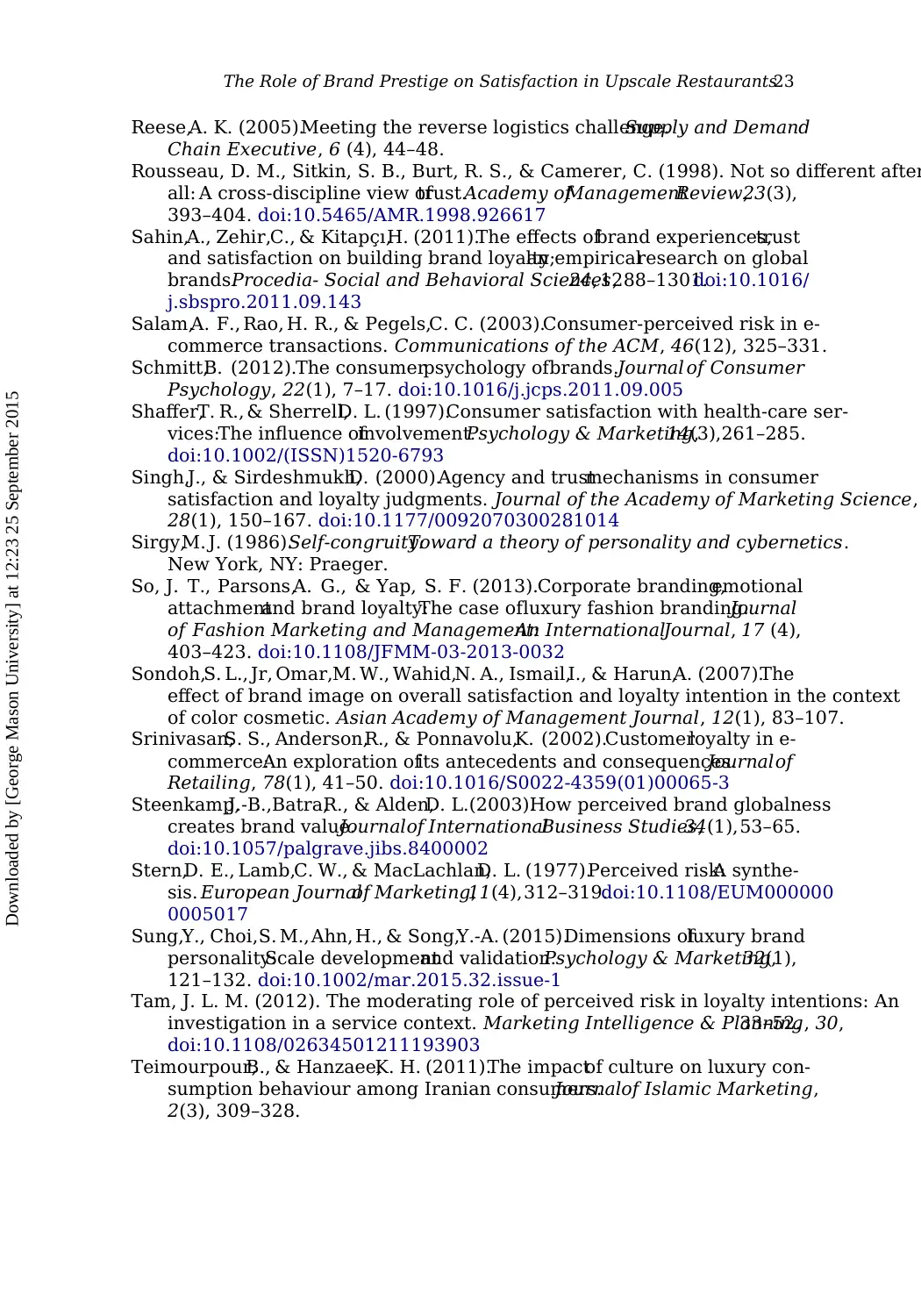
The Role of Brand Prestige on Satisfaction in Upscale Restaurants23
Reese,A. K. (2005).Meeting the reverse logistics challenge.Supply and Demand
Chain Executive, 6 (4), 44–48.
Rousseau, D. M., Sitkin, S. B., Burt, R. S., & Camerer, C. (1998). Not so different after
all: A cross-discipline view oftrust.Academy ofManagementReview,23(3),
393–404. doi:10.5465/AMR.1998.926617
Sahin,A., Zehir,C., & Kitapçı,H. (2011).The effects ofbrand experiences,trust
and satisfaction on building brand loyalty;an empiricalresearch on global
brands.Procedia- Social and Behavioral Sciences,24, 1288–1301.doi:10.1016/
j.sbspro.2011.09.143
Salam,A. F., Rao, H. R., & Pegels,C. C. (2003).Consumer-perceived risk in e-
commerce transactions. Communications of the ACM, 46(12), 325–331.
Schmitt,B. (2012).The consumerpsychology ofbrands.Journal of Consumer
Psychology, 22(1), 7–17. doi:10.1016/j.jcps.2011.09.005
Shaffer,T. R., & Sherrell,D. L. (1997).Consumer satisfaction with health-care ser-
vices:The influence ofinvolvement.Psychology & Marketing,14(3),261–285.
doi:10.1002/(ISSN)1520-6793
Singh,J., & Sirdeshmukh,D. (2000).Agency and trustmechanisms in consumer
satisfaction and loyalty judgments. Journal of the Academy of Marketing Science,
28(1), 150–167. doi:10.1177/0092070300281014
Sirgy,M. J. (1986).Self-congruity:Toward a theory of personality and cybernetics.
New York, NY: Praeger.
So, J. T., Parsons,A. G., & Yap, S. F. (2013).Corporate branding,emotional
attachmentand brand loyalty:The case ofluxury fashion branding.Journal
of Fashion Marketing and Management:An InternationalJournal, 17 (4),
403–423. doi:10.1108/JFMM-03-2013-0032
Sondoh,S. L., Jr, Omar,M. W., Wahid,N. A., Ismail,I., & Harun,A. (2007).The
effect of brand image on overall satisfaction and loyalty intention in the context
of color cosmetic. Asian Academy of Management Journal, 12(1), 83–107.
Srinivasan,S. S., Anderson,R., & Ponnavolu,K. (2002).Customerloyalty in e-
commerce:An exploration ofits antecedents and consequences.Journalof
Retailing, 78(1), 41–50. doi:10.1016/S0022-4359(01)00065-3
Steenkamp,J.-B.,Batra,R., & Alden,D. L.(2003).How perceived brand globalness
creates brand value.Journalof InternationalBusiness Studies,34(1),53–65.
doi:10.1057/palgrave.jibs.8400002
Stern,D. E., Lamb,C. W., & MacLachlan,D. L. (1977).Perceived risk:A synthe-
sis. European Journalof Marketing,11(4),312–319.doi:10.1108/EUM000000
0005017
Sung,Y., Choi,S. M.,Ahn, H., & Song,Y.-A. (2015).Dimensions ofluxury brand
personality:Scale developmentand validation.Psychology & Marketing,32(1),
121–132. doi:10.1002/mar.2015.32.issue-1
Tam, J. L. M. (2012). The moderating role of perceived risk in loyalty intentions: An
investigation in a service context. Marketing Intelligence & Planning, 30,33–52.
doi:10.1108/02634501211193903
Teimourpour,B., & Hanzaee,K. H. (2011).The impactof culture on luxury con-
sumption behaviour among Iranian consumers.Journalof Islamic Marketing,
2(3), 309–328.
Downloaded by [George Mason University] at 12:23 25 September 2015
Reese,A. K. (2005).Meeting the reverse logistics challenge.Supply and Demand
Chain Executive, 6 (4), 44–48.
Rousseau, D. M., Sitkin, S. B., Burt, R. S., & Camerer, C. (1998). Not so different after
all: A cross-discipline view oftrust.Academy ofManagementReview,23(3),
393–404. doi:10.5465/AMR.1998.926617
Sahin,A., Zehir,C., & Kitapçı,H. (2011).The effects ofbrand experiences,trust
and satisfaction on building brand loyalty;an empiricalresearch on global
brands.Procedia- Social and Behavioral Sciences,24, 1288–1301.doi:10.1016/
j.sbspro.2011.09.143
Salam,A. F., Rao, H. R., & Pegels,C. C. (2003).Consumer-perceived risk in e-
commerce transactions. Communications of the ACM, 46(12), 325–331.
Schmitt,B. (2012).The consumerpsychology ofbrands.Journal of Consumer
Psychology, 22(1), 7–17. doi:10.1016/j.jcps.2011.09.005
Shaffer,T. R., & Sherrell,D. L. (1997).Consumer satisfaction with health-care ser-
vices:The influence ofinvolvement.Psychology & Marketing,14(3),261–285.
doi:10.1002/(ISSN)1520-6793
Singh,J., & Sirdeshmukh,D. (2000).Agency and trustmechanisms in consumer
satisfaction and loyalty judgments. Journal of the Academy of Marketing Science,
28(1), 150–167. doi:10.1177/0092070300281014
Sirgy,M. J. (1986).Self-congruity:Toward a theory of personality and cybernetics.
New York, NY: Praeger.
So, J. T., Parsons,A. G., & Yap, S. F. (2013).Corporate branding,emotional
attachmentand brand loyalty:The case ofluxury fashion branding.Journal
of Fashion Marketing and Management:An InternationalJournal, 17 (4),
403–423. doi:10.1108/JFMM-03-2013-0032
Sondoh,S. L., Jr, Omar,M. W., Wahid,N. A., Ismail,I., & Harun,A. (2007).The
effect of brand image on overall satisfaction and loyalty intention in the context
of color cosmetic. Asian Academy of Management Journal, 12(1), 83–107.
Srinivasan,S. S., Anderson,R., & Ponnavolu,K. (2002).Customerloyalty in e-
commerce:An exploration ofits antecedents and consequences.Journalof
Retailing, 78(1), 41–50. doi:10.1016/S0022-4359(01)00065-3
Steenkamp,J.-B.,Batra,R., & Alden,D. L.(2003).How perceived brand globalness
creates brand value.Journalof InternationalBusiness Studies,34(1),53–65.
doi:10.1057/palgrave.jibs.8400002
Stern,D. E., Lamb,C. W., & MacLachlan,D. L. (1977).Perceived risk:A synthe-
sis. European Journalof Marketing,11(4),312–319.doi:10.1108/EUM000000
0005017
Sung,Y., Choi,S. M.,Ahn, H., & Song,Y.-A. (2015).Dimensions ofluxury brand
personality:Scale developmentand validation.Psychology & Marketing,32(1),
121–132. doi:10.1002/mar.2015.32.issue-1
Tam, J. L. M. (2012). The moderating role of perceived risk in loyalty intentions: An
investigation in a service context. Marketing Intelligence & Planning, 30,33–52.
doi:10.1108/02634501211193903
Teimourpour,B., & Hanzaee,K. H. (2011).The impactof culture on luxury con-
sumption behaviour among Iranian consumers.Journalof Islamic Marketing,
2(3), 309–328.
Downloaded by [George Mason University] at 12:23 25 September 2015
Secure Best Marks with AI Grader
Need help grading? Try our AI Grader for instant feedback on your assignments.
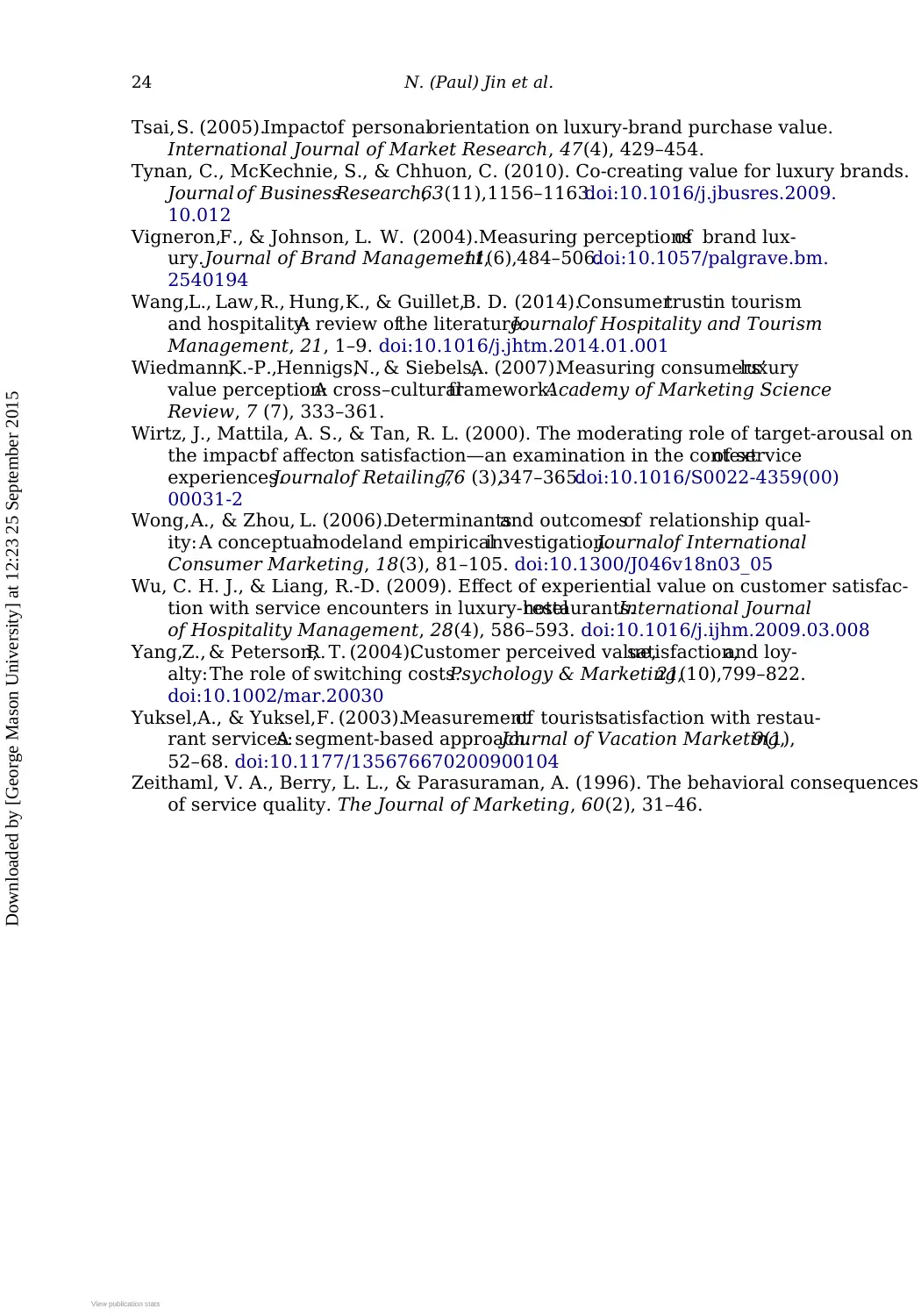
24 N. (Paul) Jin et al.
Tsai,S. (2005).Impactof personalorientation on luxury-brand purchase value.
International Journal of Market Research, 47(4), 429–454.
Tynan, C., McKechnie, S., & Chhuon, C. (2010). Co-creating value for luxury brands.
Journal of BusinessResearch,63(11),1156–1163.doi:10.1016/j.jbusres.2009.
10.012
Vigneron,F., & Johnson, L. W. (2004).Measuring perceptionsof brand lux-
ury.Journal of Brand Management,11(6),484–506.doi:10.1057/palgrave.bm.
2540194
Wang,L., Law,R., Hung,K., & Guillet,B. D. (2014).Consumertrustin tourism
and hospitality:A review ofthe literature.Journalof Hospitality and Tourism
Management, 21, 1–9. doi:10.1016/j.jhtm.2014.01.001
Wiedmann,K.-P.,Hennigs,N., & Siebels,A. (2007).Measuring consumers’luxury
value perception:A cross–culturalframework.Academy of Marketing Science
Review, 7 (7), 333–361.
Wirtz, J., Mattila, A. S., & Tan, R. L. (2000). The moderating role of target-arousal on
the impactof affecton satisfaction—an examination in the contextof service
experiences.Journalof Retailing,76 (3),347–365.doi:10.1016/S0022-4359(00)
00031-2
Wong,A., & Zhou, L. (2006).Determinantsand outcomesof relationship qual-
ity: A conceptualmodeland empiricalinvestigation.Journalof International
Consumer Marketing, 18(3), 81–105. doi:10.1300/J046v18n03_05
Wu, C. H. J., & Liang, R.-D. (2009). Effect of experiential value on customer satisfac-
tion with service encounters in luxury-hotelrestaurants.International Journal
of Hospitality Management, 28(4), 586–593. doi:10.1016/j.ijhm.2009.03.008
Yang,Z., & Peterson,R. T. (2004).Customer perceived value,satisfaction,and loy-
alty:The role of switching costs.Psychology & Marketing,21(10),799–822.
doi:10.1002/mar.20030
Yuksel,A., & Yuksel,F. (2003).Measurementof touristsatisfaction with restau-
rant services:A segment-based approach.Journal of Vacation Marketing,9(1),
52–68. doi:10.1177/135676670200900104
Zeithaml, V. A., Berry, L. L., & Parasuraman, A. (1996). The behavioral consequences
of service quality. The Journal of Marketing, 60(2), 31–46.
Downloaded by [George Mason University] at 12:23 25 September 2015
View publication statsView publication stats
Tsai,S. (2005).Impactof personalorientation on luxury-brand purchase value.
International Journal of Market Research, 47(4), 429–454.
Tynan, C., McKechnie, S., & Chhuon, C. (2010). Co-creating value for luxury brands.
Journal of BusinessResearch,63(11),1156–1163.doi:10.1016/j.jbusres.2009.
10.012
Vigneron,F., & Johnson, L. W. (2004).Measuring perceptionsof brand lux-
ury.Journal of Brand Management,11(6),484–506.doi:10.1057/palgrave.bm.
2540194
Wang,L., Law,R., Hung,K., & Guillet,B. D. (2014).Consumertrustin tourism
and hospitality:A review ofthe literature.Journalof Hospitality and Tourism
Management, 21, 1–9. doi:10.1016/j.jhtm.2014.01.001
Wiedmann,K.-P.,Hennigs,N., & Siebels,A. (2007).Measuring consumers’luxury
value perception:A cross–culturalframework.Academy of Marketing Science
Review, 7 (7), 333–361.
Wirtz, J., Mattila, A. S., & Tan, R. L. (2000). The moderating role of target-arousal on
the impactof affecton satisfaction—an examination in the contextof service
experiences.Journalof Retailing,76 (3),347–365.doi:10.1016/S0022-4359(00)
00031-2
Wong,A., & Zhou, L. (2006).Determinantsand outcomesof relationship qual-
ity: A conceptualmodeland empiricalinvestigation.Journalof International
Consumer Marketing, 18(3), 81–105. doi:10.1300/J046v18n03_05
Wu, C. H. J., & Liang, R.-D. (2009). Effect of experiential value on customer satisfac-
tion with service encounters in luxury-hotelrestaurants.International Journal
of Hospitality Management, 28(4), 586–593. doi:10.1016/j.ijhm.2009.03.008
Yang,Z., & Peterson,R. T. (2004).Customer perceived value,satisfaction,and loy-
alty:The role of switching costs.Psychology & Marketing,21(10),799–822.
doi:10.1002/mar.20030
Yuksel,A., & Yuksel,F. (2003).Measurementof touristsatisfaction with restau-
rant services:A segment-based approach.Journal of Vacation Marketing,9(1),
52–68. doi:10.1177/135676670200900104
Zeithaml, V. A., Berry, L. L., & Parasuraman, A. (1996). The behavioral consequences
of service quality. The Journal of Marketing, 60(2), 31–46.
Downloaded by [George Mason University] at 12:23 25 September 2015
View publication statsView publication stats
1 out of 26
Related Documents
Your All-in-One AI-Powered Toolkit for Academic Success.
+13062052269
info@desklib.com
Available 24*7 on WhatsApp / Email
![[object Object]](/_next/static/media/star-bottom.7253800d.svg)
Unlock your academic potential
© 2024 | Zucol Services PVT LTD | All rights reserved.


